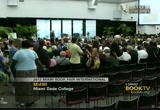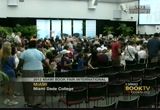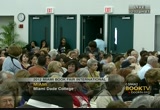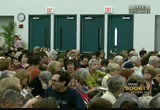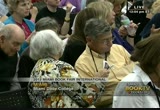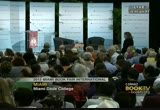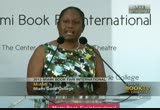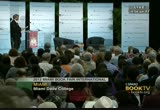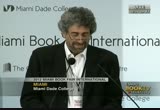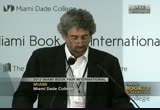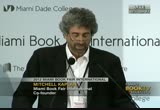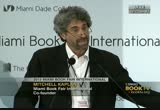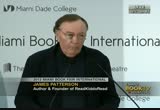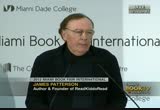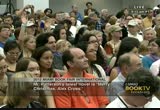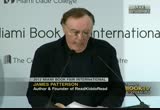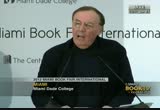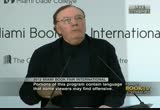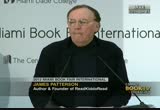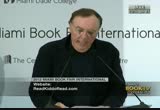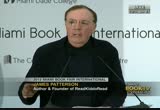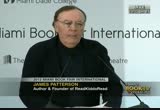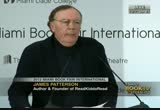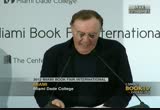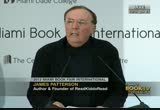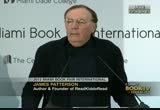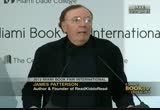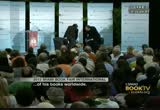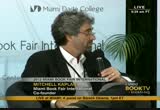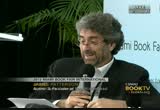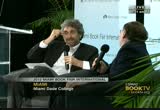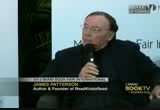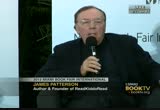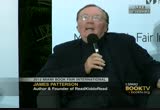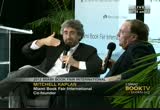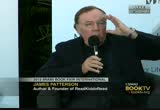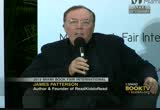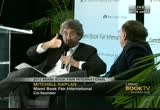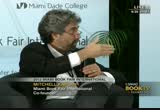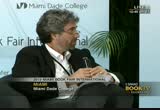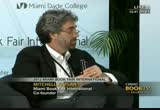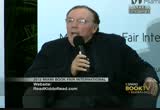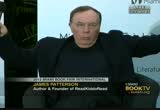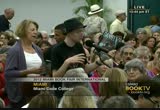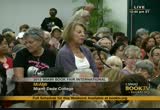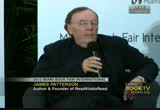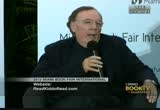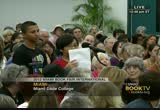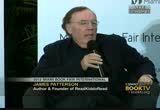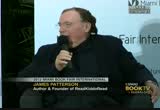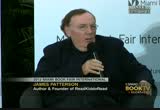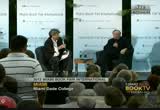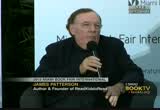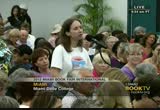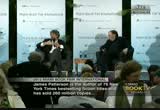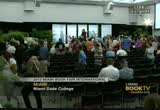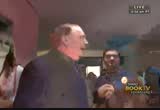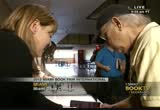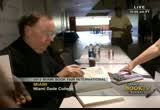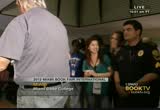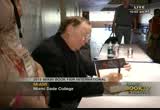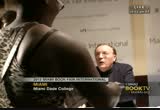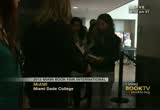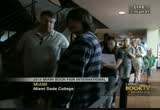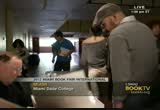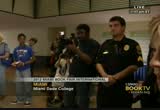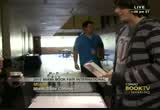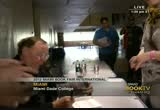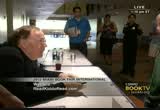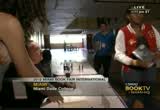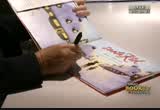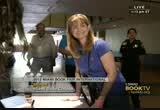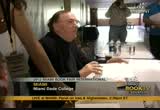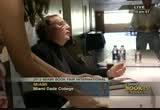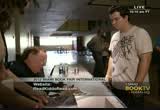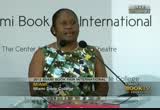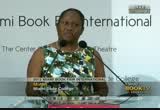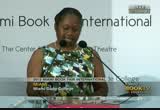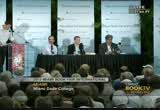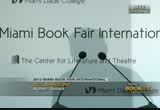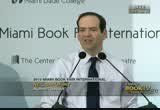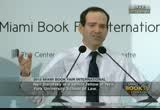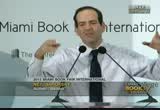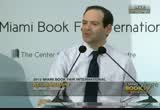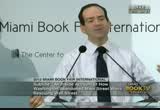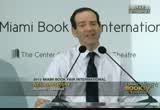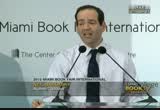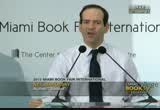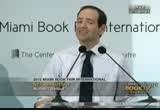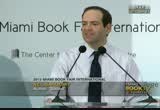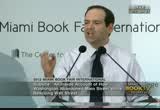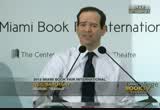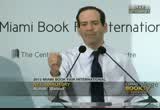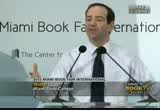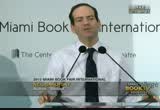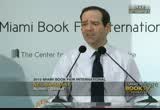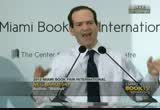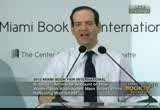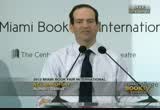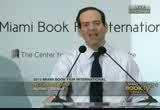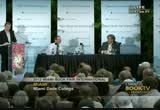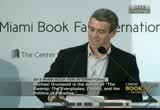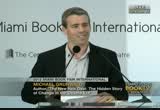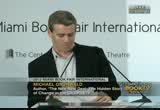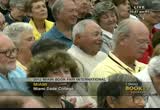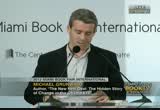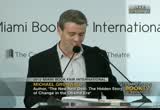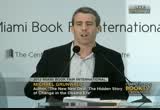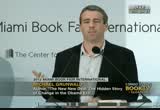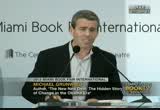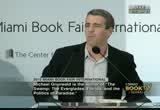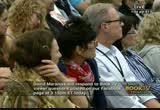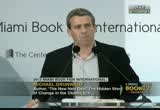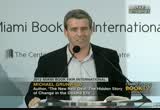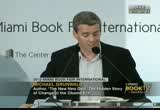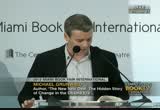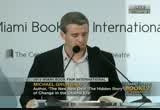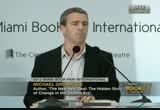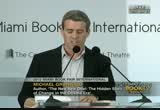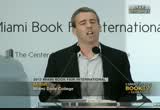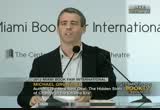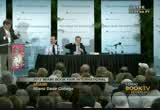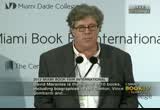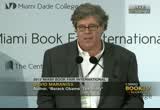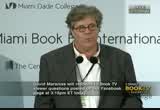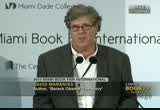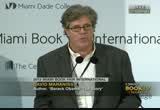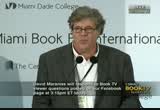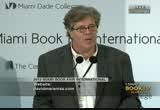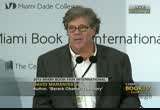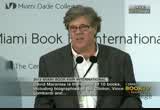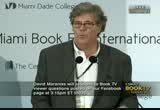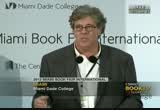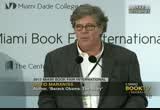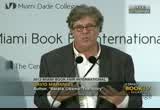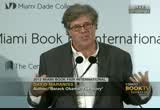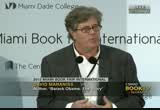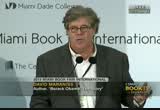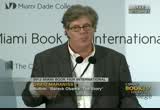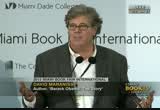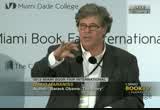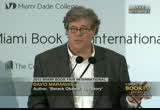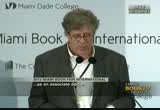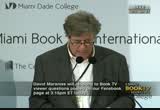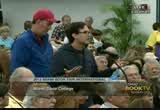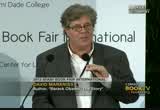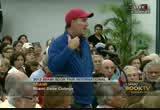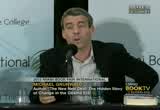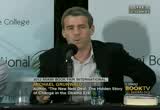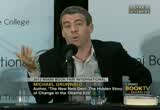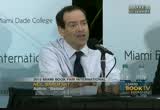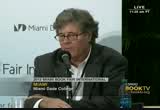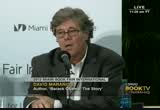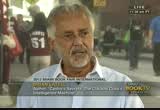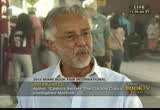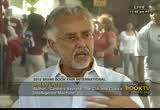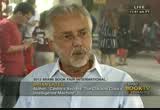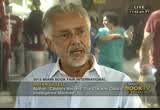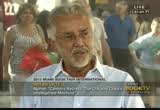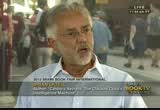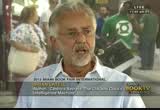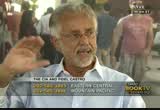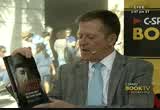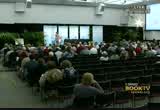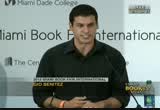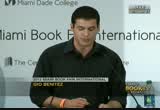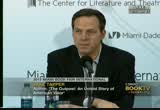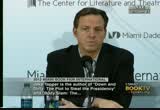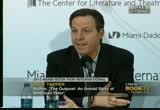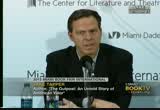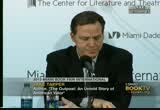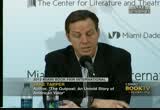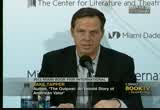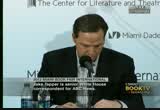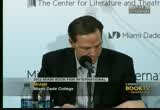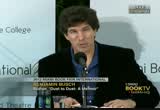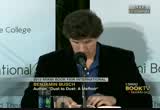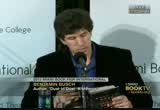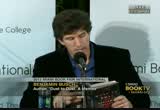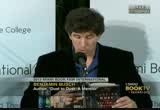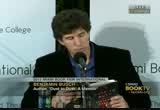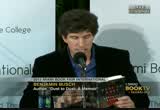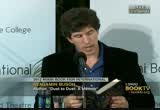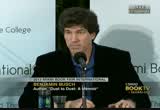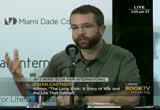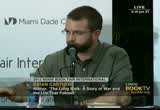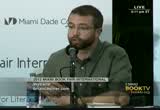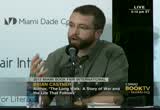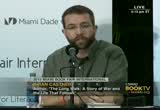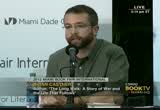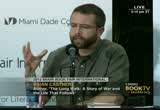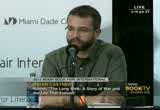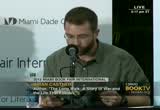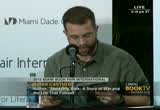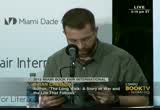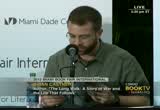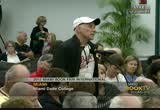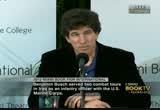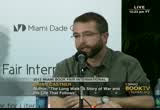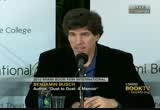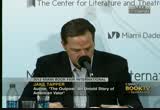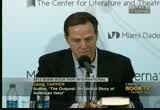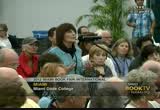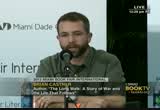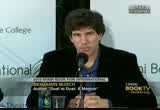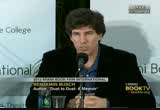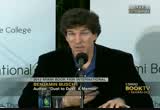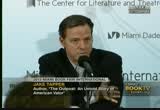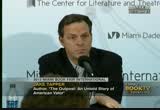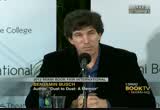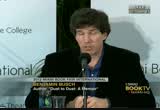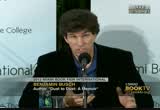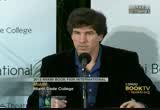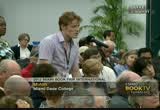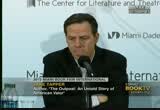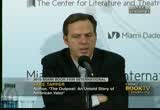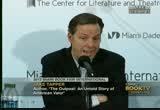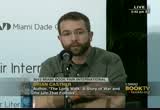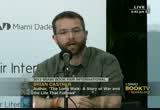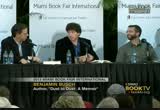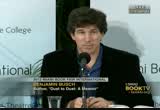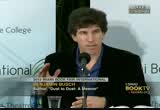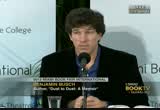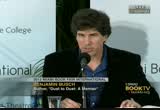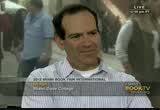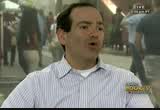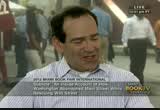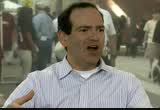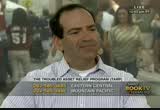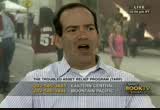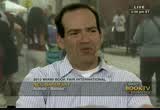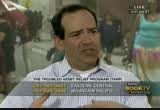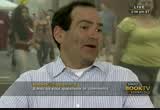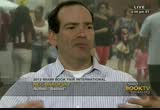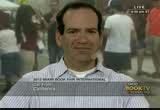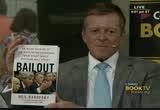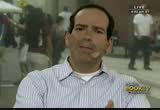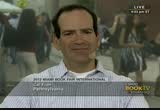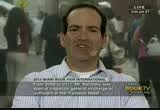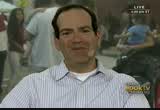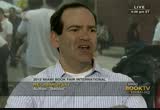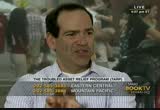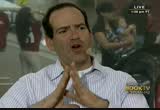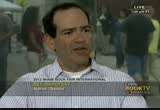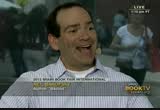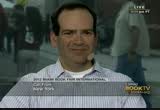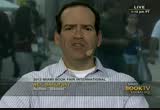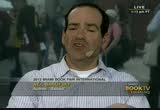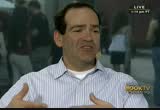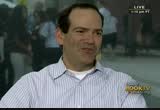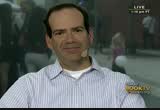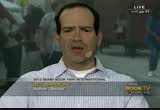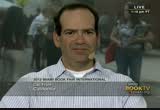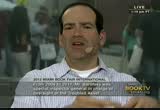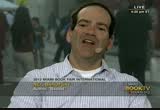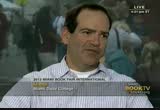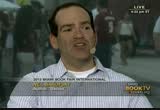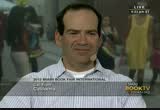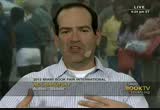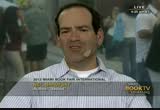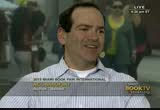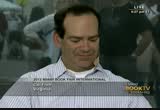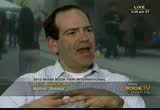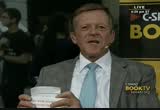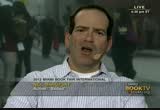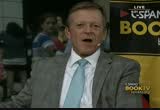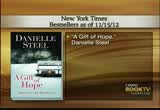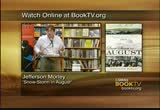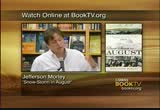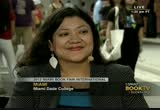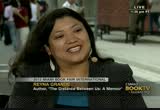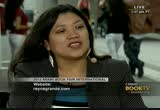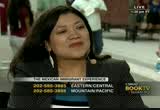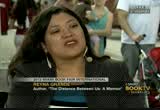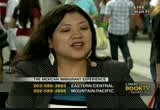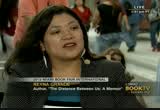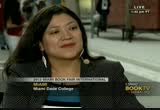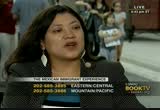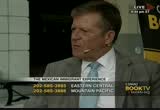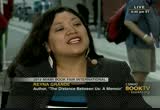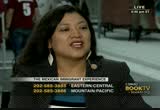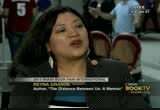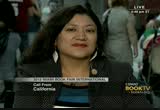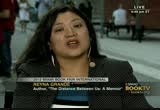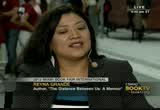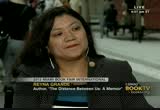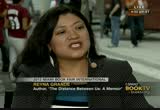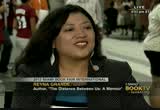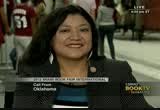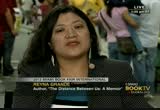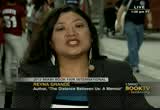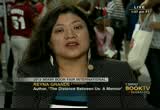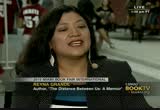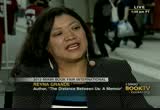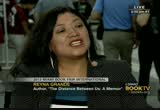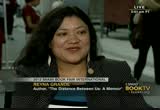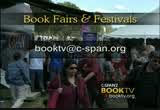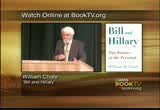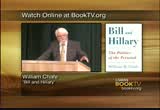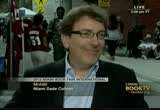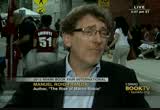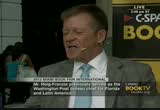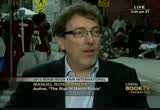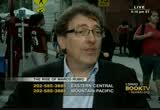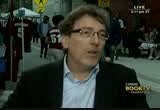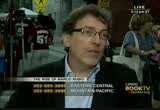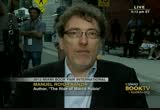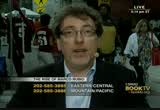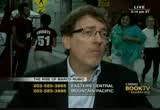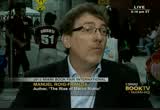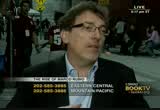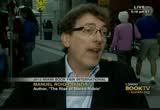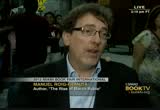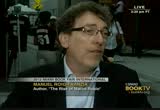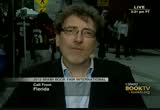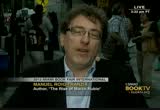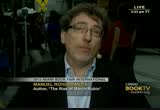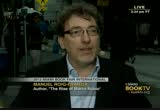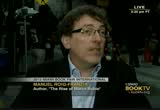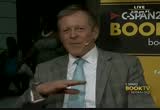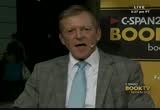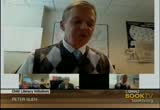tv Book TV CSPAN November 18, 2012 12:00pm-5:30pm EST
12:00 pm
12:01 pm
12:02 pm
12:03 pm
[inaudible conversations] [inaudible conversations] >> and as you can see come of the room filling up at chop and hall at miami dade college and were just waiting for mr. patterson to get started. this is live coverage running just a few minutes late. again, a reminder you can follow us on facebook and facebook.com/booktv and we have
12:04 pm
12:05 pm
12:06 pm
[inaudible conversations] >> good afternoon. please take your seats. we are about to begin the session. thank you so much. i am marilou harrison and many of you have heard from me because he been in this room yesterday and today. i served as a volunteer here, a very proud: tiered of miami book fair international candidate to recognize is that done before, all of the volunteers come to thousands of volunteers for miami dade college as well as the community who come together reach you to think this book fair take place.
12:07 pm
i'd also like to recognize those who are friends of miami book fair international and you are here. i won't make you wait this time. but you know we thank you for your support and being a part of our special group at the book fair. our sponsors, stephen listed in your fairgoers side. minislump there's including american airlines, target and florida blew them are very grateful to them as well. we have a very special new program for you. i hope you will stay with for the tire afternoon, but of course they are our many author sessions throughout this fair that you should partake in, as time and enjoy. your cell phones if you'd please turn those off as a standard as you all know so we have no
12:08 pm
interruption in the author will be autographing books as always in the green area to the right of the elevator. to introduce our author today, i'm sure you will all be delighted to have the individual who is a founder of miami book fair in your national. let me see if you can guess who this individual is as they move along. one of the founders of miami book fair international, the owner of books and books. i think i gave it away right there. and certainly someone in this community who has propelled the move went of book selling them publishing and all that encompasses literary work. please look on mr. mitchell castle to the podium.
12:09 pm
[applause] >> thank you, mary lou. thank you all for making this a remarkable week we've had so far. hard to believe that it's sunday and we have more going on, but in this very, very special event, which is very special to me personally. it's james patterson who got my kiss her preschool and are now getting them through college to be frank. you'll understand why in a minute. "time" magazine has failed james patterson is the man who can't miss. of the new york magazine times on its cover proclaimed him as having had transformed publishing and here's why. he holds the guinness record for the most number one "new york times" bestsellers of any author ever. in 2011 it was estimated that one in four of all hardcover suspense thriller novels sold with the bad mr. patterson.
12:10 pm
selling over 300 billion copies of his books worldwide, that's 300 million copies. he's also the the first other to achieve 5 million e-book sales and by now has probably hit in william as we sit in this room. what is impressive about all of this though is that the successes and based solely on a similar site the ever popular alice crossed in the women's murder club at michael bennet series. he's also the current best-selling author and and a young adult and middle grade categories. it's not just about his success either. he's won the coveted edgar award, the bca mystery guild ruler of the year award from an internist thriller of the year award from the reader's digest readers choice award and the children's choice but councils children's choice award. i got through that.
12:11 pm
it has been said of james patterson and his work, no writer has ever created so many lasting tiered there's poor grasp the interlocking power of thought and emotion. he pours forth stories that engross, and mays and move readers. at the same time they plumb the emotions we all live with, the power of love, family, friendship, the pressure of work, the inevitability of death, the meaning of good in the presence of evil. it's immortal stuff wrapped in side the highest level of entertainment. i couldn't agree more and as a bookseller and struck by how easy it would be for james patterson to sit back and rest on his laurels. instead he garners the gratitude and respect from all of us who love the literary life and care deeply about how we can develop the next generation of readers with his prodigious work over the past decade in championing
12:12 pm
books and reading. from the james patterson paige turner ward to his website read kiddo read.com to his scholarships and regular donations of hundreds of thousands of books to troops overseas has passed on his passion for books and reading that supports those who do the same. and away the hilt essay for cnn.com he presented a call to action imploring parents to become active participants in changing the reading habits of their two. and on a personal note, when we received the news that james utterson will be with us at the miami book fair this year, i was more than thrilled when i was also not surprised that his primary reason for coming was not to close books, but instead wanted to make celebrating the notion of family reading and that's what were going to do this morning. mr. patterson is going to come
12:13 pm
out, say some words and then we'll sit down and engage in a bit of a conversation. but that will also take questions from the audience, so how those wheels turning in a can of questions you might have to answer. if you're young, don't be intimidated. , not because i know he does to your questions from youtube. so please give a really, really warm, warm miami and miami book fair welcome to mr. james patterson. [applause] >> hi, i'm stephen king. [laughter] i was walking in here and this lady said new book much taller in your book jacket photos. [laughter] my boy jack came home from prep
12:14 pm
school yesterday, that thrill for me. it was devastating when he went away. where have you been my blue-eyed son? what i want to talk about today something close to my heart, which is the power of stories in the way stories can affect the world, the way stories can change things for the better. in just the power of what can happen. a writer friend of mine was walking on burke avenue in new york city and he passed a blind man who was assigned the good please help me i'm blind. my friend is kind of walked by them and, but then he stopped and he saw this guy only had a couple coins in his hat was so he dropped in a couple of quarters and then he asked the man permission to just change the story a little bit for this guy, which he did and later in the afternoon he came back and
12:15 pm
pass the guy again and the hut was full of coins of those and he stopped and talked to the guy in a blind man admitted have never had a day quite like this. you have to tell me what she wrote. how did you change my story? and my friend said i just added a couple of words and error please help me i'm blind and it's spring. it just change the whole story for the guy. we all have a story. maybe a couple stories people use to describe those. our families have a story about who we are to them and usually are often they involve a nickname we don't particularly care for. my father used to call me skippy. i have no idea why to this day. do we have many kids here? kids? a few.
12:16 pm
names we are known by in school and our jobs and sometimes just a couple of lines. these stories can either push us forward or hold us back. i think for a while miami has some stories that help i am a bank and no miami has stories moving it forward. even our self-images, our personas are just stories that we tell about ourselves for that other hotel about us. about a year ago i met the actor and director tyler perry. tyler a couple years ago bought delta airlines headquarters in atlanta and needed to some its tv shows and movies. one of the amazing things about tyler and his story is a 1998 tyler was homeless and tyler perry searcy changed his story.
12:17 pm
i have kind of an unusual story myself. i was born in a small river town on the hudson, newburgh new york. when i was growing up, look magazine called it the all-american city and at that time we had kind of an inner-city, but then we had a lot of harm kids and there was an air force base of the schools will follow the inner-city and harm can and kids who'd been around the world. it was an interesting place to grow up. earlier on my father grew up in the newburgh poorhouse. it was called the poggi. my father's mother was a charwoman at the poorhouse come which meant she cleaned the bathrooms or the other poor people and they got a room there. so that was our background and that's why feel i should be the next president of the united states. [laughter]
12:18 pm
[applause] anyway, i've been poor and have been middle-class and then i was poor again and then i was middle-class again and now i'm kind of bridge. [laughter] i must admit to riches better. but i still believe that the satisfaction in our lives revolves more around who we are at the core. i think it's mostly we get comfortable in her own skin. for some it never happens unfortunately. and the best-selling author of the world. i have sold 300,000 -- 300 million books, but i'm not terribly impressed with that. i had a birthday party a few years ago and one of my best friends with all the way back to grammar school and they said come you know, you're still the same hassle you always were and i like that. i like that. i would've preferred that said
12:19 pm
you revolves to become a little bit more dolt, but to me the important thing is emcees husbands and jack's dad wherever he went. and everyday i try to do the best i can and some days it even works. here's a story about working for a living, about balancing our working families, which is something most of us are always trying to do. and in the story, once again you imagine life as a game in which are juggling five in the air and you call them work, family, health, friends and charity and somehow you keep them all in the air, which is a struggle as you all know. and maybe at some point you understand and realize the work is a rubber ball and if you drop it, believe it or not, will
12:20 pm
actually bounce back. but the other four, family, health, friends, charity are made of glass in the future of one of them, they are going to be scuffed or marked or next or maybe even shattered and will just never be the same again and you'll never get them back. once we get that image in our heads for that idea or concept and are hence we strive for balance in their lives they think. i certainly try to do that. nowadays most of the stories i read her fiction might especially enjoy writing books for kids. my publisher thinks my kids books are the best that i rate. a couple years ago as mitch was singing -- he is a great voice, disney? i was nominated for author of the year at the children's choice book award and at that
12:21 pm
point jock was 12 and they said don't get me wrong, dad. i really like your books, but rick riordan is going to win. so jack and i and my wife went to the awards and i want and jack jumped out of his chair and then they went up on stage and told the story about how jack thought rick riordan was going to win. but then i held up the award and said this is for you, jack. i knew he would always have that memory for the rest of his life according to new york with his dad and mom and his dad say this award is for you. so those are very cool moment for all of us. jack is a born storyteller. at four he wrote and illustrated his first novel called death of the butterfly catcher and in his story, the butterfly catcher gets on a plane, travels halfway around the world, doesn't catch a butterfly. then he gets on a boat and travels the rest of the world,
12:22 pm
still is a catch a butterfly. and then he gets on a train. jack loves trains. catches a butterfly. the train stops to make it the train and not really looking from the gets hit by a train going the other way. death of the butterfly catcher, butterfly flies away. so is god it. beginning, and, title, will ball of? i love to write. i'm very passionate about it. but the main reason i write books for kids and i have a bunch of serious about some kids who fly and hopefully universal is going to make a movie. they have a script a great producer. who knows. write them a letter. that's universal studios -- tell them what a great amusement park ride it will be. who would want to go on not? and middle-school, the worst years of my life, if you have kids or grandkids or nieces and
12:23 pm
whatever, it's a really good series for kids i say may be seven to 13 or so. it's funny and they're illustrated and i'm really proud of those books. this december of another book of middle-school age called unfunny. it's also illustrated in it's about a kid who decides he wants to be a standup comedian so he memorizes every joke in the history mankind and studies every comedian and it's a pretty fun book. the reason i write books for kids is as individuals coming in no come as individuals we can solve the health care crisis and we cannot solve global we are dean or whatever's going on, but we can get our kids reading. we can do that. and i try to write books that kids will love and that are also good for kids that there's
12:24 pm
always something going on in my book but hopefully the kids turn a little something in their brains on. it's important that parents get into their heads and i think i have been in my head now. it's not the school's job to go and find books for your kids. it's not the school's job. [applause] it's your job, it's my job. it's our job to find books for kids. your kids don't need another cell phone with her first cell phone. they need books. they really need books. [applause] the nice thing is books are free at the library. how cool is that? and books are available at stores like books and books in coral gables. is that where this? and they are available online. you should go to the bookstore.
12:25 pm
and i have to say. i don't sell books but i have a site called reid could have read this a good place to go. there's hundreds of books on there and they are of age categories and their only books that will turn your kids on, not to drugs, to reading. parents come up all the time and say i can't get my kids reading. and i say, with all due respect, and you get them to the dinner table? you have to make it as a rule your house. we read in our house. we read in our house. that's the coolest thing because if your kids can't read well, if they can't read well, high school is going to be a lot tougher than it needs to be. whatever, science, history will all be harder. maybe you get to nap without reading and maybe not. if your kids can't read well,
12:26 pm
some of them will not get through high school. if your kids can't read well, choices and opportunities in life will be limited. they're not going to have as many choices. but the cool thing about looks, the great and terrific thing is there's so many really good books out there for them to read. there's a lot of books that will absolutely blow the minds of your kid. you know, harry potter, terrific series. when the kids come and terrific illustrations. books about sports, fine. if you have boys, let them read anything. , looks, great, graphic novels, almanacs, cut books, share, why not. as long as they are reading because to get better at it. i'll go to schools and say who play soccer? who love soccer? the outcome of the.
12:27 pm
you better know? would play a lot. same with reading. he read more, get better at it. it gets easier. you read better books. you have something that you love. so i though the will to get that in your hands that notion we read in our house. it's really cool that your kids see you reading. that's nice, but the most important thing that got to have books in their bedroom. i got to read the darn things. when jack was a, sue and i that's number -- the holidays are another good time, the three, four weeks they have. but they said you can read everyday. he said do i have to? assembly, unless you want to sleep in the garage. but we are going to find cool books for you. so we went out with us and percy jackson series, read: time.
12:28 pm
at the end of the summer, jack was a bright guy, but was not a big reader and a good-looking kid -- his mother must be very, very pretty. but by the end of the summer, he had read a dozen books. about nine of them he liked a lot in his reading skills have gone to remove. so he went from eight yourself or he didn't like to read two when he took his sats, which they take, he got 800 reading, which is the highest score you can get. so that's what can happen. it's unimportant whether they get 800 or harvard or vanderbilt , the support they get through high school and they have options when they get out. so yeah, mitch, where are you? , now, we're going to shoot the breeze and awesome question. what happened with that movie, et cetera, et cetera. [applause]
12:29 pm
>> so i think you can also why we have a master storyteller a mischievous measure in the story that he tells. i think we need to create on this throughout the country. we read in our house. i think that is one of the most brilliant taglines that i've heard in a long, long time. don't you agree? i think we should begin that as quickly as we can. and i read that cnn.calm piece that she wrote and i was really inspired by it as a bookseller because their missions are very similar to create the next generation of readers. you gave some tips to some parents, but is there a way to oil them down to three import things they can remember? we read in our house could be
12:30 pm
12:31 pm
>> i think you can hold them through 11 and 12. that's when it gets tricky with boys. at least if they read well, there's hope. they may pick it up later. they may get distracted. some don't, but a lot do. the key thing is they develop the ability to read pretty well. >> i also know through your work on this whole reading initiative that you have -- i know there's teachers out there as well, and that you have -- >> it's not the schools. >> exactly. [laughter] i know there's programs within the schools you acknowledged as being some that are really quite great. there happens to be -- i happened to see her walking in -- my 4th grade teacher is here, mrs. kay, now mrs. harris. when i was in school, they did
12:32 pm
something, and it dawned op me they don't do it anymore. when i was in elementary school, they had the library patrol. i had a button, and i was on patrol. talk about other programs. >> one of the programs i love is drop everything and read where for one period every day or several days a week, the whom school just reads. everybody just -- the teachers including is a great one. the schools in washington, very successful about turning around inner city kids, and the kids in that school have to carry a book at all times. it's neat. funny you mention that. i did a reading at my home town, and my 2nd grade teacher was there. she's like 92 years old. i was signing books, and she said, james, your handwriting is
12:33 pm
still atrocious. [laughter] >> that's great. talk a little bit about where you see our culture going. you're doing -- >> oh, my god. >> i don't mean in general, but in terms of reading. are we creating a culture of readers, notary -- non-readers, where are we now? >> i think the worst thing that's happening is we're creating a culture where people don't listen. they don't listen to the other side. there's a quote -- i read an editorial in the "new york times" a couple weeks ago, and it had to do with morality's ability to behind -- bind and blind, and, you know, it binds people, you believe in, you know, you believe in whatever you believe in, abortion one way or the other or whatever you believe about entitlements or whatever you believe about global warming,
12:34 pm
but you're incapable of seeing the other side at all, that there might be any validity outside. you take that into congress, and if both sides just sit there, they won't bend or see the other side's point of view, nothing happens. the anger that comes out of that, i mean, a lot of people are just running around so angry because they just have to -- well, this is what i think. this is -- there's no other way other than my way. >> it's funny, i think reading, particularly reading about other people's lives -- >> absolutely. >> creating tolerance as well. >> absolutely, absolutely. that's the great thing about books right now more than any other medium that we have. a television -- a television's getting better, interestingly, movies, i mean, it's a lot of the same, same, same hollywood, you know, cops are bad, mobsters are good, whatever.
12:35 pm
it's kind of crazy, but books are the one place where there's such a variety -- as you say, you can see other points of view. other ways of looking at the world. you know, what's really going on, i mean, there's a terrific book about afghanistan called "the forever war," and you read that book, and you get it. you get it or at least you get a really good point of view of what's going on over there. >> yeah, no, i couldn't agree with you more. i also think that what is happening in terms of getting that selection, it's about, you know, most people don't realize there's hundreds of thousands of books printed each year, and you need guides in order to fund those books, and i'm curious to know what you think is and how the world of the library and the bookstore, how that plays into
12:36 pm
that, and how it's evolving. >> clearly, it's evolving -- there's going to be many more people reading on to be lets or whatever. that's a done deal. it happened. i think the really horrifying thing right now is it's happened so fast and nobody has taken responsibility for how do we make that transition in a sensible way? how do we continue to get the kind of advice that we can get in bookstores, in libraries, how do we keep that alive? i'm doing an essay right now which has to do with who is going to save our books, who will save our libraries, our bookstores, who is going to be responsible for finding the authors who have created the great american books of the last hundred years or so and in this thing, it lists about 50 books.
12:37 pm
the light goes off in our heads, right, who is going to do that? is amazon going to do that? seriously, who is doing that? same thing with the internet. i mean, who -- if we chase all of the magazines and networks out of journalism ultimately, right now, a lot of these blogs and whatever, they are just picking stuff out of the news stories. who pays for the journalists, who pays for the reporters? how does that happen? how do we get information? nobody's sort of taken that to the next level, the issues there. >> any answers that you might have thought about? >> i think a piece of it is i think the people at the head of this thing have to take responsibility. amazon, they really need to get in and take more responsibility for what happens to books in this country, and i think it would be nice -- i'd love to see
12:38 pm
the president, first lady, whatever -- i like that the first lady is out there, you know, reminding us that it's good to exercise and not overeat, which is a huge issue, but i'd like to see, you know, more in washington, who is protecting books? i mean, in europe, they do protect books. they protect bookstores and they protect libraries, and they protect books. that's good. in germany in particular, netherlands, scandinavia. they really protect it because they know, you know, that's a basis of the culture and civilization. i don't know that that's happening here, and i'm not sure what's going to happen. i don't know that it's going to happen in this state. it could. it could. >> well, thank you for raising that. in france right now, they are actually giving grants to endangered book shops in order to keep going because they realize that the culture is transferred through books.
12:39 pm
>> the interesting thing here is it doesn't even come up. >> right. >> it just doesn't come up in discussion which is nuts. you know, i did a book with lisa markland, a popular writer from sweden, and i went over there, and for three days in stockholm, we did 50 interviews with newspapers and magazines. you write a book here, you can't find a journalist here. is there a journalist here? okay, god bless you two. [laughter] interesting difference in the cultures. in sweden, 8 million people, her books sell over a million copies in a country with 8 million people. >> wow. amazing. >> well, along those lines, tell us about -- some of you in miami know there was a thing called world book night. mr. patterson is the co-chairperson with ann of the 2013 world book night. want to talk a little bit about
12:40 pm
that? >> yeah. this, as far as i know, started in england, and it's very effective in england bought the government got involved in addition to the book sellers, and it really got well-organized to the point where basically every kid in the country get money to go in and buy a book, and the bookstores sort of, you know, price them in a nice way. this won't be as big yet, but i think we're giving away a half a million books. >> right. >> it's a start, and you know, once again, we just -- what we really need more than anything else is for the government to wake up or the various governments whether it's going to be handled at -- whether you're states person or a federal person, it's got to be dealt with somewhere, and education same thing. i mean, we're not figuring it out right for some reason. >> let me ask you on a personal note, were you a strong reader as a kid?
12:41 pm
>> i was a strong reader, a very good student, but i was not a big reader. >> when did that -- >> i grew up on comic books. >> did you? >> yeah. >> when did the book thing start? >> the book thing, really -- and i was a good student, but the book thing really happened by accident. i was -- i worked my way through school at a mental hospital outside of cambridge, massachusetts, and i worked a lot of night shifts, and i read like crazy. it was serious stuff. at that point, i was not interested in commercial fiction, and i read everything i could get my hands on, and then i started scribbling, and i loved it. i just loved writing stories. >> and for the kids out here, i'm sure a lot of them are wondering, i'll try to ask the questions, and then we'll turn it over to the audience, but of all the characters, which one do you think you're most like?
12:42 pm
ray or max or alex cross? >> i think i'm most like alex. we're both african-american -- [laughter] no, i think there's a sense of family. it's so strong with him. he's very compassionate, and he's a problem solver. i mean, that's -- he's a character i identify with the most. >> and the movie thing? >> the movie thing? oh, look, you take your shots. i -- my feeling -- interesting thing about the movie is it got really clobbered by a lot of critics, but then they do, you know, polls on people who leave the theater, and it got an a. to give it perspective "cloud atlas" got a c, "flight" got an a-minus. my best friend called up, and he and his wife going to the movies, and said, you know, we
12:43 pm
really liked it, but i got to tell you, i read the review in the new york norksz, and i was afraid to go. >> right. >> if i was going to write a fair review, i would say it is -- it is a flawed movie that is sillier than it needed to be, but entertaining. >> we'd agree, not with the first part of it, but i found it entertaining. i'm sure some of you out there did too. here's another sort of question that i thought of. if you could live inside the world of one of your books for a week, which would you choose and how come? >> if i could be in it for a week, guaranteed i could come back, "maximum rise," flying around for a week, i'm there. i don't want the wings full time. the kids are retractable, they could be in the audience, and you wouldn't know it, and then
12:44 pm
all the sudden -- >> and what's your favorite part of being an author? what's the most amazing thing you've seen or done because you're a writer? >> oh, i don't know. somebody said you're lucky if you find something you like to do in life, it's true, it's not the easiest thing, and it's a miracle if somebody pays you to do it. are you going to retire? you don't retire from play, you know? it's -- i don't work for a living. play for a living. >> well, we're glad that you do. going to throw it open to questions. >> don't be a afraid, come up to the microphone. >> i want kids to come up too. >> we're going to bite, we're like twilight, yes. >> speak into the microphone as well. >> okay. so you made this graphic novel which is cool, and then you did just the regular novels.
12:45 pm
i really enjoyed it and everything, but my main question is are you going to do another daniel novel or any other graphic novel? is that in the plans or anything? >> i actually started with it as a book series, and the graphic novel came later. i don't know. you know, there's actually -- it's not a daniel x, but there's one that's just, i think it's in the stores now or close to it called zoo -- check it out if you're in the storement take a peek and see if you like it, but i think it's a cool graphic novel. >> okay, thank you. >> you're welcome. >> hi. >> hi. >> yesterday, we heard a gentleman by the name of michael sandell, and he spoke to us about what money can't buy, the moral value of markets, and he was giving us an example of four people in the country, offering
12:46 pm
the kids a dollar or two dollars to read a book, and then he asked the the audience how they felt about it, and it was about 50/50 that half of them felt it was a great idea; it was not a good idea at all. i wonder what you thought of the idea. have you read about it? >> i haven't, but i think creativity is what's needed to get kids reading. there's a woman i read about, a teacher in texas, and she has a bubba, a book club for boys, and they read gross books. they love it. they call themselves bubbas, and they make fun of themselves. >> she doesn't pay them? >> no, she doesn't. i hope that's the last thing you'd have to do, but, you know, i can't say i'm against it, but maybe there's more imaginative ways. >> okay. >> the key is not really that they read a book.
12:47 pm
the key is that they build a habit so that they continue to read stuff. it's just not enough to get them to read one book. >> thank you. >> i have two questions, actually. first one what inspired you to write "suzanne's diary"? >> what inspired me is my wife takes a gazillion pictures -- there's one -- and we have these books full of pictures of jack, you know, when he was a baby and whatever, and i was staring at it, and, you know, we were older parents, and it struck me that it would be -- it would be sad one day for jack to be, you know, reading or looking at this book of all the pictures, and we were not around anymore, and then for some reason, it hit me how devastating it would be if we were looking at the pictures, and he was not around, and that's where the book came
12:48 pm
around. >> also, too, i know i'm from west palm beach, and i know you've spoken at several at the schools. how do we get you? >> little ground. contact them. i am doing some middle school stuff up in west palm beach now, jfk, and, yeah. >> actually, one of my students at school met you at jfk, she's in the school i work in now. i work in a library. >> okay, all right. one of the things -- a school of the arts there, i saw their holiday concert one year, it was mind boggling, the music, and we're actually going to do it at the crowder center this year. we paid to have it in there. that's going to be spectacular. >> yes, ma'am, yes, sir, somebody. yep? hi. >> is the book middle school --
12:49 pm
>> [inaudible] [laughter] >> bring the microphone down. >> a wimpy kids t-shirt on. >> why -- [inaudible] >> i'm not going -- let's not get into this because this is hard to imagine or believe, but not everybody in the room has actually read the book yet. [laughter] i don't want to give away stuff. are you going to be around at the book signing? >> yeah. >> okay. we'll talk about it privately. >> okay. [laughter] >> also -- also -- >> don't give away what happens in the book. okay. >> i'll have to strangle you. [laughter] not really. >> also, when did you first write your first book, and what was it? >> i wrote the first book -- i published it when i was 26, about ten years ago --
12:50 pm
[laughter] it was called the thomas number -- i was very lucky. it was turned down by 31 publishers, and then is won an edgar for best mystery. come see my privately, that's two -- >> also -- >> okay. are you telling the ending again? we'll talk you and me, me and you. >> i think we have a journalist, like a white house correspondent. >> all right. [applause] >> i'm asking the question for my girlfriend who is very shy. >> okay. >> what she'd like to know what is the process of getting like a story she's written to be published, what would it be like? >> it's. so long since i went through that, i don't really have -- there are books in the library,
12:51 pm
like, -- >> getting published, there's a book called "getting published" -- >> cleverly titled. that's a place to start. i tell you one thing is the second part of it is you finish the story or book, start another one. start another one. just keep doing them. you get better and better and belter, and pick up a book like "getting published," and they tell you where to send stories. i don't know what she wrote, but, okay p. >> huge fan, huge fan. >> you're not that big. [laughter] >> my question is what advice do you give to an apyring writer that's a huge fan of your books and also loves to write? >> don't write like me. [laughter] you know, write, write, write, write every day if you can. get into that habit. if you love it, you will find it's not that hard to do it, even if you just write a page.
12:52 pm
you write a page a day, at the end of the day, there's 365 pages -- i'm george bush -- [laughter] write, write, write. read, read, read, try not to imitate somebody else's style. develop your own style and voice. >> okay. you're welcome. >> hi, big fan, big reader. bear with me. i get nervous. for the series -- i love the characters, you gave us a little of a -- i remember in the last book, you gave us a little -- [inaudible] a little insight -- [inaudible] >> it's find. it may seem goofy, but the sound is okay.
12:53 pm
>> insight on the one who is the one, and i'm wondering if you're going to let us in on the whole history of him because, well, i'm a little curious about him. it's a little darth vader moment. >> did you hear it? >> yeah, as we continue, we'll get more on that. how many of you read that series? a few, okay. not how many -- >> how many of you read the series? as you read more you'll get more. >> all right, thank you. >> okay, thank you. >> hi. >> hi. >> i was wondering, i read "where the wind blows," and i wondered where you got the idea? >> i'm not sure exactly. you know, the whole idea of flying to me is a wonderful fantasy. you know, lifting off, whatever
12:54 pm
it is so i've always had that fantasy, and i remember actually going to a southeast book association -- book sellers association, and they had it somewhere in the swamps, and i think it was in georgia. there were all these marshlands, and i saw birds there, and i was thinking how cool it would be able to fly over the marchlands, and, you know, from there, i just wanted to write flying scenes, and then that fantasy of being able to fly. i think that's what started it. i just wanted to write a book about flying. >> okay, thank you very much. >> you're welcome. >> hello, i'm actually very grateful to be with both of you, a fan of both. >> me too. >> yes, i live in palm beach county, and i miss having books and books nearby and the event. i hope there's a location out there soon, and i have many of your books, mr. patterson, on
12:55 pm
the book shelf, but i'm here on behalf of south books florida, where a board for the national county of the national course, and we just got started in may and have a lot of wonderful events planned for early 2013, and would love to see if there's any way we can get your support. >> i've been giving to that forever, we give a hundred thousand books to first book, great involvement. >> great, thank you. >> yeah, yeah. >> well, do we have one more? i see one more little one coming right up to the microphone. >> actually, we've cut off the line already -- >> one more -- >> there were many in front of her. >> she's so smart, she figured it out. [laughter] >> i don't know how this thing works so okay. i really liked the witch and wiz
12:56 pm
a-rod series and read the books and graphic novels, dupe if there's another graive novel. >> yeah, the graphic novel, it will continue through the end of the series, and there's going to be another witch and ward aired in i think february called "the kiss." >> well, jim, i want to tell you this was a charming morning. i couldn't think of a better way to spend it. thank you so much. [applause] i also want to tell all of the kids out there if you've got one of those buttons that was given to you, if any of you walked in with a button that says "james patterson is the best writer around," who's got one? i see -- i see a few of you standing up. you will be getting a gift so during right afterwards, come up to the stage, and each one of you who got one of those will be getting some sort of a gift donated by mr. patterson.
12:57 pm
we want to thank him for that. thank him for coming. let's give him a big round of applause for his appearance. [applause] we have the book signing happening out that way, and because there's so many people, we're really asking for your forebearance in not asking for something to be permized. -- personalized. we really appreciate that. [inaudible conversations] about 260 million james patterson books are in print right now, and he will be signing some of those books for his fans here at the miami book fair international. we're going to show that to you live. we've got a crew up there with him, mr. patterson has a microphone on signing some of the books, and we're going to bring that to you here in just a minute as soon as here's off the stage. mitch caplin with stores here,
12:58 pm
books and books it's called, the co-founder of the miami book fair now in the 29th year. today is the last week. we kicked it off live here with tom wolff, and we will be live all day today. in just a minute, we'll follow mr. patterson as he goes to sign for his fans. i want to let you know if just a few minutes, the next author panel is starting. three authors, "barack obama: the story," his book, first half of the two volume biography of the president. "the new deal: hidden story of change in the obama era," and the t.a.r.p. administrator writing an inside account of the experience called "bailout" so right now, that's beginning in a few minutes, but right now, we'll watch mr. patterson live here in miami. [inaudible conversations] >> hey, up there, yeah, yeah,
12:59 pm
1:00 pm
1:01 pm
>> thank you so much. >> this is probably worth a little money. hi, how are you? >> nice to meet you. >> nice to meet you. [inaudible conversations] from the miami area? >> no, i drove down here from clearwater. >> wow happen how long is drive is that? >> about five hours. >> really? wow. what's your name? >> don't put my name on it, it's for my boys' for christmas. >> well, they got x's and o's. don't give it to a guy. >> don't worry, that's not a consideration. >> you could have a brother or a cousin. >> thank you. >> nice to see you. >> oh, hey, how are you? >> doing great.
1:02 pm
>> thank you, thank you. okay. >> last time i saw you was 2009 in washington. >> in washington? >> yeah. you were great in washington. >> have i lost it? >> no. >> oh, all right. >> thank you for doing this, yow, yeah, yeah. start a bookstore in palm beach. there's somebody i want to put out of business there. >> step right up. how are you? good. i'm amazed at how many copies of this i see.
1:03 pm
1:04 pm
you're welcome. how are you? have you read them? >> [inaudible] >> okay. >> thank you. >> you're welcome. hi, how are you? good. >> thank you. >> nice to meet you. hi, how are you? >> good, thank you. >> thank you. >> you're welcome. hello. >> hello, how are you? >> i'm good. how are you? >> thank you, i loved your talk. >> oh, thanks, awesome. >> hi. >> hi, how are you? >> thank you. >> thanks for coming by. >> take care. >> okay. hi, how are you? >> well, yourself?
1:05 pm
>> pretty good. this one's in good shape too. >> not bad. >> can i have a date on that as well? >> sure. >> thank you. >> i have no idea what it is. >> the 18th. >> thanks. >> you're welcome. >> hello, how are you? >> how are you? thank you so much. >> you're welcome. thank you. >> thank you, thank you. >> are you satisfied with the ultimate of book fairs -- [inaudible] >> with the book? >> everything you've written so far, are you satisfied with all
1:06 pm
your work? >> there's some i like better than others. sometimes you do, and you're like, well, that didn't work out. you know, you have plots and things, and, you know -- you don't know if you write it whether it's going to -- the pieces are # going to work as well as and fitting together as well as you hoped. now this one i thought worked out great. >> the ending disappointed me, i'm sorry. >> okay, all right. who knows, maybe max, you never know. >> thank you. >> hi, how are you? >> i'm well, thanks, how are you? >> i'm good. >> you know, i wanted it for my father and one is for my brother. they take turns reading your books out loud when we were kids. >> oh, really? where do they live? >> jacksonville. >> where? >> jacksonville. i'll pass them along, thank you.
1:07 pm
>> you're welcome. hi, how are you? >> thank you. >> you're very welcome. >> hi there, how are you? >> good. >> honor to meet you. >> well, it's an honor to meet you. >> thank you very much. >> you're welcome. hi, how are you? >> what the heck? is that your sister? yeah kind of. >> that's very cool. are you happy about the election, i think, huh? that's good. nice to meet you. how are you? thank you. >> thank you. >> okay, you're welcome. thank you.
1:08 pm
>> [inaudible] >> holding up the book? >> okay. here i am, holing the book. do i know how to hold a book or what? >> thank you. >> you're welcome. >> do you bring your own photographers? >> yes. thank you for coming. >> you're welcome, thank you. step right up. how are you? good. where are you from? >> ohio. >> ohio? really in where abouts? >> toledo. >> uh-huh, i've been there.
1:09 pm
i like ohio. however, my wife, in wisconsin, the ohio state buckeyes beat my wife's little badgers. nice to meet you. >> nice to meet you. >> thank you so much. >> you're welcome, you're welcome. hi, how are you? where are you from? miami? good, good. nice to see you. you brought your own photographer? hi, how are you? >> good. i love your books, and [inaudible] -- >> which one? >> [inaudible] >> oh, okay, okay, okay. sad one. >> i love it. >> hello, how are you? >> good, how are you? >> pretty good.
1:10 pm
from miami? where? >> [inaudible] >> okay. >> [inaudible] >> okay. thank you. >> you know, they should be ready for middle school in awhile. >> thank you. >> you're welcome. >> you're welcome, thank you. >> one of the raffle winners here. >> step right up. you wop the raffle? you won the raffle? >> i did? >> i guess so, yeah. >> he was reading in line, and they gave him a pin. >> what's your name? >> [inaudible] >> >> what is it?
1:11 pm
>> dylan. >> d-y-l-a-n. >> okay. well -- [inaudible conversations] >> okay, see you guys, thank you very much. you're welcome. >> hi, how are you? >> how are you? >> good. >> [inaudible] >> pardon me? >> [inaudible] >> oh, really? uh-huh. well, who knows. who knows what the future will bring. who knows. nice to meet you. >> hi. >> hi, how are you? >> good. >> thank you. nice to meet you.
1:12 pm
>> hi, how are you? >> good. >> i got my daughter reading your books, favorite author. >> look, she's reading, that's good, any author. how are you? >> good. >> thank you for coming by, nice to meet you. how are you? >> good. >> to write love -- >> to write love on her arms. >> oh, okay. thank you. >> you're welcome. >> thank you. >> hi, there, how are you? what grade you in? >> [inaudible] >> which? 7th? okay, good. are you ready to be out of middle school? probably. okay, what am i doing? >> joshua, sign this, autograph this.
1:13 pm
you're welcome. hi, there, how are you? >> [inaudible] >> how do you spell that? >> j-a-y. >> thank you. >> you're welcome. hi there, how are you? what grade you in? third? cool, nice to meet you. hey, how are you? >> how are you doing? >> good. pretty good. thank you for coming by. >> all right, are you a guilty wife? >> i'm a non-guilty life. >> okay, that's better. >> thank you. >> thank you. thank you, hi, how are you?
1:14 pm
so you brought your own photographer? excellent. >> [inaudible] >> nice to see you. thank you. is this yours? yeah, yeah. how are you? >> nice to meet me. >> [inaudible] >> uh-huh, do you get back there to see her much? >> yes, i do. i will tell her. she will be envious. >> where does she live in jamaica? >> [inaudible] >> oh, yeah, i've been there. i like jamaica. how are you? >> i'm good. >> what's your name? >> michael. >> michael? >> yes. >> okay.
1:15 pm
that other one i mentioned is zoo. >> okay. >> this could work. this will wok. got it? >> there we go. >> perfect. nice to meet you, michael. >> okay, crazy white girl. how are you? >> thank you so much. >> you're welcome. >> i got my hour of fame here. how are you? >> good. nice to meet you. >> thank you very much.
1:16 pm
appreciate it. >> thank you. hey, how are you? >> good. >> what grade are you? >> what? >> what grade you in. >> 5th. >> do you like it okay? >> i love it. >> oh, terrific. >> so sorry. is your name peter? >> uh-huh. >> okay. classic. okay. you're welcome. >> hi, how are you? okay. >> you've been watching author james patterson sign books for his many fans in miami. read, kiddo, read, is the initiative he talked about here at the miami book fair.
1:17 pm
up next in chap mapp -- chapman hall, going live where thee authors wrote about the obama administration. the two volume biography on the president "barack obama: the story," "the new new deal: hid p story of change in the obama era," and finally, "bailout. inside account how washington abandoned main street while rescuing wall street." those three authors on the next panel. the room is filling up, getting the last seated, about to be introduced. a quick note. david marines will be exclusively on our facebook page a little later this afternoon so if you hear him talk about and you want to make a comment or ask him a question, go to facebook.com/booktv, posted there on the top, make a comment, ask a question, and he will be responding to that a little later this afternoon.
1:18 pm
now, the other note is neil will be joining us later on the booktv set here in miami for a call-in opportunity. two of the authors you'll see later. facebook or on calls so we're going to take you to the panel now on the obama administration. this is live coverage of the miami book fair on booktv on c-span2. [inaudible conversations] >> as they take of their own personal time to give of themselves throughout this fair to make it what it is. thank you to the volunteers. [applause] our appreciation also to the sponsors because without funding and that kind of support, this kind of event would never happen. to the magnitude that it does, and this year, we have florida
1:19 pm
blue again, american airlines, target, and many, many more sponsors. to the sponsors, we thank you, and we look forward to you being permanent sponsors of the book fair. our friends are here, and this is a very special group. the friends of miami book fair international, some of you have been with us for many, many, many years, and we're truly grateful to have you as friends and for your support. those who joined us recently as friends, welcome, and we hope that you will be with us for many more years to come. next year, as many as you know, is our 30th anniversary of the book fair so -- [applause] yes, let's clap for that. [applause] and miami daid college is truly very, very proud to be able to bring that to the community for the enrichment of all ages, for
1:20 pm
people of all walks of life, and it's -- you can attest, i'm preaching to the choir, and absolutely spectacular enriching event. there will be questions and answers, q&a period after our distinguished panel of authors speaks today. i would ask that you approach the microphone in the middle, that you pose your question, and then, please, take your seat needily after. i know that you're very eager to engage with the authors, but we need to keep the q&a going. also, if you would turn off all of your digital electronic devices at this time, and our program will then begin. one more node, autographing, you can get your books autographed outside in the green autographing area, to the right of the elevators for those of you who may not know. so to introduce our panel of authors, today, we have josh
1:21 pm
benson, and many of you know josh. he's from cbs 4, and he's our morning anchor from cbs 4, josh benson, bleez, welcome -- please, welcome him. [applause] >> good afternoon, what a day for a great discussion, a great pam today, and welcome to the 29th year of the miami book fair international. i'm the new kid on the block. i just movedded here a few months ago. if you raised your hand and just joining us, what an event, i'm with you on that. it's a very popular event, and today tees no exception. we have a great panel joining us today. i want to introduce them. we have a short amount of time today with three great authors so we'll get started. david is joining us today to talk about his book "barack obama: the story" following up the first two gentleman, michael here as well joining us, going to be speaking on "the new new
1:22 pm
deal: hidden story of change in the obama administration,ed" leadoff speaker is "bailout: how washington abandoned main street while rescuing wall street," give a big round of applause, and cbs 4 has been here for years, and great to have these guys joining us today. take it away, thank you so much. [applause] >> thank you so much, and thank you, everyone, for coming out, and thank you for my co-panelists, an unbelievable thrill that's hard to put into words. here we are after days after the most recent presidential election, and it's hard to believe that it was really four years ago as we were -- at least i was celebrating the first lexes of then senator barack obama as president of the united states of america, and, you know, as a country, it was a remarkable time. it was a different election. in the midst of a financial crisis, a crisis -- i forgot my
1:23 pm
clock, otherwise i would go on for 45 minutes. [laughter] a financial crisis that really started here in the united states, but brought almost the entire global economy to its knees, and in the course of that election, and with president obama taking oches, we really -- office, we really, as a country, were at a cross roads where to go next with the system that was a broken status quo. go back as a country to the stable financial regulation, boring banking after the last major financial crisis, the great depression, boring, but effective, decade upon decade of financial stability that had orerred in remarkable era of growth for the country. unfortunately, broken down piece by piece leading up to the financial crisis. would we double down on the system? take those banks that were so large and so interconnected and so politically powerful that our
1:24 pm
leaderships decided that any one of which, if it were to fail, would bring down the entire economy and had to be rescued? allow them to be 25% larger than they were before the crisis? pass down watered down regulatory reform cementing their status as too big to fail? preserve incentives and perversions of a normal capitalist market that accompanied them putting us on the path that's a significant and dangerous financial crisis than the one we just experienced? unfortunately, i believe we chose that latter path, but four years ago, we didn't know that, and i remember going into that election watching what was happening all around me with the sense of detached horror. horror because i understood what was going on in the financial crisis because of my perch as a federal prosecutor and assistant united states attorney in the southern district of new york. i spent years doing security fraud cases, prosecuting big
1:25 pm
wall street firms, and then earlier in 2008, i formed with the founder of a mortgage fraud group tackling mortgage fraud that aticketted to the crisis. from that point, i had a sense of what was going on. i had seen under this financial innovation, which we were told by wall street and by the regulators in washington and new york was this seemingly magical thing ensuring huge profits and fees for the wall street banks that took mortgages and turned them into complex financial instruments, not only giving them fees, but expand home ownership, and as we told by the regulators, reduce risk in the system making everything safer, of course, until it didn't. i saw this regulation, create a mania, a need, a tiers -- thirst for emergencies, more and more mortgages, people were financial instruments to feed the machine. when they ran out of normal mortgages, they had to expand to
1:26 pm
the financial products people didn't understand, basic underwriting standards, what a bank should do to ensure a borrower can repay loans was thrown out the window. it didn't matter if you could repay it as long as they had mortgages to feed into the machine. fraud, i saw, was something to be rooted out and destroyed from a banking system to something that was an inconvenience. at first ignoredded, later all but encouraged, and in the recent cases, concealed by the unwitting investor. i saw how this was tremendously profitable, except for the victims on both sides. the unwitting homeowner signing a mortgage they didn't understand, never had a chance to be able to pay off on the one end, and the investor relying on promises of the wall street bank and their enablers, the credit rating agencies thinking they were buying something safe as the united states government debt before it all exploded. i had a sense of horror, but my horror was detached because it
1:27 pm
didn't impact me. i was a renter, not a homeowner. declining housing prices was not affecting me. i had a job with the united states government, the safest job imaginable. as a fraud prosecutor, financial crisises are good for business. [laughter] for me, it was detached, but that all changed for me in october of 2008 when i got a call from my boss, u.s. attorney, mike garcia. he called me in the office, and i have the oh, my god, it's the principal's office feeling in the pit of the stomach. he handed me a printout, special inspector general, it was a piece of the legislation that congress passed authorizing treasury to borrow $700 billion to rescue wall street, bail out the banks, put us on a path supposedly to economic recovery. this piece i was not aware of was when they passed the law, congress created a brand new agency. when mike explained to me what
1:28 pm
was the agency was going to do, two functions, one a law enforcement agency, a fbi for the t.a.r.p. with guns, badges, special agents, knocking down doors, executing search warrants, taking criminals out of their homes, putting them in cuffs, and in jail. congress realized pushing out so much money it was inevitably going to draw criminal flies to the government honey, and they needed a law enforcement agency to protect the money. second was oversight to bring transparency giving reports to congress and to the american people what was going on in the bailouts. to help guide treasury who is in charge of implementing the program to make sure the policy goals would be implemented. as mike is telling me about this, i had no idea why he was telling me until he said he was going to recommend me to the white house for this job. i was not interested in going to washington, i really had no interest in going back, and i
1:29 pm
started picking through the reasons to mike, getting rare my -- married in january, just started the mortgage fraud group, a big trial working years on to try coming up, and mike knocked my objections down one by one until i rolled out what i thought would be the big gun. i said, you know, mike, you described it as a job that requires the nomination of the president george w. bush. you know, mike, i'm a registered democrat. he winced, he let it hang in the air. i said, and last week, i contributed to senator obama's campaign. [laughter] now, i thought i was off the hook for sure, but i was not. mike told me, no, no, this is an appointment, nothing to do with politics, rolling the eyes thinking about the ferries and unicorns giving a obama contributing democrat a high profile nomination from george w. bush, he said it was not my choice, but duty and obligation
1:30 pm
to take the job. he talked about how the office, which was steps away from the world trade center, and reminded me as a young prosecutor how we responded to the 9/11 attacks, and he explained it was the economic equivalent of 9/11 and taxpayers spent money training me in the previous eight-plus years for the job, and it was my job to step up and try to protect that money. ..
1:31 pm
the treasury had it covered any what they were doing and i would help them protect it from fraud. i soon realized that a strong commitment is going to have to change my focus significantly is a relisten asserted interact with treasury officials just have captured the scene to be by the magic of wall street, how deferential they worked for the largest banks interest over that of main street. the other people were helped by this bailout. when i suggested the first couple of days, but do something crazy like actually have the banks make them tell us what they're doing with our hundreds of billions of our money, i wasn't just told no. i was told that i was playing politics, that i didn't understand the sick things.
1:32 pm
i said i can't wait to do this myself, i was told if they did so i would destroy the tar program and with it the entire bankrupting it turned encrypts the system. this curse that by timothy geithner when i suggested he should do the same for daring to suggest he was anything other than this country's history. >> is funny when i get cheered for getting cursed at. as i was doing my job without any complex adventures for the beings would make money leslie on the taxpayer backs, i wasn't necessarily told i was wrong. i was told my concern was misplaced. we didn't need to worry about it they said that they factor to
1:33 pm
untrue figurative pat on the box. he would not never risk over that of the public policy purpose of this program. and i really want to stress this is not just the bush people, this exact same mantra came after the election by the obama gave her treasury official. the exact same word cleaning to this greenspan notion the reputation of risk is that we need. i remember thinking to myself, where have these guys been the last couple years? how could they a map of the things who put profit over everything. in particular, the reputation. then i realized where they had been. merrill lynch. bear stearns, bank of america, goldman sachs, goldman sachs, goldman sachs. everywhere you look to someone from goldman sachs. i realize they brought the wall street ideology within to government and one of the reasons why we saw this
1:34 pm
incredibly deferential ballot on such general terms to the very institutions that it brought down our economy and i realized my focus is going to have to be on more than just law-enforcement art has to be an advocate for the taxpayer to protect this program not just in the bank at the treasury officials who seem to be in different with the advantages they were giving to banks over everyone else. they think over the course of years we had a mixed success. we did a good job of limiting losses to fraud. as a law-enforcement agency was locked up for a criminal charges against more than a hundred individuals were trying to criminally profit off of t.a.r.p. which provides see how behind bars for 30 years for stealing half a billion dollars in funds. a recommendation notwithstanding the pushback to help protect and limit exposure to fraud. where we failed is where t.a.r.p. failed and widely t.a.r.p. is a field program is getting treasury to prioritize
1:35 pm
goals. the recent t.a.r.p. was enacted to help not just to banks, but main street. the best example is the housing program i think. now quick history lesson. you may remember when the t.a.r.p. bill got passed it didn't get through the first time in four republican administration, they need democrats. a group of progressive democrats in the house in order to get votes to pass the t.a.r.p. will. not surprisingly they were terribly interested in voting for a bailout of the institution that caused the crisis and was having such a devastating impact in their communities and districts. what they cared about was the foreclosure crisis, which was destroying their community. they said basically okay will vote for bank bailout, bishop on how to prioritize helping homeowners. they put language in the bill say preserving homeownership and put provisions in the bill that would require treasury about the foreclosure crisis.
1:36 pm
that promise was left unfulfilled. this is $75 billion that would help up to 4 million people stay in their homes at the program is a failure. 22% has been met in the program has been ground to a halt in part as it was designed, filled with conflicts of interest and they actually because of some of the incentive structure, because treasury relied on the banks himself to carry the program, it often is more profitable for a bank to string out a homeowner can squeeze out the last remaining life savings in for them on the foreclosure scrappy and modify the mortgages to stay in their homes. it's one of the reasons why the program has spent a little more -- about $4 billion to maliki to american express as to the program has helped to
1:37 pm
$4 million in one of the reasons the bill is passed. this was frustrating as you can imagine and part of our job was to make these programs effective. really became clear when we had an oversight meeting with secretary geithner in the 2009 and i was there and now senator elect elizabeth warren and others say not over and over again, senator elect. [cheers and applause] at the time she was head of the congressional oversight panel and she was grueling geithner among the homeownership program in how they could possibly meet these goals. she got under his skin will lead only she could really get under his skin yet he snapped at her hentai by the estimate banks can handle 10 million foreclosures over a period of time without any uppity about that meant for families. anything more than not could
1:38 pm
render them insolvent, which means they have to come back for another round of bailouts. this program would help from the runway for the banks. it is about extending the foreclosure crisis for the benefit of the bank, not the 4 billion homeowners and why we haven't seen the banks because every other aspect of the big l. out it's not about main street at about the banks. that's one of the reasons i consider turkey failure in the restore funding and kickstarting the economy in waste of the banking system as it was promised to end and the other part of the mentioned before in my opening comment preserve a broken status of financial system that advantages the very elite financial institutions
1:39 pm
with the rest of the country and we are on a path as a result of a more dangerous and damaging devastating financial crisis. i do have to offer a solution. i can't just sit down there. so let me offer two areas i talk about this and the afterword of the book. i think we need to break up the bank, smashed the shine of financial institutions. [applause] write your senator. wanted to rip out the incredible power that comes with institutions in the economic power of a lutheran. we need to do with the regulatory site as well should should treasure shows that dealt with not just there but profusion to please wall street. what is the one anecdote that i opened the book with that captures a lot of the problems we have is a country and our regulatory system.
1:40 pm
in 2010, april 2010 i had a terrible relationship with her counterpart at treasury. he was an assistant secretary, presidential appointee and herb allison and how they retired and the patriotic act to come out of retirement in order to serve under the obama administration and to run our program. but we didn't get along well and our weekly meetings had a ball shouting matches. i once got yelled at because i use clips of tim geithner in a powerpoint. it wasn't really making fun of him. as making fun of banks. but he told me how outrageous this wasn't how the secretary himself as upset when he heard about this from which i learned among other things not only does straightener curse like a sailor, but he has a sense of humor. but we decided we would meet offline, have a drink on this terrible washington restaurant to clear the air a little bit.
1:41 pm
this sort of had our chitchat and i talked about how her daughter was about to be born in a couple weeks and he talked about his kids and the conversation sort of turn and he asked me what i wanted to do next, what my plans were after this temporary job i had. he said maybe a shop on the street, wall street comes something like that. i said i wasn't really sure. he said it was doing myself real harm. he explained to me that my tone of criticism of wall street as well as the obama administration was going to harm my ability to get a job after its disposition. i explained that i wasn't terribly concerned about a job to do any press. he said what about something in the administration. maybe a federal judgeship, appointment by the obama administration. said i would love that. but lawyer would not want to be
1:42 pm
a federal judge? i don't think they're going to do that. inserted me the thought of not friends at this point. they said it is not to be that way. you have to do is be more. the more positive in what you do and then these things can happen. i was really angry. i was mad. i called a deputy at the same as i walked in and what happened if you said to me, you just got the bullet of the bribe. for both narcotics prosecutor mrs. preprocess pablo escobar had used. he would go through the official projections they basically here's your two choices. you can have this giant bag of pesos and do my bidding or you can get a bullet in your head if you want to do your job for your supposed to. so my deputy said he just received the white-collar washington equivalent of the bullet of the bribe and i believe that at the time. over the course of the year
1:43 pm
relates that was not what was happening. he was not threatening to promise me anything. he was telling me the way it was a someone who'd been to wall street to washington that was the reality for regulators to paste on wall street. they could go on and get along, have a good upbeat tone and spin through that revolving door and get the huge pot of gold at the end of the wall street rainbow or they could be aggressive and get their job and get themselves real harm. so ultimately, any solution that have to do with both of those things. either way, i know this sounds negative and our depressing, but idc areas for hope when i see elizabeth warren get elected to the united states senate. if the reforms of the consumer protection bureau and i think there is a path for us to follow, but we'll have to be committed to make sure we go down that path. thank you so much a non-handed over trademark he panelists. [applause]
1:44 pm
>> hey, thanks. that was great. it's a real thrill to be here with neil. wish i got applause for getting cursed at. i would've had a much more enjoyable career in journalism. it's a particular thrill to be here with david. i spent nine years at the "washington post" described it to the public policy of south beach. i have to say at the post, for those of us who are young starting their, they're receptive woodward people and of america's people. the woodworth with the one who wanted to grow up and write the stories that brought down a president in america's people were the people who wanted to write stories that were little more interesting than that. i was definitely a maraniss
1:45 pm
person. after the latest round of books and even more of a maraniss person. but it really is an honor to be here with david because he best. the sub title of my book is the hidden story change in the obama era and it is a book about change. let me talk a little bit about obama, his day and really his vision of change. you know, directory interesting questions that you could about obama as an author and one of them is is this obama guy for real? now we see him this kind of node, obama, the cerebral overload or pressure, comfortable in his skin sort of aloof, comically reasonable alpha male. but then there's this other literature out there where he's
1:46 pm
this kind of insane right wing socialist -- left wing socialist in the right-wing literature. and even in the mainstream is often this bumbling cant do anything right guy whenever the economy is bad in his approval ratings are bad. they sort of spoiler alert is that in my book obama is the same guy you read about. he's the sort of left of center technocrat, pragmatic data oriented, biracial with some slack i guess. i don't want to undersell. i do tell us and find obama stories. in october 2000 after lehman brothers collapsed in the mccain campaign was imploding
1:47 pm
along with it, obama with one of his advisers. are we sure it's too late to him his have this pile of to mccain in the party that created it? the adviser said yeah, it's probably too late. obama does well, at least whereby in love. [laughter] not low enough as it turned out. in december when his economic aid, kristi roemer called in with the first jobs report she couldn't resist. she said i'm so sorry, mr. president-elect. the numbers are just horrible. he says it's not your fault yet. and another time a little later in the ministration, david axelrod was in the oval office and says i wonder what it would be like governing good times. obama just laughed. are you kidding? in good times we never would've got the job.
1:48 pm
[laughter] but he kind of is what he is and it sort of what he presents it to be. i guess question or two about obama would eat if he is assertive saying, grounded, sort of left of center, but not letting the enemy of the good guy, but kind of knows who he is and goes about trying to do the right thing. how did he get this way? if you read his autobiography, he was this tortured soul, alienated, obsessed with questions of identity. and the answer to that question is i don't know, every maraniss spoke. i don't pretend to come up with new psychological. the man that is why god invented david to do the digging about
1:49 pm
how this alienated guy ended up subnormal. i'm certainly interested in question number three, which is what did he do? is this unusual notion that the way to understand obama and his policies and his successes and his strange inability to market his successes just sort of look at what happened and where the money went. so the book i use, you may now use the stimulus is a microcosm of the era and it has become this incredible joke in washington. i don't think i could've written this book i still think they are. it's $800 worth of levitating trains in honeybee insurance in just the idea of taking it seriously shows that you just
1:50 pm
don't get it, kind of nodded in the washington narrative. i remember trying to pitch my editor to "time" magazine the story about how the stimulus was more than meets the eye. i don't know if you just watch the newsroom hbi, but i felt like i was a blogger trying to pitch the story like bigfoot is real. it turns out in addition to financial earthquake at helping obama took office, but the economic tsunami hadn't really reach the shore. gdp was crashing an 8.9% annual rate. at that rate we would've lost the entire economy of america in 2009. release of 800,000 jobs a month and we had 2.5 to 3 million job
1:51 pm
solution to an 8 million problem. but again, adding 150,000 to 200,000 jobs a month is a lot better than losing 800 it does turn out if you look at the studies that have been done, this recovery are to prevent a depression and into recession as the quarter after it passed turned out to be the biggest improvement jobs numbers in 30 years. sort of part of the story. but it was known as the american recovery and reinvestment act. what i found most interesting in addition to jumpstarting short-term recovery was at the stimulus really did begin this long-term reinvestment. it was by far the largest energy bill in the history of the country. we been spending a few billion dollars a year. the stimulus port and
1:52 pm
90 billion, just a complete game changer for wind, solar and other renewables, energy efficiency and every imaginable form. [applause] i got for saying he thinks. for this marker, electric vehicles, biofuels, clean energy research and the technologies of tomorrow and factories to build the stuff in the united states. not just energy, but the stimulus is going to drag our antiquated health care system into the digital era so that your doctor might not kill you at this chicken scratch handwriting by 2015 just about every american will have an electronic medical record, which really should improve care and reduce costs and is really a down payment on health care reform. this included the most ambitious education reform in decades with race to the top of the largest infrastructure investment since
1:53 pm
eisenhower. it had the largest research investment other, the largest middle-class tax cut since reagan went to more than 95% of the country in less than 10% of the country noticed it. with great politics. so again my book i did try to get deep into the bowels of the white house in the backroom of capitol hill, but also tried to be a fly on the wall and the energy energy departments weatherization division. it's actually known as the turkey farm. i went to local high-speed rail meetings in the central valley where i actually saw obama called a. i did spend some time in the way to fancy cylinder factory, to. but really my novel approach to evaluating the president was to try to figure out what he's doing. and others oiler alert, but the
1:54 pm
most important thing you should know about obama if he tried to do what he said he would do. he came into office with this unusually well-defined theory of the case and is try to put that theory into practice. his campaign agenda into daphne didn't attract a lot of attention and partly because the media was obsessed with his race unfunny ads comparing him to paris hilton. the partly because it was mostly the standard democratic agenda of reversing the bush era and investing in the future. obama cares a lot about policy, but it's not really a policy entrepreneur in the original campaign wasn't really about new ideas. it's about that that message of change and then this aspirational, we can believe in addendum, the same but maybe this guy would follow through on the old ideas that never seem to go anywhere. and he really has.
1:55 pm
i was on a panel in boston before the election with a guy named charlie baker who is a republican. he ran for governor in 2010 and got hasted by duval patrick here to see republican who lost that year. but he had read my book and he said his take away was to stuff, whether you're on the right or the left and i do think that is an implicit message of this book. i get asked all the time at events like this, how did obama screwed the politics about? how come people think the stimulus created jobs think that elvis is alive, which is actually true. it was first of all say that this black guy whose middle name is hussein and got himself elected of the united states probably didn't become a political on january 20, 2009,
1:56 pm
but he did this unbelievably unpopular stimulus. then he didn't even more on popular auto bailout. he didn't even more unpopular health care reform. meanwhile he's doing his controversial things in iraq, doing stuff in and, getting us into libya, and making statements about marriage. there's financial reform, gets involved in cap-and-trade and everybody's analyzing the politics of it. meanwhile you have four years of 8% unemployment in it turns on a 50/50 nation his approval ratings are 50% and he got himself a lack of a second time from which i do try to remind people, do stuff. politicians spend so much time agonizing over political ramifications of everything from which is understandable and
1:57 pm
excellent agonizing story about how politics and tax cuts got screwed up so badly were rahm emanuel is running out samite are presenting everybody check? with this ethnic man moment, the wheel of leisure when you open your check from barack. i do quote some of them talking about how that was. the fact is he really was focused on trying to get this stuff done he said he was going to do. i'm going to read just a little bit from the book. i know a lot of people expect me to talk about obama versus republicans especially now because i do describe the republican conspiracy to destroy obama before he even took office. but i'm going to talk a little bit about obama versus hillary from 2008 because i actually think it helps explain the last four years. the case for obama was not a sensitive case for changing
1:58 pm
policies. hillary was making a similar case of the better resume. the case for obama was a political case for why those policies never seem to change. but implied hillary was part of the problem that america couldn't afford another decade of clinton wars, that the political pettiness and nastiness that exploded during the clinton era was the fundamental obstacle of the fundamental change. hillary's one-word explanation for persistence of the status quo was republicans. obama says washington, the endless spin cycle and pool during platitudes they make tough choices and common sense impossible. hillary was inextricably linked to the washington gridlock machine. the bickering and parsing, the eternal boomer driven rededication of the 60s. the case for hillary wishing you how to fight republicans, but she was comfortable in the muck.
1:59 pm
a case for obama was he good with politics beyond the muck. but obama's ideas about changing politics was always a means to the end of changing policies. in springfield, he listed the four main problems he was running to solve. a dependence on oil that threatens our future. a health care crisis. schools were too many children are learning and families struggling patient to paycheck despite working as hard as they can. he argued real solutions would be impossible until washington the young minorities and the rage. this is obama speaking. what stopped us are meeting challenges is not the absence of sound policies and sensible plan. but stop this is the failure of leadership, the smallness of our politics, the ease with which were distracted by the petty and trivial. our chronic avoidance of tough decisions. our preference for scoring cheap political points instead of rolling up our sleeves and
2:00 pm
2:01 pm
to the -- excuse me -- to the disillusioned attics of the left, and i apologize to those in the room, but it proved that obama was just about like every other politician, more interestedded in cutting deals and chasing dreams. to the feverish right, it revealed obama as a eurosocialist radical, and republicans never explained how the 715 million tax cut in spending stimulus that even paul ryan supported was good public policy while obama's $787 billion tax and spending stimulus was freedom crushing statism and death of the american free enterprise, but, you know, that's the beauty of being in the minority. in reality, the stimulus was really early evidence thatc'ñ oa was pretty much what he said he was, a data oriented left the center technicrat, a change the
2:02 pm
system outsider, govern to work the system insider. the first evidence that despite the flowery talk, he understood that bills that don't pass congress don't produce change. the stimulus is producing change. the wrap on obama was that he was a words guy, but he's more of a deeds guy. you know, it's not producing perfection, but making things better and better is better than worse. before the stimulus, 20% of the doctors used the lek tropical records. it'll reduce cost, improving care. it directed 7 million americans out of poverty reducing poverty for another 32 million americans who are already poor. a homelessness prevention program that kept 1.2 million people off the streets. the homeless population actually declined in 2009, half of them
2:03 pm
ended up homeless, the population would have doubled. in a program called build america bonds, financed $180 billion worth of local infrastructure projects. it was like a stimulus tucked inside of the stimulus. it launched a clean energy revolution that i talk about a lot in the stimulus, in the book, it doubled renewable power, created a domestic battery industry for electric vehicles almost entirely from scratch, jump started the smart grid, and reduced dependence on foreign oil since theñhr lowest level since 1995. you just hear about the solnydra scandal, which is not a scandal, but solar installations increased a thousand percent since 2009. look, i'm going to wrap up. we all want to hear david. obviously, the economy is still struck --
2:04 pm
struggling, and it's fair to point out the obama and the recovery act have not lived up to the initial hype. nothing in life expect parenthood lives up to the hype. [laughter] the, you know, the question that we just settled in november is are you belter off than four years ago? i think, you know, exiered to the economy falling off a cliff and losing 800,000 jobs a month and dependent on fossil fuels and renewable energy being a rounding error, and having, you know, two doctors unable to look at the same file without being in the same room, i think we're a little bit better off. with that, i'll give it over to david. [applause] >> if you want to understand the
2:05 pm
obama first four years, i don't think you can do better than to read the two books by michael and neil, two brilliant guysñjro base writing on facts and sharp analytics. i'm happy to be here with him. i love this mother of all book festivals, delighted to be back here again. everybody who runs it does a terrific job, and it's always reinvigorating for any author to come to miami and see so many thousands of people who love books. barack obama is any tenth book, and every four years annapolis -- since 1986, i had the assignment at "the washington post" to figure out who might be president. i started that process with bill clinton, turning it into a book, and so there was an assumption
2:06 pm
when i wrote about barack obama in 2008, an assumption by my friends and colleagues that i would just immediately launch into the boying of barack obama, and i haveñhr to say it was onef the more disk decisions made in my career, and it had nothing to do with barack obama, but what i consider to be the increasingly toxic nature of superficial nature offed -- of modern american politics. i was not sure i wanted to spend three or four years trying to get the true story and throw that into the swath of this culture knowing that there would be people who could try to manipulate any fact and turn it for their political purposes, which, to some extent, is what happened early on until i refused to let it happen more. in any cation, on election night in 2008, i decided i had to do
2:07 pm
the book, and the story, itself, is what was drawing me into it in a way that transcended any of my concerns about the political culture. this book is really driven by two of my obsessions. the first is the creation of barack obama, such an utterly random person. of course, everyone in the room, every human being is a random creation. for barack obama, it was that much more improbable. it was an opportunity not just to write about that, but about the modern world through the stories of the families that led to his creation coming from keep ya and kansas and taking me around the world on a journey of more than 45,000 miles to try to figure that out. the second obsession was given the contradictions under which he was born, a biracial kid in
2:08 pm
hawaii in 1961,ñ&r how did he do it? how did he figure himself out? how did he get to the place to be possible for him to be president of the united states? i hope the book starts to answer. it's really those obsessions that drove me through this book. i have sort of a man tray -- montra that i start every book with, and that's go there wherever there is. for the biographies, i said how would you like to move to green bay for the winter? [laughter] to which she responded brrr, but we did, and it made the difference. it was the sense the of -- sensibility of the place in writing does things that doesn't show up on the page, but sort of infuse the writing with a sense you capability get any other way. obviously, since that time in
2:09 pm
1996 when i uttered the words, i've been making it up to her ever since. how would you bike to move to puerto rico or rome to learn about the world in the 1960 olympics? this book, more than any other, took me around the world in a wonderful way, both of us. for the purposes of this discussion, i'm going to really focus mostly on the second half of the book, the obsession of how did he figure it out? how did he overcome the contradictions for life and make it? i don't know if there's any bitterers in the -- birthers in the room, but i'll start with the birth. [laughter] august 4, 1961, medical center in honolulu. for anyone not to believe that he was born there, then you have to accept this conspiracy theory that the honolulu papers were in on the conspiracies because they ran his birth announcement, that the immigration and
2:10 pm
naturalization service was in on the conspiracy because they were documenting the every step that barack obama, senior, his father, made. his father was a kenya student in hawaii on a student visa, and the ins did not like barack obama, senior, the father us because they thought he was a polygamist, which he was. he was marrieded in kenya and not divorced, and in the ways of 1959 america, the year he came, when there were laws in more than a third of the states of the united states, the ins did not look kindly on the fact that black kenya was dating white women in the united states. they were eager to kick him out. if he and his bride had gone back to kenya to have this baby, he never would have gotten back in. simple as that. the documents show everything that happened. the third aspect of the
2:11 pm
conspiracy involves his mother. she was named stanley ann dunham with the assumption named after her father, the president's grandfather, who at the time wanted to have a boy, and because he didn't, he imposed this name, stanley, on his daughter. the truth is different. the truth is the mother, stanley's mother, growing up in the small town of kansas and not wanting to be trapped by that small town kansas atmosphere would go to the local movie theater and watch the me -- movies, and in 1942 #, a few months before her daughter was born, a movie starring betty davis came to town playing a character, a woman, named stanley. in any case, back to 1961, the week of the birth of barack obama, our president, journalist
2:12 pm
in honolulu took out a prominent doctor said what interesting happened in your life this week? he paused and said, well, stanley had a baby. [laughter] not every week that stapply -- stanley had a baby. it was the talk of the doctors and nurses in the medical center. perhaps enough of the birthers, and that we will not heard from trump again. we can wish. [applause] think of the world into which barack obama was born, in hawaii. in one sense, perhaps, the most fer tiewtous state in the nation to be born, it was a multistate, half and half of all sorts, japanese, chinese, native hawaiians, anglos.
2:13 pm
his friend was chinese, it was that kind of place, but it was also a place without many african-americans. the only ones there were mostly associated with the military bases. barack obama, growing up, really, from the day he was born, of course, dealt with the difficulties of race in america because of the color of his skin, but culturally, social socialogically, he had to learn it, teach himself what it meant. at age six, before he got into consciousness about race, his mother fell in love with another foreign student, lolo sotero, and off they went to indonesia. only when i went to indonesia and walked the neighborhoods with these narrow alleyways,
2:14 pm
street vendors, sights, smells, saw the local kids playing a form of softball in the streets, went to the local school, and thought about barry, as his mother called him, barry sotero because for three years, he took his stepfather's name, little barry not under the umbrella of is rich diplomat son going to the international school, but having to deal in that neighborhood, learn the language of indonesia, playing with the neighborhood kids, go to the neighborhood school. it was only really when i walked those narrow streets that it washed over me, this obvious truism that nonetheless took on a deeper meaning which was what sotero in indonesia to president obama in the white house. he was there for three and a half year, and his mother sent him back to honolulu.
2:15 pm
his grandfather, stanley dunham, who i like to a combination of willie and walter, great dreamsr stories, none of which turned out to be true. nonetheless, was an insurance salesman at that point, and his boss was on the board of the directors of the elite school of hawaii where all of the descendents of the big five went, at at the point that young barry got in at age 10, just starting to diversify, and the connections of his grandfather and of his grandmother who loved betty davis after marrying a character realized she had to be the rock of the familying and she went to be a secretary in a bank, and she eventually end up as a vice president, and that bank, the bank of hawaii, also, the president there was on the board of directers so that
2:16 pm
helped get young barry into the elite school which only had two other african-americans in it. he had to find his way and learn what it meant for him, where his home was. his mother was back in indonesia for that period. she was only 18 when she had him, just learning and growing as he was, and he had great desires to see the world and not be trapped, just as her mother had been, and so she left for much of the time, left him back in hon honolulu to be educated e off in indonesia working as an anthropologist and helping women, impoverished women, make their way through handy crafts, giving them the microfinance loans they needed to do their work. barry obama's ten years old at this point, and his first connection to the color of his
2:17 pm
skin to the african-american aspects was through basketball. the city game. he started playing basketball then at age ten, and, really, that helped him start to find his way culturally into finding himself, but he had no greater ambitions than that throughout his high school and into the college career. i compare him with bill clinton, the other subject of my biographies. bill clinton wanted to be president from the day he was born. [laughter] when he was in high school, he ran for president every year until he was a senior, his principal came to him and said, bill, we're sick of you. you can't run for president anymore. [laughter] he said, okay, i'll run for class secretary which, again, in the sexism of the area, that was an assignment relegated to a girl in the school. he ran against his girlfriend. [laughter] she beat him. [laughter] he wouldn't talk to her for weeks.
2:18 pm
that's bill clinton. he went to georgetown, freshman and sophomore class president, and later in the juneon year, ran for senior class president, and they were sick of him, and defeated him again. he ran for any presidency he could find, and he eventually got the big one. [laughter] elected there twice. people ask what he's going to do after he's done being president? he'll be done being president, which he did this year, much to barack obama's -- [applause] he ran 37 times this year for barack obama. [laughter] barry obama in high school had no political inclinations whatsoever. at the age of 18 -- i'm sorry, that's not the time the timer's supposed it off, but at age 18, left the island to go to college in los angeles, and, really, you see the first inklings of something. his mother, infused in him a
2:19 pm
spirit, a sensibility he was something special. yows not ad goo time charlie bear, there's a good reason for you to be on this earth. he started associating with the intellectual older kids at os dental, but he was not quite -- it was -- he didn't know what his place was. he spent two years there. he was also, at that point, in the first cohort of african-americans, maybe 80 or 90 there, but he was not quite there. he was more comfortable with the international students, the pakistanis and indians and french kids there because he had more of an international sensibility, but he was finding his way. he was, what i described as a long arc towards home which ends up in the middle of america. after two years there, it was too much -- it was too upper middle class, sun washed, easy,
2:20 pm
and he wanted to get closer to the grid of american life, and that's when he moved to new york and spent four years there, two at columbia and two afterwards until i did the research, those were a mystery years of his life, but you can see what he was doing, which is really this internal struggle to figure himself out, racially, sociologically, culturally, and them, eventually, professional le. he was somewhat of an anonymous character in new york. he spent months carrying a copy of ralph elli corks on "inviz -- copy of "invisible man," and in a sense, he was, he could see the world, but the world couldn't see him. there's a letter he wrote describing his friends and aspects of his life all finding
2:21 pm
a comfortable niche, and he wrote he felt envious of them that they found that place, and he said, but for me to feel my own self-worth, i can't do that. i have to embrace it all. that letter at age 22 in a sense was the first it ration of the speech by which everybody in this room got to know him, the 2004 keynote speech of the democratic national convention in boston. that really was the sensibility that he took with him through the rest of his adult life, that he, and, again, comparing that with bill clinton. you have these two young people born essentially, not nowhere, but provenn issue settings, hawaii, northwest arkansas, both born without knowing their fathers, bill clinton's killed
2:22 pm
before he was born, and barack obama never part of the family. alcoholism part of the interim family secret. both resolving a lot of contradictions, and they did it in completely different ways. brict's way of dealing with it was plowing forward, waking up every morning, forgiving himself, the world, reinventing himself, not dealing with the problems of his own life, but pushing past them. he became the ultimate survivor, and truly, unlike any politician i've seen in being able to move past and succeed again. and then get in trouble again. that ability got him to the white house, and then that got him in trouble in the white house because he had not resolved things. his survival skills got him out of the trouble, leaving the white house, out of trouble again, and now he's the most popular guy in the world. watch out, something will
2:23 pm
happen, but he'll get past that. barack obama, same circumstances in many ways with, of course, the important exception of trying to figure himself out racially, but he dealt with it in a completely different way. from the time he left hawaii at age 18 until the time he was 27 and went up to harvard law school, he really spent those eight and a half years trying to work out all of the contradictions, and you can see it in his writing, in the journals of the girlfriend, in everything he was saying and doing, a very internal struggle, and i think to the extent that any human being can do it, he came out of that period as what i would call a quote-on-quote integrated personality, and that carried him through his political life, to the white house, and then to some degree, superficially got him in trouble in the white house because he carried with him a sensibility of i can figure out the contradictions of my life, why the heck can't congress?
2:24 pm
why can't the rest of the world? he had to work his way through perceptions in the white house. i would say my study of him has always been that some people never learn and change and grow, but become more so of what they are, andbackback, every step along the way learn how to adapt, change, and grow. that's why i was strong feelings about the possibility of his second term even though there's so many variables none of us know now. you run a campaign, and then events happen nobody was expected. plus, the problems of being a lame duck to a certain extent in a second term, but nonetheless, i think that he has learned and grown enough in the first term that the possibilities are there it was in chicago, after those four years in new york that you really, all of it clicked together. you know, he did a search for
2:25 pm
home personally, tried to find himself as a human being, as an african-american, and in chicago, when he got there and worked on the south side in the rosedale neighborhood as a community organizer, in the chaotic, loving imbraes of the middle-aged black women who, really, for the first time, felt he was dealing in a community that was 98% african-american, and the embrace just washedded over him in a wayñ&r that he realized chicago was home. it was also there as a community organizer dealing with the realities of power and studying power, watching corporations take jobs out of the south side, watching electoral politicians work the charisma of elective politics on the people he was trying to organize, that obama came to the conclusion that the only way for him to do what he wanted to do, to change the world, was through elective politics. he reached the realizations in
2:26 pm
the three years, first three years in chicago from 1985-1988. it was once he realized that that he went to kenya for the first time and followed the roots of his grandfather, the first of the obamas to be westernized, and his father who had gone back to kenya and lived a very frustrating early career dying young at age 42 #, and where all of the elements came together from obama from the kansas site of the family and the kenyan side, the suicide of his great grandmother in a auto garage in kansas on thanksgiving night, 1926, starting where his grandfather went to live with his grandparents, starting the it ration of children living with their grandfathers, all of these elements came together for obama at that point, and that's where this book ends, with him
2:27 pm
driving to harvard. the blue civic gone, sold it in europe and africa, now a used yellow dodson that cost $500. a hole in the floor board, but the end gin got him to where he needed to go. no lights more the product of rap dome -- randomness than his. the young suicide victim in kansas to a chance of meeting students in russian class in honolulu, the ancestors, from a childhood in hawaii and distant indonesia, from the rootless feeling of a double outsider, a biracial, cross-cultural kid, and after nine years, reaching the mainland, trying to figure things out, make sense of life, from all of that, found not only a home, but a past, and was driving hard now towards harvard law, a stop on the way to his
2:28 pm
family's unimaginable destination, his own elite school dure ray doe -- el durado. thank you very much. [applause] >> thank you. thongs -- thank you to the three authors, and we have time for two questions only. two questions only. thank you. >> hello. >> hi. >> well, thank you, that was really tremendously interesting. my question is you said something about see a lot of promise for the second term. i know none of us have a crystal ball, but seeing what you know, all three can speak to this, of the experience the last four years, what do we expect to see in the next four years, do you
2:29 pm
have any ideas? >> okay. [laughter] >> very quickly. i'm going to give an answer that sounds like it's old, but i think it's new, and that is, i think we -- many of us tend to forget that the health care act, which was enacted in the first term, will really be felt in the second term in so many ways, and i think that as that rolls out over the next two years, that that accomplishment, in and of itself, in the way it effects millions of people, much like as michael described the hidden effects of the first stimulus, more so with health care, that the totality of that will start to be realized by this country in the second term. there are other aspects of it, but that's the point i'd like to
2:30 pm
make. [applause] >> i've got a possibly related question, slightly, maybe more realistic tone. like, i would say the large percentage of people here, i voted for obama the last twoño' times, and i worked and worked with and know a lot of people who are very hardened republicans, and my experience over the last ten days, two weeks is that the level of increwduity, vile and venom and denial, trying to say that without any judgment, seriously. [laughter] no, i'm serious, is somewhat staggering, and my question, therefore, is, and i'd like to have -- and i personally have
2:31 pm
the same, maybe not as much on optimism as you do, david, regarding the next four years, but do you sense there's a legitimate chance in 10-15 years, there's a president elected who has some sort of mutual support as opposed to what i experienced in the last temperature days? i know there's fresh wounds, but you sense where i'm coming from. >> go ahead. >> you know, i think the good news -- i describe a lot of this sort of republican plot against obama in the book, and the good news is that it's purely cynical, at least for the republicans in washington. you got to remember, you know, until something happened on january 20th, 2009, i don't know, there were, like, a few million people yelling, yes, we can, i don't know what it was,
2:32 pm
but suddenly republicans lost their interest in the stimulus, which had always been part of their platform in every republican candidate in 2008, just as, you know, mitt romney's health care plan was kenya socialism and john mccain's cap-and-trade plan, and lots of things in the stimulus, things like a smart grid, electronic health records, extending unemployment benefits, never had been controversial before. the -- so the good news is the fever could break; right? certainly, mitch mcconnell said his top priority would be keeping obama a one-term president. not anymore. you need a different priority now. [applause] but, you know the problem is the incentive structure for republicans. as, you know, i'm not the first to point out, in the book, about
2:33 pm
how they shed their moderates as they've become more and more dependent on tea party voters. you know, mitch mcconnell has to worry about a primary collage in 2014, and boehner has to worry about a leadership challenge from the right so there's certainly a primp on what they can do. that said, the incentives have changed, and you saw chris christie's incentive changed, and there's, you know, the fiscal cliff creates different incentives, and i think the end of -- the end of that one term goal means that different republicans will start to have different incentives which means that on immigration, perhaps on a long term deficit deal, there will be avenues for potential cooperation. whether, you know, whether it takes, you know, more ass
2:34 pm
kickings or a real statesman to lead the republicans towards a different future, i think that depends on what happens over the next few years. >> i mean, i would add that, you know, there's a real brulalty to sitting in washington, that was just breathtaking to me. as a relative outsider, going into the mill and the buzz saw of the political apparatus in washington, and i think that, you know, it's bipartisan horribleness. it's not just republicans being anti-democrats or democrats being anti-republicans. the brutality is there because it worked. it's effective poll -- politics. i think it will be there. obama outbrutallized romney in the elections, especially june and july this year through intense negative campaigning that helped define him in a way
2:35 pm
that stuck, and legitimately or illegitimately. the lesson is not hope and positiveness and a positive message. the message of the election is be brutal early and be effective. i'm maybe become much more of a pessimist in the two and a half years in washington, but i see that this is going to be the way into it just craters, and somebody really does have an ability, and the american people get so sick of it and somebody takes the chance and breaks away from the genius consultants who make so much money off of this process saying i'm doing it differently, and we really do get back to a positive campaign to see if it works, but i just don't see a lot of areas of on optimism. [applause] >> yeah, i would not hold my breath for that one, but just to close it with a different perspective on it, i mean, i
2:36 pm
covered bill clinton in and know the hatred was heading in 1994, in northwest arkansas, criticized and, you know, his level, only increased 20-fold over the course of the technology in and of itself is neutral, the ways things are spread now virally to millions of people at once, misinformation, only intensifies the process. in that sense, i think it's discouraging, and in another sense, i think a lot of the most violent or vie tree yal aspects now are based on demographic fears. it's a rear guard action against
2:37 pm
the inevitable. [applause] >> thank you very much. [applause] and the authors will be autographing to the right of the elevators. we ask that you leave the room as quickly as possible. thank you. [inaudible conversations] >> this is live coverage from the miami book fair international on booktv on c-span2. you just saw three authors talking. david will be joining us, and he will be doing an exclusive facebook chat so if you have questions or comments about what david had to say about his book "barack obama: the story," go to facebook.com/booktv, put the comments in, questions in, and he'll respond to it later this afternoon, about 3:15 eastern time or so. you can see the address on your screen there. also, neil will be joining us on set to take your calls a little bit later, but if you go to
2:38 pm
facebook.com slb -- facebook.com/booktv, now is the time to post the questions so we can read them, and he'll respond at 3:15 eastern time this afternoon. we continue live coverage here in miami. it's a beautiful day here, about 8 o degrees, big -- 80 degrees, big crowds here on the campus of miami dade college, and joining us on set is another author to introduce you to. this is brian latell, here's his book. if you could start, though, by giving us your background. particularly, your cia background. >> i worked at cia and the national intelligence council in washington for 35 years. >> in what capacity? >> ultimately, became the national intelligence officer for latin america, which is a three or four star military equivalent. i was a civilian, of course, but
2:39 pm
it's a substantial position. i had responsibility for all of latin america and cuba on the analytic side of intelligence. >> what does that mean? >> well, i was notysç a field operative. i did not -- i did not go out and conduct espionage. i did not meet foreign agents. i was basically, most of the career at headquarters, in virginia, i wrote national intelligence estimates, quite a few on cuba over the years, and on many of the other latin american countries. >> before we get into fidel castro and his regime, how did you get interested in that work? >> i was a student at georgetown university where i later taught for 25 years as an adjunct. teaches here now at the university of miami, but i was attracted to the foreign service school at georgetown. it was a time when a lot of us, my generation, were inspired by jack kennedy's ask not speech, ask not what your country can do
2:40 pm
for you, but what you can do for your country. i devoted a long, long time, 35 years, to national service. >> and were you recruited by the cia? >> i threw myself at them. >> brian, the book is called "castro's secrets," if you would, describe the cia of cuba or the secret police, whatever you worked with down there. >> well, you know, i guess one of the major findings of the book is that the cuban intelligence service, beginning in the early 1960s, very quickly became one of the four or five best in the world, rivalling the cia, the kgb, israeli intelligence service, which to a large extent, the cuban model was based on the israeli service. small communities in danger, urgently needing -- cuban revolution like the israeli government formed in 1948, urgently needing to defend
2:41 pm
themselves. the israelis against all of their neighbors, and the cuban resolution against the united states. the eisenhower administration, and then the kennedy administration, were determined to rid cuba of fidel castro. there was the bay of pigs in april 19611. the kennedy administration humiliated by castro because he won. they resorted to a whole series, years of very elaborate operations and assassination plots to kill fidel castro. jack kennedy did not want to go into re-election in 1964 with fidel castro still in power. >> do you think if jfk had survived, fidel castro would not have survived until 64? >> an interesting question. one of the most interesting personalities i wrote about in the book, a very senior cia
2:42 pm
officer, fits -- fitzgerald, says if kennedy had lived, castro would still not have been in power by 1964. fitzgerald, behind the most detailed, the most sophisticated assassination plot to kill castro, truly believed that. >> who is renadlod? >> he was a recruited spy by the cia, a man who had been very close to the castro brothers, a hero of the revolution, a trained assassin, accomplished assassin, recruited by the cia after a series of meetings in europe and latin america. he told the cia that he despised castro, turned against him, and he wanted to assassinate him. this was music to the ears of under tremendous pressure from
2:43 pm
the kennedy administration, especially bobby kennedy, to get the term -- the term of art was to get rid of fidel castro. he was recruited as a spy for the agency, and he was trained in demolition, in france, by cia officers, trained in secret writing. he was their greatest hope to assassinate fidel crass trough. >> and? >> he turned out to be a double agent, peter. he was really working for fidel castro all along. the cia did not know this. the kennedys did not know this. i proved this, i think, beyond a reasonable doubt. i was sources, cuban intelligence, who saw documents in havana that prove this, and there are declassified cia documents that give me added assurance that he was a double agent working for fidel.
2:44 pm
he knew, therefore, not only that the cia was trying to kill him, to kill castro, but that bobby kennedy, and therefore, jack kennedy, were behind the plotting. >> did you meet with him? >> i interviewed him here in miami a few years ago. he shared -- he shared interspection with me. i asked him in particular why did you want to meet bobby kennedy? he told a cia handler, who i also interviewed, by the way, told the handler that i want to meet with bobby kennedy. i want to hear from him that, that you all have these approval in the plotting against castro, that you have the approval of the highest american authorities. he did not meet with him, but the man i met earlier did, and he met with him in the cia safe house in paris, told him he was
2:45 pm
bobby kennedy's personal representative so the double agent went back and told fidel now we know for sure bobby kennedy, no doubt speaking with the approval of his brother, wants you to be killed. this is one of the most remarkable findings of my research.úgr >> brian latell, what assets has the united states over the years had in cuba? >> that's very hard to say, and it's very difficult for me to, you know, admit to anything specific because i'm obviously sworn to protect cia sources and methods, and this book was cleared by the cia with very, very minimal changes, a dozen words or so, but today, cuba, i don't think, i've been retired for 14 years so i really can't say what kind of assets the cia has today, targeted on cuba, but i would imagine that cuba is a lower priority than it was in years past, a lower priority
2:46 pm
today than the obvious higher priorities, iran, the middle east, syria, north korea, china, russia, and so forth. i would imagine considerably lower priority. >> did cuba policy wax and wean with each new administration? >> it did. it did. the most ferocious opposition was in the kennedy years. jack kennedy, as i said, was really determined to do something about the cuba problem. he was obsessed. hue millñhr -- huh mill -- humiliated by castro in the bay of pigs. kennedy's obsession was vietnam so cuba declined precipitously. presidents like ford, carter, made very serious efforts to achieve that with fidel castro, the opposite of what kennedy was doing, and so, yes, cuba maxed
2:47 pm
and waned. a different kind of priority over the 50 years for 10 or 11 american presidents. >> on the reverse side, does cuba have good assets? did cuba have good assets in the u.s.? has the castro regime tried to assassinate a u.s. president? >> i don't think castro ever had a direct hand in an assassination plot against an american president, but i describe in the book some of the most startling information i acquired from cuban defectors, one in particular, the highest level, most knowledgeable cuban intelligence officer ever to defect to the united states, he told me that he was convinced that castro knew, and cuban intelligence knew in advance that lee harvey oswald was going to shoot at kennedy that morning in dallas. >> brian latell, the book "castro's secrets mpt the cia
2:48 pm
and cuban's intelligence machine." we ran out of time, and he can't tell you the poisen pen story. pick it up and read it yourself. it's unfortunate because it's a good story so, brian, thank you for joining us on booktv here in miami. >> thank you so much. >> well, the next panel is starting here. we'll take you to the room now. this is some war memoirs and books. jake tapper of abc news wrote a book called "the outpost: untold story of americanñ va" beeping min bush" dust to dust accounts, and also "the story of war" and the life that follows, setting up the room now. you can see, and they are just getting ready to introduce the three speakers. i want to remind you that the previous panel, one of the speakers there was david, "barack obama: the story," go to
2:49 pm
facebook.com/booktv, and david will be answering and commenting on your questions and comments. go ahead, you can post those now, and he will be responding, oh, in about 15-20 minutes or so. if you have anything you want to post there, go to facebook.com/booktv. we're going to show you this panel that's coming up, and then we have three more call-in opportunities for you this afternoon from miami. neil, "bailout," on the last panel as well. the distance between us, la tina growing up in the u.s., and then "the rise of senator marco rubio," those are the three call-ins this afternoon after the pam which is now being -- panel which is now being introduced. booktv live from miami. >> first up, jake tapper, senior white house correspondent for abc news, joining abc in 2003 and reported extensively on war from the u.s. and the middle east.
2:50 pm
the outpost: untold story of american valor," eye-opening account from the deadliest battle in afghanistan. please welcome jake. [applause] benjamin bush, actor, photographer, director, and a marine corp. offers who served two combat tours in iraq "dust to dust" weaves together his childhood, marine training, and deployment in the worst of the war in iraq. please become benjamin bush. [applause] brian served three tours of duty in the middle east, two as the commander of an an explosive di poe sal unit in iraq. when he returned them to his wife and family, he struggled with an unshakable feeling of fear and survivor's guilt, the story of war and the life that
2:51 pm
follows shows the toll it takes on the men and women that fight it. please welcome him. [applause] thank you so much and enjoy. >> thank you, sir. do i sit here or stand up there? i'll just sit. first of all, it's a real honor to be here at the miami book fair. i want to thank every involved, especially mitch who got me involved, a true honor to be on a pam with two veterans, benjamin with the marines, and brian with the air force. i -- i don't belong on a panel with people who actually lived through it, although, my book is about war as well, and then lastly, there are some other veterans in the book who are actually here. stan and dave roller are in the back there, and i thank you for
2:52 pm
being here. that means a lot to me that you guys are here so thank you. [applause] one of the things i'm asked is why did i where a book about this one combat outpost in afghanistan? it's not really my area of expertise. i'm a political reporter. i'm the seep your white house -- senior white house correspondent for abc news, and the answer is i feel i didn't pick combat outpost to write about, but i felt like combat outpost picked me. on october 3rd, 2009, i was in the recovery room of the hospital with my dear wife, jennifer, and i was holding our day old son, jack, and everything was fine. she just had a baby, so that's why we were there, and on the television, i heard a story that was just harrowing of the remote
2:53 pm
outpost, combat outpost keating, that i never heard of, bottom of three steep mountains, 14 miles from the pakistan border, 5 # 3 troops facing 400 taliban. a horrific, horrific day. i held my son, and heard about how eight other sons were taken from us that day, and i just wanted to know more, and i couldn't get it out of my head. the coverage was all along the lines, well, why would there be an outpost at the bottom of the mountains? nobody answered the question. when the military invest gaited it, which will come as no surprise to benjamin or brian, they said, yeah, there was no purpose for that to be there, sorry, and moved on. there were -- i was haunted by that. i wanted to know more and wanted to solve the mystery of why would anybody put a camp there? it was a mystery i had to solve. the more i found out about the
2:54 pm
outpost and the more i pound out about the attack on the outpost, i heard amazing feets of her heroism, all who died there was engaging the enemy or saving a fellow soldier, every single one of the eight killed. their stories were never really told. it became a project i wanted to tell. i got a book contract to write about it. the book was going to be called "enemy in the wire" just about the last play between, -- platoon, and their experience in the attack, but then i started hearing from troopedded who served there at other times in its three and a half years. i got a call from a former intelligence officer who was with 371 camp. he wanted me to make the book bigger and more comprehensive. he wanted me to tell the stories of other troops who had served bravely and sacrificed so much.
2:55 pm
lieutenant joe, medal of honor winner jared monte and a kid from oklahoma who gave his life to save an afghan soldier. he wanted me to tell their stories, and then i heard from dave roller, in the back of the room here, served with the group after 371, 191 camp, and they actually had a very successful year at that outpost. it started horrifically. it started with the death of two brave men, ryan and dave commander captain b awe the the year went on, there was a lot of success reaching out to the afghans, and it was not only an outpost that was a story of failure. it was an outpost that for some time from 2007 to 2008 was a success. the more that the troops contacted me, told me the stories, the more it was a call
2:56 pm
r for me to write. it felt i was out of my slumber, covered the war in afghanistan from the comfort of the north lawn of the white house, and the debates about troop levels, 10,000, 40,000, numbers, really, in retrospect seemed cold, covering the fights between mcchrystal and president obama, but it was not until i embarked upon the project that i came to any understanding of what it is our brave troops, men like those on the panel go through, what they sacrificed for us, not just them, but their wives and their moms and their friends, and what we, as the nation don't recognize enough which is we're incredibly blessed to have people like this doing this for us, serving like this for us, and their stories are actually, even though we in the media don't cover them, not as much as they should be, and i
2:57 pm
say that's because the american people don't want to hear think thinking the war is a bummer, that these stories are not all depressing. they are, in many ways, inspiring, and what people do for one another and the strength and resolve and bigness of heart that our troops have, even the ones who make bad mistakes, those who screw up here and there, and that's part of the book, it's something that we, as a nation, should be thankful for. that's my eyes opened, and that's why i wrote the book. i would like to take a second if i can beforehanding over the microphone to my friends here. one brief part of the book, if that's okay, which is, you know how the book ends with the outpost overrun, and the u.s. beats back the taliban, and ultimately, the u.s. destroys combat outpost which so many soldiers had dieded to build and to maintain and serve at.
2:58 pm
this is not the spoiler alert because you know how it ends, but it's part of the book that's, to me, the most e -- it was dark now, and special forces arrived clearing the village reenforcing the post. this is after the end of the battle. captain went up to the barracks. you've done an incredible job. i'm the commander now. you're red one. as he was released as the command, he exhaled, rolled the shoulders. you did an incredible job. there were not many places to sleep, just the back racks and the eight station and the yond around them. few slept, and none slept well. october in afghanistan was chilly. the troops wearing t-shirts, shorts, woken suddenly, and lost
2:59 pm
clots to theñjr day's fire. bodies scattered throughout the camp. red platoon troops collapsed in their barracks, huddled together, slept on armor, not all that soft, crawled in the fetal position with a day's he walked outside the back racks. the dying fires crackled in nearby buildings, glow sticks with a blue light. there was a sound. someone was singing. i ain't seen the sunshine since i don't know when. ..
3:00 pm
[applause] >> much though it may not be reflected, we do appreciate when serious journalists take our stories and brings them home. for some of us never have the chance to articulate those feelings, thoughts and observations. i didn't set out to write a war memoir. and it -- i don't think it is, in the end. "dust to dust" is really about our place in time, our place in the landscape. but because i went to war, it becomes part of that journey. and necessarily, it's part of our nature, unfortunately, this weakness for conflict that we seem to tend towards no matter how enlightened we become, no
3:01 pm
matter how far we progress as people, no matter how much hope we have that discussion can help us avoid, um, the absolute and most definitive inability to articulate, you know, concession. which is, which is war. so i'm just going to read a little piece from this which kind of puts it all in place. i think war appears in my book to put war in context, not to describe war so much as being part of, part of our history. and for us all, especially for veterans, obviously, it's part of our individual history. we've confronted this thing. that many of us for our sins set out to seek. this is from the chapter "ash," and i'll just read this section.
3:02 pm
during my first tour, i convinced myself i was invulnerable, i was not careless, but i was unafraid because fearlessness was required of me. my marines became accustomed to our endangerment. when we took our first casualty, we were at a loss to completely believe it and went back to our ritual of patrols as if nothing had happened. while i deployed my family worried, all of them keeping their worry from me as much as they could. my second tour was different. i expected to be killed in ramadi. after i was wounded, it was worse for my wife and parents, the mystery of my situation expanding my peril in their imagination. but the belief in immortality and the certainty of doom produced almost the same lack of anxiety in me. on june 16th we were going south to cross the railroad or tracks, a routine operation in
3:03 pm
conjunction with other combat engineers. and i'll just talk about this section, um, i had a good friend in ramadi who was a captain, commander of a company of marines. and on june 16th we just went on what would be considered a common mission. we went out with combat engineers conducting a search mission on a tip that was a cache of explosives near the canal. the village was always bizarre, inhibited by fishermen. the people didn't mix with the city to the north, a mere 200 meters away on the other side of the tracks. we never knew who we would find there. the entire settlement sometimes abandoned to children and dogs, sometimes flush with men.
3:04 pm
we called it springfield because we thought it had a population of characters to rival that of "the simpsons." i accompanied the infantry company led by a captain who'd become a friend during the deployment. it was to be a security patrol while engineers located around artillery rounds delivered my insurgents. while we patrolled through the town, we found it almost empty again, the streets vacant, dogs silent. to take the edge off, the captain and i exchanged lines from monty python and "the holy grail," one of us began, you're in great peril. i don't think i was. yes, you were, you were in the terrible peril. look, let me go back and face the peril. oh, no, it's too perilous. we were like-minded in how to approach the embattled city. i would spend the night protecting my friend's
3:05 pm
smoldering wreckage. i went home. i attended all the memorials. early on the night of a holy day, and i can hear the broadcast from three nearby mosques, a voice spread out through an extended exhale of language that i cannot interpret but feel that i may understand. that's a gray of incomplete darkness, blind to the world as we see it but somehow not colliding with it. both of us recognizing what is solid and what is not. it is, then, the same world to men and to bats. they hunt insects that hunt us and hunt each other. everything is similar. everyone is hunting. i had moved through the dark defining the grainny green glow of night vision goggles. i'd been out all day patrolling and sweating and thinking that i wouldn't need them. you always brick all of your -- bring all of your gear. you have them strapped to the front of your helmet, and their
3:06 pm
awkward weight pulls your head forward, there is no depth perception. you can't see the dust, but you know that it's there. something explodes, try running through a city like that. the phosphorous burn of tracers flashing too bright for your eyes to adjust to, gone as fast as they pass. you don't know how long you'll have to stay on the roof you've found yourself on. you've ordered the family into a room beneath you. you hope the rest of the bats in the unit know it is you on the roof. someone is shooting. watch the tracers, keep low. you may be there all night. you may be there for the rest of your life. you watch the alleys and the windows for anyone you don't know. you don't know anyone. think through the rules of engagement, positive identification of a threat is required before you can fire, reasonable certainty. you're in the middle of an urban sprawl, your friend's shattered
3:07 pm
vehicle is upside down by the road ahead, extinguishers are all expanded, and marines are throwing sand on the wreckage. the tires cannot be smothered. you can smell the smoke, and all the while it isn't your house that you have invaded. the family beneath you is just waiting for you to leaf. someone is still shooting. you're not sure in the night vision equipment if you can see something moving. it can't be positively identified. you hold your fire, you hold your position. that can be your profession. you don't want to let anyone down. a bullet had gone out into other people's lives. we gathered some who lived there to fill in the holes left by the bombs left for us. for 215 days we threw ourselves at the city and washed back into hurricane point. as headquarters 100 meters away,
3:08 pm
our marines read our report, and the euphrates passed between us without noticing anyone. so i go into that with the book because war is where i arrived after a life, essentially, of chasing endangerment to a certain extent. the uncertainty of it all fascinated me, as does my environment just by nature. so the book is very much about our landscape, how we perceive it as fascinating in our youth and how over time it changes. the same substance -- stone, rock, water, wood -- go from being the unknown, worthy of curiosity, to at some point being a threat. and the natural defiance of us living our lives, which is in defiance of our mortality all the way from childhood where we're immortal to our elder
3:09 pm
years where we become the thing that holds so many people we've lost and is what survives. memory is what survives. and within that memory the afterlife of so much. so thank you. [applause] >> good afternoon. i'd also like to thank the organizers of the miami book fair for having me. when i started writing my book a year or two ago, i certainly did not expect i would end up here or seated on a panel with these gentlemen. i think what we've heard so far is that a lot of war stories represent a need to explain. why was there an outpost where there should never have been an outpost? what's the context within my own war experience?
3:10 pm
who was i before i went to war and then how did that affect me when i was actually over there? i wrote a memoir -- i didn't want realize i was writing a memoir -- i didn't realize i was writing a memoir. i didn't realize that was going to be the little title they put on it and the shelf they put it on. i was so so naive about the publishing world, i thought i was just writing a story of what happened to me. and some of my friends that i included in it. and really it was to explain to myself how did i end up like this after my tours in iraq, explain to my children this is why daddy's crazy? but print out one copy, put it on a shelf and save for when they were older. i think there's really three kinds of war books. i think there's, you know, the top level explanation of the policy. when john keegan writes world
3:11 pm
war ii, that's what happened in world war ii. and i wasn't in a position to write that. and then there's the really detailed recreation of what happened in a specific time and place which is what jake did, which is a gift that i was not able to do. my memories of my tour were so fragmented, they were very specific on particular days, and then there's, you know, the month of september 2006 i don't really very much there. i was -- i could not have recreated that if i wanted to. so instead what i did was i wrote the third kind of book which is, which is where you try to get the feeling right. what does it people like to be there, what does it feel like to come back, what does it feel like to get shot at, what does it feel like, um, to come home from that and be walking through the airport and realize that you're thinking about who you're going to shoot to get out of the
3:12 pm
room in case something goes wrong, to think about driving down the road and looking for ieds on the road or be putting your son in his hockey gear and realizing that as you're putting your son in his hockey equipment, you're actually putting him in the bomb suit. be -- and you're sending him off to work on an ied. that's the book i had to write, and i had a completely average experience. so here's what my average experience was. i was an air force eod officer, explosive ordnance disposal, that's the bomb squad. as an air force guy, because we all -- army, navy, pa lean, air force -- we all go to the same school, we're interchangeable, so i was assigned to an army unit, we can all work together. so i did a tour in balad in '05, and i did a tour in kirkuk in
3:13 pm
'06. and our normal day is you're there at the base, and you get called, and you take apart one, two, three ieds a day. you take apart car bombs n. kirkuk we had, we went through a stretch where we had a lot of car bombs. we had two a day that came every afternoon. out of the 50 something that we had over the course of those couple weeks, we managed to take apart one. 49 of them detonated. so then there's that other part of the job which is being a little bit like csi. you go, and you look at the scene, and you try to figure out what it was and who the target was and what kind of bomb they used. you just collect this evidence day by day, and you put it in the report, and nobody seemed to care, and it was groundhog day, and you did that every day until you went home. so your mission was if we can't stop the car bombs and the ieds from being put out and if all we're doing is reacting like
3:14 pm
the fire d., then our job is to everybody comes home. all 30 of us went together, and all 30 of us will come back. so i managed to do that. all of my whole unit, we all came back together. i was very lucky. when i got home, i also had a completely average experience, i would say. and i'm not comfortable speaking for any particular veteran. everybody saw something different, everybody reacts to it differently, but my personal experience is i had trouble thinking about anything other than grief, than thinking about the fear. the fear and the grief were as much about what kind of person am i that came home as fear of being in any particular surrounding. i knew i was safe in my head, i just didn't know i was safe in my gut. and part of the grief is you come home, and i got out of the
3:15 pm
military. i only did eight years. but your friends go back, and just because your war's over doesn't mean their war's over. and so you worry for them, and you're helpless. on wednesday i was at the pentagon, i was lucky enough to be there when a colleague of mine, technical sergeant joe delauria, he got a silver star for his actions in afghanistan. he was clearing a landing zone, there was a marine that had been hurt. they called in the medevac helicopter comes in, he's trying to clear the area to make sure the helicopter's not going to land on an ied. he steps on one. he lost both legs and his left arm, okay? so when i say i am lucky and i had an average experience, you know, joe was my reference. i don't want to speak for joe. he might tell you that he was lucky. he had good people that put three tourniquets on him and got him through it okay. we have a memorial down in the
3:16 pm
the -- down in florida where all the eod techs go to school. everybody that died in the line of duty since world war ii, essentially, since the school opened. so we put more names on the memorial last year than we have put on since 1945. and all told since 9/11, it's 120. now, 120, you know, that number might feel low compared to the thousands that we have lost overall, and in a decade of war or and as jake mentioned, you know, what do the numbers really matter? those are 120 friends, brothers, sisters, fathers, sons, and we're such a small community, that those are 120 people fairly important to me. so that's the grief you try to process and the fear, and your own fear of death, and all those
3:17 pm
kind of things. and i don't have a good answer about what was resolved there, it took me an entire book to try and figure that out. and i'm not sure i did by the end of it. so in my book i tried to weave those two threads. i wove the thread of the war and the thread of coming home, and i kind of weave them at the same time because it all felt like it was happening at the same time. so i'm going to -- if i didn't want use up too much of my time, i'm just going to read from the beginning of my book to maybe give you a sense of kind of how it feels. what i learned is that running helped me, and for the reasons that you'll understand as i read. the first thing you should know about me is that i'm crazy. i haven't always been until that one day, the day i went crazy, i was fine, or i thought i was. not anymore. my crazy is a feeling, it's the worst, most intolerable feeling i've ever had, and it never goes away. when you're crazy, you make a
3:18 pm
list of people you have told, the people who have come out to. my list is small; one best friend but not another, jimbo and john and greg, but not the other guys on the team. your wife, but not your mother. those that you think will get it, will understand. and now i'm telling you that i'm crazy, and i don't know why. the second thing you should know about me is that i don't know how to fix it or control it or endure from one moment to the next. the crazy is winning. so i run. i run every day, sometimes twice a day out the front door of my peaceful suburban home past sticky black scenes of sewage and motor oil and bloody swamps of trash and debris, ankle deep filling the roads and sidewalks. i run through dust clouds blown in off the desert or kicked up by the rotor wash. i run past the screaming women that never shut up. don't shut up now.
3:19 pm
i should have made them shut up when i had the chance. i run as fast as i can as long as i can. my feet hitting the pavement in a tour rouse rhythm all along the river near my home. i run in the hottest part of the day, the full afternoon blaze. the heat of the black asphalt and the summer sunrising through my shoes and into my feet. i speed up, but the crazy feeling is still winning. sweat pours down my flushed eyes, in my face. all this is chalk white skin and brown-dried blood from head to toe. kermit's skin was blue after they finally found him and put him in the box. did jeff have any skin left to show his mother? i run every day along the river stretching to my left, occasionally veiled by low trees swaying in the sunshine and the light breeze off the water. my left knee started aching 5 miles ago. my teeth are rotting out of my head. my left eye twitches. the detonation rains concrete
3:20 pm
chunks on my head, peppers the armored truck with molten steel. i reach for my rifle. i run down the road outside my home to the drone of humvee diesel engines and in the purple sunrise over a flat desert. the crazy in my chest is full to bursting, but the protest of my overworked lungs and heart tamps it down. the run makes the rest of the body scream louder, one din to cover another. the foot sits in a box because, why not? where else would you put it? i run, and i don't want to stop. the adrenaline has been building all day, and it finally has a release. the boilover flows. fidgety legs and sweating arms pump and swing. when i stop, the crazy feeling refloods my swollen heart, lungs, ribs. i speed up again. my head swims and swirls. helicopter and dust fade. i put my rifle down, shrug off
3:21 pm
my vest. sweat wipes clean ricky's head and jeff and kermit and, and -- my knee is screaming louder than the women. my ragged breath shakes my chest. i run and run and run, and the is tries to pound out of my head what once was. thank you. [applause] >> i suppose now would be the time for questions if anybody has one. the microphone's there in the middle, and people should just line up or whatever. >> a question for the two veterans. in the last year or so, we've heard about the antics of general mcchrystal and general allen while they're commanding 60 or 70,000 of our troops, writing with their girlfriends
3:22 pm
or saying discouraging remarks about the president, that sort of thing. how do you react to those stories? >> do you want to go first? >> did everybody hear the question? the question was was our reaction to the most recent scandals involving high-level military commanders, and i've got to say from my level, i never, i was never touched by the politics of almost anything except for the fact that i was sent to the war which was the by-product of politics. you know, the soldier is a tool of the state and is made to be betrayed. that's kind of the deal. even if you walk into that news unwittingly, that's what you're going to discover. and i don't know that policy was directly affected on the ground by these actions, so i guess i'm of split opinions. as a veteran, i don't see how it
3:23 pm
affected the war. as a voter, well, it's all just a little embarrassing. >> i think the only thing i'd add to that, um, or i guess i should reinforce the idea that the policy just has so little to do with the time when you're there. you know, my war was so small. it was the 30 guys, it was the city of kirkuk, it was getting everybody home safe. you know, we didn't sit around the fire at night and talk about which president was disappointing us or which general was disappointing us. general petraeus was one of the commanders when i was there, and he was, he was beloved, you know? at the time. so i just, i feel almost, i feel so disconnected from the question almost because what i did and why we did it was never based on a speech from washington or somebody's affair or not, it was, it was love of the man next to you. and it's a cliche that guys jump
3:24 pm
out of the trench and run forward because of the guy to their left and their right, but just because it's the cliche doesn't keep it from being true. so it, yeah, questions like that we -- i focused on the small, small part i could do something about. >> and i'd echo that. the war is as small as the war is for you when you're there. it's not how did you get there, it's there you are for almost every troop. and, you know, a general expressing opinion is maybe something we could use more of. what that opinion is, is something we can't gauge. if someone is hiding something, such a large thing, what else are they hiding? how much, how much of everything is ever true? because it's on a level of such high discussion where the effect is you've got to diffuse the bomb, and i've got to keep 150 marines from being dead that day. and does he notice?
3:25 pm
does anyone really notice? it comes down to the worry over detachment and if they're living the surreality of a sort. how much, how much of the war is real to anyone not actively engaged in it on the ground. >> and if i could just weigh in as -- i'm not a veteran, um, but i see myself as something of an advocate for the veterans of this one outpost. and just because he's sitting right here, i wanted to read this passage. if you keep general petraeus' high jinx in mind, this is what first lieutenant dave roller was going through in afghanistan at one point in 2007. up at the mountain on observation post war height, dave was getting used to a lifestyle even one more spartan than at combat outpost keating. hygiene had had become a relative term. he had yet to use any shampoo
3:26 pm
and was still on his first bar of soap. the troops bathe inside a mountain stream. he rotated his socks, shirts and uniforms on a monthly basis. the platoon had run out of forks and spoons, so it was common to see soldiers sticking any spoons they found into their pockets for future use. there were no longer any women permanently stationed at the outposts with plans scratched for a provincial reconstruction team in the area, the mp unit was not replaced. the first platoon troops literally had not seen a woman in months. it was an odd sensation for the americans as if men were the only ones left on the planet. wherever this one -- whenever this one particular female apache pilot flew in the area, soldiers would crowd around the radio just to hear her voice. they were all convinced she was gorgeous. that's what dave roller and his guys are going through.
3:27 pm
a few years later only general petraeus can say what he was going through with his biographer that he brought with him to kabul, but i'm embarrassed on, as somebody who knows some of these guys that anybody would be living that kind of life wile our troops are -- while our troops are enduring what they're enduring? i mean, that's not even about bullets. that's just about life. so i'm embarrassed, and i'm outraged. [applause] >> i'd like to ask the warriors the question of whether your books have been welcomed by the military and are used in the service as helping those who have returned, um, traumatized from posttraumatic stress disorder really work through some of what they are feeling and going through which i could
3:28 pm
be very valuable. and also i think it's fantastic that those of us who have not had access to your experience are really being brought in because it may help the nation be more thoughtful about entering wars in the too much. in the future. >> i'll go quick. um, my biggest worry when i wrote the book is what would my brothers in arms think about it. and, you know, i didn't want sweat "the new york times" book review too much or some of the others or which festival i'd be invited to, whatever else. but if that all went perfectly and if my bros said you shouldn't have written it, you did something wrong, you're taking advantage, whatever the case may be, if that's the reaction i got, i'd want to find every copy and burn it. fortunately, it has been the exact opposite.
3:29 pm
and the reaction that i've gotten is, um, other eo o d techs telling me they bought a copy -- actually, they don't tell me they bought the copy, their father will tell me that their son bought it and gave it to them and said this explains me, you know? and having that kind of reaction is not why i wrote it. like i said, i wrote it to explain it to myself. but if my experience helped inform somebody else's, that is the most amazing compliment. so i count myself very fortunate that the reaction has been far more than i deserve. >> you know, my book -- like i said, it's really not, it's not war memoir pure. but it is about the journey that the child takes towards endangerment, you know? war being the most dramatic outcome of that for the most part. and what i've found is a number of mothers especially, some
3:30 pm
fathers and wives of veterans whether they, you know, they've been combat veterans or simply, you know, they served in the military at some point in their lives, this informs something that those people haven't been able to yet articulate to them, which i think is really interesting that, i mean, we're all different children, you know? there's a similar inclination. some of us have native urges which, in by case, took me from being a studio art major to being an infantry officer in the marine corps to war, to the hbo series "wired" as an actor, to writing poetry and crafting a book which tried to describe our place in the universe. and war is part of that story. but it's really, it's really this succession of choices that
3:31 pm
we all make and how it becomes who we are. so i've had a few marines i've served with read this, and i'm always excited to see what they said because really it's a very visual book. and it's far more a portrait of my perspective than it is of family or anything else. the people in my family are rarely mentioned because it's all about what i see. and i try to, i try to let the reader watch the world with my eyes and, hopefully, the things that i'm talking about become the things that they know when i talk about water, it's their river. when i talk about the woods, it's the one that they know. and that's what makes this book talk to the bigger things, that it also speaks to those military experiences which are direct. i'm always interested because my marines patrolled the same roads i did. but i was looking at different things. and their story of the same walk would be fascinating to me.
3:32 pm
because we all, we all cue on what fascinates us from our baggage. so strange answer to your very important question. [laughter] but for some people it does kind of explain that untested child's unearned confidence in being fascinated by uncertainty. and what sometimes that quest leads to. >> if i could just interject one note which is because t not the nature of a -- it's not the nature of a soldier or a marine to complain or to state anything publicly that could get them in trouble with people who used to be their bosses, we have a public health crisis on our hands with post traumatic stress disorder in this country. and it needs to be acknowledged by our leaders. there is a huge backlog at the veterans hospital, hospitals
3:33 pm
throughout the country. these are, generally speaking, the people at the va are good people trying to do the best they can with not such great salaries. i know because by mom used to work at the va in philadelphia. but we have a huge crisis. we have about two million people who served in iraq and afghanistan, according to a rand study, what was it, 25% of ptsd? something like that. >> and those are the ones who acknowledge they have ptsd. a small percentage of them seek treatment, that treatment is often not good or effective. >> a lot of it's medicinal. >> a lot of it is medicinal, and this is a problem that isn't going away. these are people that are walking our streets and need help. and we have those problems because we sent them to war. and so i just want to say that i touch on this a little bit in the book. one of the survivors of the attack, ed falconer jr., has horrible ptsd and, ultimately, overdoses and dies less than a year after the attack. he was in treatment at the va,
3:34 pm
and two days after his overdose, the veterans hospital called his dad to let him know that his son was late for his appointment. there needs to be -- somebody needs to do something. and i know there's a lot of talk about this during election years. i hope it doesn't stop. >> and that backlog's actually, it's only about 50 years old because we never, we never acknowledged that for vietnam. and the loss has been not just exponential, but incredible. what we should have learned from the veterans of vietnam were what the veterans of vietnam told us, you know? this is going to be bad, in this whole thing. and talking to veterans from that war, particularly mostly because they're the ones that i had access to, most of of the world war ii veterans were not in my life. because they would ask on that particular subject, you know, they would ask so how are you,
3:35 pm
you know? how's the war with you, is what they were asking me. how are you? i'd say, well, i'm fine. that's not what they were asking. how is the war with you? and if i said i'm fine, they said, great. well, give it 20 years. what do you mean? [laughter] you know? it doesn't go anywhere. it's much like, you know, this book is about, you know, childhood doesn't leave us. we cover it up with consequence and experience and time, but we carry it all on that comet trail that is us, our history. so it's all there. when it chooses to reveal itself, when it chooses to find a way back to you is the great unknown. that's the concern almost every veteran has. and that little piece i wrote, i think, for them, for the daily beast, i talk about a little bit of that where, you know, these things wait. and sometimes you need a sense of larger context to realize how
3:36 pm
you've been really affected, you know? you can hold yourself together for an awful long time. people are tough. then we have a wonderful ability to repress. it's one of our greatest gifts, you know? and we're built that way, you know? we're built to be afraid for certain reasons, because it s you ready to react.ess, it that's why you get afraid. you can turn that off too. you can say thanks for the message, i understand. but you can also, um, you know, you can also repress certain things for a certain period of time to survive them. because you're not able to handle them at the time that they occur. grief is like that, you know? and i had that with my parents. the book was borne out of my parents' death. i returned from my second combat tour, my daughter was 1 year old and the day i got home, she didn't know me. within a year, i lost both parents. and i just have had about enough death. i think we kind of have confronted each other, and i
3:37 pm
wasn't the one that left. shockingly enough. of all the people to go, i was the one that survived. and it was that, um, confronting my parents' death, where i realized my incredible ability to disbelieve that which is inevitable. um, the child disbelief, the mortality of their parents, you know? it's kind of this thing we're built with. it's from our childhood, but it doesn't leave us. we learn that it's wrong, but we don't always believe it entirely. and it took a while for me to kind of deal with that. and so who knows? who knows these things? i completely agree with jake, and i'm glad you bring visibility to that. because, you know, in your position especially you're dealing with the very people who make that policy. so, um, you know, embrace that in a veteran. you know, ask for his story because his story really is a way of letting some of that, you know, fire out.
3:38 pm
>> first of all, thank you, all three of you, for being here. this is really one of the fascinating panels that i've heard coming here for the last three years. i wanted to ask about the decision to become a soldier, about the decision to put yourself in line where somebody else is kind of in charge of what you do and potentially your life, and you've both spoken about the experiences that you had there. i wanted to ask how you, how difficult it was or how easy it was to make that decision to become a soldier, to put yourself in line to go to war. i know that, um, later in the afternoon another former foreign correspondent, chris hedges, will be talking, and he's written a book that gives us meaning. >> he's a genius, by the way. it's very annoying. [laughter] >> so i was hoping you two could mention that, maybe how you made the decision to put, potentially put your life, you know n
3:39 pm
danger. and for mr. capper, i was hoping you could talk about the fact that we do have this volunteer armed forces, if that makes it more difficult to relate as a reporter their stories to the american people? >> do you want to start, and then i'll -- >> okay. um, i think it's manager like -- it's something like .5% of this country has served since 9/11. and as we know, many military communities are basically self-contained. so very few people feel part of these wars that we have been waging since 2001 in afghanistan and iraq to say nothing of the larger global war on terror or whatever name it's going by today.
3:40 pm
um, that disconnect serves no one, it doesn't serve our policymakers, it doesn't serve the troops or their families. um, i'm not saying that there should be conscription or there should be a war tax or there should be anything, but it's not sustainable the way it is right now. one general in the book who preferred to go on background, not use his name, said that he hoped my book would at least help some people understand why we shouldn't go to war so quickly, what it is that is being sacrificed. because he compared this general -- whose name you'd know if i shared it -- he felt like we were like the romans hiring the legionnaires to fight our wars. that there was this completely separate, um, reporting on the wars while not having served is not a problem because most of
3:41 pm
what i report on is not groups that i belong to. and it's always been that case. writing this book has helped me have a greater understanding, um, and not just the difference between a first sergeant and a staff sergeant or sergeant first class or just regular sergeant -- [laughter] but also just what it's like to be a soldier. i will never truly understand that, but i, but i have a much greater understanding of it. but i do think that, um, when our nation goes to war, it -- i think the policymakers do so glibly, but a lot of the debate is glib. a lot of the debate is flippant, and there's no resemblance to the really of these fighting -- real estate of reality of these fighting men and women. when this happened, i had been reporting on stuff, war debate. i had, at that point i had never gone to afghanistan. now i've gone twice.
3:42 pm
but i had gone to iraq because i did want to understand a little bit of what was going on there. but generally speaking, um, we go to war. it's not that we go to war too quickly, it's we go to war without, as a nation, without understanding what it means. this little boy is not going to have a father. that woman will never get over what happened. these five incredible young men or women will never be. we think we know it in our hearts, but it doesn't factor into the intellectual decision, i think. >> very well put. i was just going to say that i'd like to echo just a little bit of that in that the separation of the military and the civilian populace is something that i talk about with some veterans' groups, so i think that's a really -- it doesn't -- [inaudible] on the military side if you don't live in texas, north carolina you just don't see
3:43 pm
people in uniform. that was true for me growing up in buffalo, new york, but i got my rotc scholarship in 1995. that was a very different culture and time. it's not that long ago, but it, but it's, you know, 9/11 really did change so many things. and i thought i wanted to be an astronaut, you know? i thought i was going to do all these other things. but i went to eod school between the invasions of afghanistan and iraq, and i knew exactly what i was, what i was signing up for. and i wanted to do it anyway. and that would make me the same as young men between the age of 16 and 30 for the last five million years. and it doesn't -- the con scwxes -- consequences just are not there. my wife says that there's this part of the brain that has this self-preservation instinct, and i was born without it. and maybe all of the guys i worked with were kind of the same in that you try to keep yourself safe.
3:44 pm
you don't want to get shot, you're not looking to get killed, it's just you're willing to put yourself there for reasons that aren't necessarily clear until, until you're there. so the questions that you asked about what about putting yourself in a position where somebody else decides if you live or die, whatever. those are good questions that i never asked myself, not even remotely. >> and i will echo that. [laughter] the amazing thing is, you know, we don't -- military actually doesn't make wars. you know? we go where you send us, and that's why you have us. we hope that there's nobility in the mission, that somehow we are justified. and when we are found not to be and the movement for ten years still doesn't have -- i don't think anyone thinks that iraq was the right decision to make now or a year after we were there. but we stayed there for ten years. >> i think vice president cheney
3:45 pm
and secretary rumsfeld probably still think it's -- [laughter] >> well, for some people it was a good idea. >> paul wolfowitz. >> the truth being i voted and i went to iraq, you know? and there i was. and it no longer, like i said, we were kind of, we were kind of above politics in our, in our hopefulness and below politics in our utility. we weren't actively a part of the mechanism in a way which felt like, you know, this -- we have a hand in our fate. and so when i was there, i went back in 2005 to ramadi. by that point we knew we were wrong. but my marine were being sent. and to not, to not go was intolerable to me. and upon returning from that tour, of course, is when everything went wonderfully in terms of seeing my child but
3:46 pm
terribly in losing my parents and losing friends throughout that entire tour, that was the tour i was wounded, i left cold at 16 years. you get money after being there for 20 like for life. but i walked. because i knew that that sense of responsibility was inescapable. i would never be able to not watch a television, see marines go in, and if i were capable, if i were still able, to justify not going with them despite the fact that i had every reason in the world to justify not going with them. you know? i had a wife and a child and no one to help them in my ab especially. -- absence. but the danger is you begin to feel like you are somehow important to it. that somehow your abilities, scarce as they are, make you usefullingful and that to turn y
3:47 pm
that part of your life is to betray a great, a great expectation. even though the ma reens don't -- marines don't care. one colonel in, one colonel out. it's great. the machine always repairs itself. it has a lot of platelets. but you have to imagine for a moment that you are unique, that now you bring -- that somehow you bring something to that leadership position or to that capability you have whether you're a lance corporal, sniper, whatever you are, that somehow you've perfected something which is necessary in that machine n that organization. and what you realize in war and what i realize, of course, and what the book addresses is that death is just random. they just pick you. you know? on the day that i read about -- they just picked his vehicle, not mine. it wasn't because my vehicle was scary.
3:48 pm
it's because they picked his, and now he's dead. and now his family is without a father, and they'll never have that. not like that. not the same. i saw him die. i saw him leave. i saw the family destroyed. but they didn't. that's my part of his, his disappearance. and my whole book, really, is my absolute abhorrence of disappearance, you know? i want to preserve. i want to save. if it's memories, fine, then memory. if it's stone, then fine, you know? it's why i became a stone mason when i was very young. it took me all these years to look back and realize why? why was i working in stone? war was the same thing and the great betrayer, because, of course, you could see that it doesn't matter. all that train, all those skills you have, it could just be that day, and it's you. um, so a long answer for how in some ways even the fate we
3:49 pm
choose we don't have a hand in. >> thank you. thank you very much. [applause] >> and that was jake tapper, benjamin busch and brian castner talking about their war memoirs and books here at the miami book fair international. our live coverage continues. as you can see, it's a beautiful day in miami, big crowds still. and we still have three more authors that we're going to bring to you live this afternoon including reign that grunde who has written about latinas in america, and a biography of senator marco rubio. but joining us now is neil barofsky, former inspector general for t.a.r.p.. you saw him earlier on a panel.
3:50 pm
here's the cover of his bestseller, it's called "bailout." first of all, mr. barofsky, how did you become the inspector general for t.a.r.p.? >> guest: you know, it was sort of a strange thing especially for me. i was just a federal prosecutor up in the southern district of new york, and i had spent the years leading into the financial crisis doing securities fraud cases and earlier in 2008 i had started up a mortgage fraud group that was targeting, um, those types of cases that really helped lead to the financial crisis, major fraud in the mortgage finance system. so after the t.a.r.p. bill was passed when congress, you know, enacted this remarkable piece of legislation, they included with it this new agency called the office of the special inspector general for the trouble ld asset relief fund. washington is a the city of acronyms. and a call went out to the different u.s. attorney's offices around the country looking for someone who had
3:51 pm
experience in mortgage fraud and securities fraud, and i had that experience. so i was nominated by my boss, who is the u.s. attorney, and it was sort of this crazy whirlwind of six weeks from when he had that conversation with me to when i was actually confirmed and started and serving as the special inspector general. >> host: what was the date that you started? >> guest: i started december 15, 2008. >> host: okay. what are your politics? you were nominated by -- well, by the bush administration, essentially, but what are your politics? >> guest: so i've been a lifelong democrat, you know, since i was old enough to vote, aye always been a registered democrat. it's actually kind of funny. when the u.s. attorney, mike garcia, asked me if i was interested in in the job, i was sort of giving excuses against going to washington, i was getting married, i was very happy, but finally when all those arguments had failed, i said in a very dramatic way, by the way, you know that i am, in fact, a registered democrat.
3:52 pm
and he kind of winced. i thought i had the killer when i came back and said and i contributed to barack obama just two weeks ago to his campaign. but it was not a political appointment, it was a merit appointment, and they just thought i had the right experience to protect this giant bailout from criminal fraud. so i think that's why i got the job. >> host: neil barofsky, when you look back at the legislation itself, what were some of the flaws in it, in your view? >> guest: you know, i think that what often happens, and it's understandable given, you know, the sense of emergency, that this was a hastily-drafted bill, but one of the problems it had a loot of policy goals in -- a lot of policy goals in the bill, it it didn't have the mechanisms, it didn't mandate mechanisms to carry out those policies. the idea behind t.a.r.p. was that it was going to help expand the economy, and, you know, money wasn't just going to the banks, it was going to the banks for the proper, broader economic
3:53 pm
recovery. but ultimately, a lot of the policies that were adopted disconnected, you know, the program goals with the actual how the program performed. so we had a housing initiative that was supposed to help four million people but only ended up helping about 800 and something thousand out of that goal. and i think that, you know, a lot of times too much discretion was quinn to treasury, and that led to too few strings being attached to the money and not really execution all that well in achieving some to have more important main street goals of the program. >> host: 202 is the area code, you can see the numbers up on your screen if you'd like to participate in our conversation with neil barofsky, author of "bailout." 585-3885 in the eastern and central time zones, 585-3884 for those of you in the mountain and pacific time zones. mr. barofsky, you worked with henry paulson, treasury
3:54 pm
secretary, for, what, about a month, month and a half, and then thyme getter in over the year -- geithner over the years. what was your relationship with the two gentlemen? >> guest: well, secretary paulson, it was a much shorter period of time. i found him very candid with us and very accommodating. you know, he swore me into office, i put my hand on the paulson family bible and took the oath of office. but almost immediately, right from the beginning, he was very solicitous. he really wanted to hear where i was coming from, wanted our input on -- at that very meeting asking about the auto bailout and sort of what types of protections we thought would be necessary to protect the program from fraud. now, with the treasury department we had some serious tension as we were pushing for more transparency and more conditions, they were certainly pushing back. but personally, i did find that he was interested in what we had to say. and as one of his chief lieutenants said, he wanted to make this work. our rich with secretary geithner was -- relationship with
3:55 pm
secretary geithner was different. he was pretty much dismissive from day one. he wasn't terribly interested in hearing from me or working with our office -- >> host: why not? >> guest: over the course of two-plus years, i had two one of one meetings with him, that was it. one was about 30 seconds, the other was a longer affair where he literally cursed me out for suggesting that he was anything other than sufficiently transparent. i think language, i won't use the actual language, but i'm the most transparent secretary of the treasury in this country and really couldn't believe that i was suggesting otherwise. and i think also the other thing with geithner was that there was a lot more nastiness behind the scenes, you know, false -- leaks of false information to the press that came out of his treasury department, and a lot of, you know, dirty washington political tricks that i think were directed towards us. now, i don't know if he was personally responsible for that, but under his treasury department, we saw a lot more than we did with secretary paulson. >> host: what grade would you give the administration of
3:56 pm
t.a.r.p.? >> guest: oh, it's got to be an f, i mean, it really does. a lot of people will say, well, hey, it helped save the financial system, and we didn't have a bigger financial crisis. and that's true, and the program deserves some credit for that. you know, but ultimately, the program wasn't just about saving the financial system for the sake of saving the financial system. it was to spur a broader economic recovery. it was to preserve home ownership by keeping people in their homes. it was, as we were told, the money was going to go to the banks, but then get deployed, not hoarded. so there'd be less misery throughout the country, and just money the of that happened. so i think while there was, it was helpful in preserving a status quo, it didn't achieve those mayor policy goals -- major policy goals. and really what did we really save? we saved a broken system of too big to fail banks. through the t.a.r.p. we made them even bigger, even more dangerous, and really in many ways i think today we're still on a path to potentially another
3:57 pm
financial crisis because of the decisions that were made back in 2008, 2009, and 2010. >> host: before we got started and before we go to calls, a viewer walked by here and saw the book and said, make sure to ask him about the fiscal cliff. and whether or not you have an opinion, whether or not you have some knowledge. what would you like to say about the fiscal cliff? >> guest: well, you know, i think the fiscal cliff, it's a great nickname, um, but i think it's sort of creating this sense of emergency that if, like, nothing happens by january 1st, the entire economy is going to crater into the next great depression, and i think that's not really what's going happen. i think there's some degree of time before this combination of tax increases and spending cuts. um, my general feeling on the fiscal cliff is that we don't -- this is sort of a manmade cry us. i don't think that -- crisis. i don't think that we have this crushing budget issue that has to be dealt with at this precise moment or the world will end. i think we're in an anemic
3:58 pm
recovery, and there's a lot of people really struggling across the country and that our priority should be strengthening our safety net during times of economic duress. now's not the time, you know, in my opinion, to be contemplating significant cuts in things that a lot of struggling working class people, you know, a lot of potential spending accounts that are talked about could really have a negative impact on people at a time when they need it the most. so i'm much more concerned about increasing poverty rates, about protecting the long-term unemployed than i'm necessarily worried about whether it's another three, six, nine months before we deal with the overall issues. ultimately, i think they'll do what they always do, they'll kick the can down the road, they'll extend it out, and then we'll have another fiscal cliff once again. >> host: did economic policies in your view lead to 2008? did federal economic policies lead to that? >> guest: well, i think broadly regulation. so we had a banking system that was boring. we had boring banking in this
3:59 pm
country. that existed from, you know, the ashes of the great depression and the wonderful regulatory reformed that we had instituted under fdr, and they protected our financial system for decades upon decades upon decades. and then you saw, you know, through the end of the clinton administration this sort of dismantling of a lot of those protections, and you saw as a result, you saw an increase of concentrated risk in the financial sector and this explosion of these monstrous, these frankenstein monster banks that have, that are so big that the failure of any one of which has been deemed to bring down the entire financial system. and we saw this enormous crisis. so i do think that washington has played a role through deregulation and also just bad regulation, by being too overly deferential to the interests of the big banks, the financial institutions, looking the other way at some really egregious misconduct that led up to the crisis that helped create this
4:00 pm
giant housing bubble that exploded so painfully. so, yes, i think the regulators do certainly share the burden, the blame along with the financial institutions themselves. >> host: "bailout" by neil barofsky is a bestseller. the first call for our guest here in miami is patricia in cottonwood, california. patricia, you're on booktv. go ahead with your question or comment for neil barofsky. ..
4:01 pm
>> guest: well, first of all, thank you. that really feels great. you know, writing a book like this, it's a challenge writing about the bailout, and what i really tried to do was to make it accessible and understandable, and when i had the job in washington, special inspector general, that was the montra. i called it t.a.r.p. 101, it was put out so the american taxpayers, those paying for the program could really understand what was going on. it was the goal so it feels particularly good to hear the really kind comments that you just said. as far as the next book, i'm sort of recovering from this book. i really did it as a first time author, i did enjoy the process, and i really -- it was something that was, you know, you never know when you go on add veepture or journey in producing a book what it will be like, i am
4:02 pm
interested in writing something else, but i have not seen the topic to sink teeth into, but i want to write a seg book someday. >> host: next call from travis in orlando, florida. hi, travis. >> caller: how much of t.a.r.p. is paid back, and of that money, how many did the ceos get? thank you. >> guest: so, you know, i'm not sure the precise number. i think the last time i checked it was almost -- about a $100 billion outstanding, but it could be less than that. go on to www.t.a.r.p..gov, every -- www.tarp.gov. a lot of the ceos kept the money is the answer to the question. 2010 was a banner year for wail street as far as bonus payments, and a lot of the big banks were out of t.a.r.p. by then, but in 2009 and 2008, there were some pay restrictions in the t.a.r.p.
4:03 pm
legislation, but it didn't impact the ceos that much. they continue to have very significant salaries, and one of the things i write about back in the is there was a real push with the acceptance of giving huge amount of bonuses to executives at aig, the biggest bailout recipient, and millions and millions of dollars going to some of the executive the at the very heart of aig that ended up destroying the company. it was a constant source of frustration that our taxpayer money was directed with treasury's consent into the pockets of those who caused the crisis and eventually benefited generously from the terms delivered as part of the bailout. >> host: irene in pennsylvania, hi, irene. >> caller: hello, thank you so much for clearly articulating your comments about the fiscal cliff and what we need to be investing in. i appreciate that. i was most interested in your
4:04 pm
process for writing the book. it's so close to the event, did you have to get special permissions to write the book? something you felt strongly about? what was the primary motivation? because we are looking for better jobs or any job, you said you left the job you loved to do this. you might write something else, but clearly, maybe you didn't love the job because of the frustrations, but what's next? interested in processes, permissions, and next steps. >> guest: sure. so, you know, the good news about this is, for me, when writing the book, is there's certain things i could never write about. for example, any ongoing criminal investigation, and any of that information was just out of bounds for me. there's all grand jury concerns and, you know, confidential criminal investigations so when i wrote the book, what i decided to do is instead of doing anything that requires me to seek permission, i stuck to the topics and res i knew were
4:05 pm
nowhere close to infringing on privileges, criminal law, banking supervision privileges that as an office we were required to be under. i kept things to areas where there would be no hint or suggestions. i did not want to have to run the book by the treasury department in any way, shape, or form. they obviously were not going to be happy about it. they were not happy about the harsh truths i tried to deliver in the book. i really didn't do anything or go in any of the areas. you know, sometimes that was frustrating. things i would have liked to have explored, but i thought it safer and easier to come nowhere close to the line and tell the story without having to go there. i think that was it. as far as next steps, i'm teaching at nyu school of law which i'm just enjoying and loving. they were supportive of the process of me writing the book, and i'm not sure about what's next, but it's been a crazy,
4:06 pm
wonderful ride. i will say that. i had a hard time in washington in a lot of respects, i would never give back a second of it. getting to serve the country in the way i got to do is just -- so blessed and fortunate working with the amazing men and women who i got to work with autot.a.r.p.. i don't think i'll have a professional moment like i did, but i don't regret or wouldn't take back a second. >> host: neil, what was your professional relationship with now senator-elect warren in the t.a.r.p. days. >> guest: love hearing those words. she was the head of another oversight in the same bill that created t.a.r.p. called the congressional oversight panel. she was the chair of the panel. we had a parallel relationship. my focus was different because i was inside the treasury department. i had access to all of that information. i had access -- within all of their privileges, and i had a
4:07 pm
law enforcement function, of course. we were an executive branch agency. they were from congress doing broader policy type oversight. she brought her academic credentials, and that type of analysis so we worked together we did joint projects together, got to know her, and going to washington, you know, having a series -- i walk about the lunches i had with elizabeth, comparing notes about the frustrations that we had, but i found her to be one of the most principled, admirable people i got to meet in washington, and i just have the highest respect for her. one of the incidents talked about in the book is that while she was pitching an advocating for the creation of the consumer protection bureau, and it was no secret in washington she was campaigning to be its first director, and it was clear treasury secretary was going to have input into the decision. the bureau was going to be within the treasury department for its first year, and i
4:08 pm
remember watching her do a hearing in the congressional oversight panel with geithner as a witness before it, and she could have pulled punches, could have taken it easy, and she didn't. she went after him, really, a gifted questioner, cross-examined him, and made him answer questions, really masterful performance, but not in her self-interest. that would have been to pull the punches and get the job, but she just wasn't that person, but a person who was going to do the right thing over what might have been the easier thing or best thing for her. i'm thrilled she's going to be a senator and will do a terrific job holding both parties accountable for their deference to wall street and be a real force for the mid the class. >> host: what was your relationship with the 111th congress in 2009-2010? >> so they were our best friend in many respects. you know, congress has a terrible reputation. a lot is well-deserved probably, but for us, because we were an
4:09 pm
oversight agency and naturally would be in conflict with the treasury department and white house itself, we needed to find allies. our strongest ally was certain members in the house of representatives and the senate, and i'd say republicans and democrats, and we really enjoyed strong bipartisan support. we would have had zero impact without them because very early on, treasury, again, this is under bush, but then again under obama, made it clear they were not going to necessarily take us seriously, and they were not going to be following through on a lot of the recommendations, but that change once we were able to get allies in congress some oversight minded senators in the members of the house of representatives to use the press and put external pressure on treasury, and that's what they responded to so, you know, we had a good relationship, and i, you know, i have a lot of republics, members of both sides of the aisle who are supportive of us. i think a little bit more so of
4:10 pm
the democrats as the obama administration took hold because they would be taking positions and supporting us on oversight issues putting them in conflict with the democratic president, but, again, i think principles were there about effective oversight, standing up for the taxpayer against the power of the banks. we had a good relationship with congress. >> host: did dodd-frank reign in some of the excesses that you saw? >> guest: i'd say some of the excesses. there are good things in dodd-frank like the consumer financial protection bureau, which i think, was a good addition. there's some improvements in dodd-frank to the way we approach the banks so that's on the good ledger. ultimately, though, i think dodd-frank failed of what it was supposed to do which was end the era of bank bailouts and of too big to fail. there was app opportunity, really, for it to be effective. there was a bill that was pending in the senate that had
4:11 pm
bipartisan support, and it seems crazy to say those words these days that there was bipartisan support to break up the banks, and it had -- it ultimately got 30-something votes, but it got killed by the treasury department and by the white house, and they lobbieded against it, campaigned against it, and afterwards, they told the media that, you know, this bill would have succeeded if they had been behind it, but they were not. as a result, we didn't break up the banks. the banks are now 20%-25% larger than they were before the crisis, and just as dangerous. i think by failing to take the steps, in many ways, dodd-frank cemented the status quo of too big to fail. >> host: the cover of the book "bailout: insiding insiding thew washington abandoned main street rescueing wall street," you are on with the author. >> caller: does the fcc, the
4:12 pm
somewhat elastic enforcement capabilities that the federal government has endowed it with create an immediate participation on what my regulator can create in terms of a permanent long reaching enforcement agency, and has wall street, because of that, benefited and exploited it to a point where, perhaps, no single entity, whether it's the courts or congress, can alter the means in which the fcc operates under the guides that you, perhaps, are more familiar than i, could you comment on that? >> guest: i think he's touching on a -- the really broad issue of the lack of the accountability that's risen from the financial crisis, and, you know, there's been actions from the fcc this week against the banks themselves, but we have
4:13 pm
not seen a degree of individual account through the civil offices of the fcc or criminal actions of the department of justice, and i think that you're point there is a good one that sends a really strong message of the exact opposite of what you want to have in the justice system which is deterrence. for those executives and individuals who broke the law, who pushed the envelope, who did so for, you know, financial reasons, for profit, and earned and enjoyed massive bonuses going into the financial crisis, the fact they kept all that money and have not been held accountable, civilly or criminally, sends the message that, hey, you know what? push the envelope, do what you want. you can keep the money without the fear of the justice system coming in and holding you accountable. you know, i would say it's partly that and part of the reality that with giant banks that we put so much effort and treasure to rescue because of
4:14 pm
the fear that the failure would bring down the entire economy that made them too big to fail, the same reasons, i think, play a part in the fact that it makes them almost immune to prosecution. we can no more indict a goldman sachs or jpmorgan chase and risk taking them down and take the economy down with them. you know, it's just not a realistic thing so they were too big to fail in 2008. they became too big to jail in 2009. i think the path to justice would require us to break banks up in little piecings to go after them without broader society impacts without triggering a figure. >> host: 15 minutes left with the guest, bailout is the name of the book, and dave x tweets into you, have you ever feared for your life due to the book? >> guest: you know, i did when i was a narcotics prosecutor, i was the subject of a kidnap and
4:15 pm
assassination attempt down in colombia, and i write about that in the book. it really was a stroke of just great dumb luck. we were investigating the revolutionary armed forces of colombia, a huge narcotic association in colombia. they sent a double agent, if you will, into -- with a plan to bring a militia in to call in a location of the alternating places of where we did the witness interviews to kidnap or murder me, and just, again, pure happenstance able to avoid that, but that's probably the scariest thing as far as really having my life in danger. nothing in washington as annoying and frustrating as as it is, never came close to that. certainly nothing in washington -- tried to threaten my career and financial ability, you know, and my reputation, i'm subject to those attacks, but
4:16 pm
nothing like that so that's good news. >> host: citizen of the world tweets in, saw you interviewed by brian lamb on q -- q&a, would you take the position if asked? >> it would be a worthy success sore, but i have public service in my genes. you know, my greatest time of my professional life was serving the government, and if asked to serve again in a position where i thought i could have a strong impact for positive change, i would do if in a heart beat. with that said, and while i appreciate, greatly appreciate simon's suggestion and others who chimed in on behalf of this, i'm -- i don't think it's incredibly likely i'll get the nod, but if asked, of course, i'll serve again. >> host: susan, fort lauderdale, good afternoon, you're on with neil. >> caller: hi, thanks so much
4:17 pm
for taking my call. i'd like you to name names, who are these criminals, and how can we get them into prison. >> guest: well, i think, unfortunately, we're running out of time. you know, there is a five-year statute of limitations for most of the activity that would have led up to the financial crisis so it's now late 20 # 12 meaning anything, any criminal conduct that occurredded before november 2007 is now barred by the statute of limitations, and i think, unfortunately, we've run out of time to bring those types of cases. now, of course, i can't say this person was a criminal and this person's a criminal. i'd get sued for that because, you know, ultimately, the department of justice decided not to pursue the cases, but when you look at the investigations and information that came out of the investigations that certainly suggested all the high level cullculpability at nationwide,
4:18 pm
aig, and you saw the facts that suggested fraudulent intent, but ultimately, the government decided not to pursue the cases as criminal cases, and i think for a lot of them, unfortunately, that page turned in what is a very unsatisfactory ending. >> host: charles, la joya, california, good afternoon to you. >> caller: i want to thank you, neil, it was a wonderful, wonderful book, very compelling. i heard an interview with president obama talking about the fact that it wouldn't have helped in the situation because there's company like aig that acted a little different than companies, you know, like inves, and can you explain a little bit about would that be a panacea to prevent all the problems? can you explain -- you gained a
4:19 pm
lot of financial education since you started as the inspector general. can you explain how that would work? thanks. >> guest: sure, i mean, glass see gel was the depression era law separating investment banks from commercial banks. it meant what, you know, basically that a bank like citi bank or jpmorgan chase couldn't also do investment banks activities, and also, in other areas like insurance, and that bill really got dismantled by a series of regulatory provisions by the fed leading up to the end of the clinton administration where the last were basically removed, torn apart by a legislation, and now what president obama's referring to, and he's accurate, that some of the biggest collapses and failures of the financial crisis didn't happen from commercial banks that were investment
4:20 pm
banks. it was pure insurance or investment like aig. it's a popular thing done by those on wall street who want to keep the status quo of too big to fail going, gee, that didn't cause the crisis, and those advocating going back to the law, you're full of it. it's not necessary. now, i happen to differ with that. i said, first of all, look at a bank like citi group which clearly suffered enormous losses, and the reason why it didn't fail because we bailed it over and over and over again, and something like this would have kept an institution like that smaller and maybe not as expore e -- exposure as it did. it was essentially types of underwriting activity and security getting exposure to real estate that they did. i think the other part of that, i say, even if you do believe and say, okay, having this wouldn't have prevented the last financial crisis, that doesn't
4:21 pm
mean bringing back an effective pool of regulation that could help minimize the impact or likelied hood of another crisis is app awfully good -- an awfully good idea. it's not just me, but people like the vice chairman, number of federal rereceiver presidents, a number of leading academics and regulators who recognize and senator-elect elizabeth warren, that we have to go back to some of those depression-era laws that will protect our financial system for the next crisis. i mean, we have to worry about the next crisis as much as the last one, but i don't -- i think the severity of the crisis, the degree of the bailouts was a direct results of the institutions enabled by tearing it down. >> host: neil, do we have to worry about this on an international level as well and not just u.s. laws?
4:22 pm
>> guest: no, absolutely, for a number of reasons. these banks are international banks. citi group, a u.s. bank, it's true they might be based here, but these are very, very international organizations, and when we taw when lehman collapsed back in september of 2008, the reason -- one of the republicans why it was so devastating was because of the international presence, and the inability of just u.s. regulators to wind down or go through chapter 11 bankruptcy just through the u.s. legal system. they are everywhere. there's thousands and thousands of subsidiaries. i think there's two challenges internationally. one is any type of resolution regime or dealing with it when they are in trouble based on ad bro, coordinated international response. secondly, because of the international nature, a con they on, a problem, a crisis in europe, ongoing crisis in europe could have a significant impact that could very easily send us back into the crisis. the last financial crisis was
4:23 pm
u.s. home grown. you could take all the credit here, but that doesn't mean the next crisis can't start elsewhere. the history of the financial crisis is that wouldn't be the first time, you know, trouble in the 1990s, coming from asia, russia so we have the as a -- vulnerability to the shock even if we were an exporter last time in the financial crisis. >> host: charles from california, thank you for holding, you're on booktv on c-span2 with neil. >> caller: hi, are you hearing me okay? >> host: we're listening, please, go ahead, sir. >> caller: okay. first off, i just realized i got neil's book from the library. i was on hold for six weeks. it's a popular book. my question is he mentioned he's a democrat, and at hi high level, i wonder how does that play -- is it important? is that sort of -- as he does
4:24 pm
his work, is it sort of like on his forehead, own, he's a democrat, and would geithner defer to him as opposed to a republican? just how does that pedigree play at that very high level of politics? >> guest: i would say that the only time it really benefited me in any way, shape, or form, was in the confirmation process. the fact that george w. bush nominated a democrat for the job sort of gave me a level of credibility that i was not, you know, some sort of partisan guy, a political guy, but i was just a prosecutor. look, i wouldn't have got through the senate. it was helpful for them to see me as a democrat, it was not sort of -- i was not a political clamp, but just a federal prosecutor. when i got there, i, you know, once the administration's turned over under the obama administration, there was a great deal of frustration with me. i think i was viewed as a
4:25 pm
turncoat, a traitor for being critical of the obama administration as a democrat, and, you know, so much of washington is politics, but one of my favorite rumors they spread was that i was actually going to switch parties and become a republican and run for office as a republican, and this is one of their, you know, one of the rumors that the press said, hey, we heard this from treasury. is it true? of course, it was not true. having a job like that, you know, your job is not to be a democrat or republican. you have to put politics completely out of your mine. early on, we struggled a bit. putting out an audit, harmful to the obama administration. particularly in 2010, going into the midterms, and, you know, you sort of say, hey, i'm a democrat. i contributed to president obama, you know, how do i feel about putting out a report i know hits them between the eyes in an area they are vulnerable, and the answer to the question is i took an oath of office, put my hand own hank paulson's family bible and swore to uphold
4:26 pm
the job i was going to do, and that always controlled and drove politics, and put issues behind us and out of the mind and do the job we were sent to washington to do. >> host: did you meet with president bush or president obama. >> guest: sorry? >> host: did you meet with either president bush or president obama? >> guest: neither one. it's a funny story. i say "we" because i went with my deputy, best friend in the world, great to have him there, and i always say "we," but we reallimented to -- really wanted to mete obama. it would have been excited for us. there was an act in 2009, a great bill that gave us protection, resources, and it was a fix, basically, for the bill, and one of the people on the staff who worked at the white house said let's get you over for the signing of the bill. i thought, oh, terrific, like, we're going to meet the president. this is going b to, you know, an incredible thing. we heard word back there's in the a signing ceremony.
4:27 pm
the bill passed through congress, not a single dissents vote in the house or senate. oh, okay, a shame, too bad. later, i was in senator mccaskill's office thanking her for the bill and strong support, and she said it's a funny story. she pointed to the staffer, and, oh, we got to meet the president. oh, how's that? we had a loving signing ceremony at the white house, and she got to meet her, the president congratulated her on the bill. i was, like, wow, that would have been the closest we had. they told us incorrectly or maybe they lied to us, so i never got that moment. >> host: time for two more calls. beginning with blacksberg, virginia. >> caller: thanks for taking my call, and thank you, neil, for being someone of integrity in the force of state. i'm wondering about the extraalties on the cost of war and what eisenhower warned us about. in southwestern virginia,
4:28 pm
violating federal law, epa, ripa violations, and the plant is operated by bae, which in 2010 received one of the largest fines in history from the department of justice for falsifying records. michael was chairman of the board of the bae, and as the new york times reported in august, the united stating united stati% of the weapons sold worldwide. the money has clearly taken over. this ammunition plant needs to be investigated for the toxins they put out and the lack of oversight from epa and the elected officials. >> host: all right. thank you. if you could, draw the larger lesson of money in politics and in policy. >> guest: look, you know, one of the things i really was shocked to find out, and maybe this is naive, was just how much control and power the money interest of wall street had in washington over republicans and
4:29 pm
democrats. it never seemed to make a difference, and part of that, of course, is the incredible role that money plays in politics through campaign contributions, through relentless lobbying, but, also, through placing people through the resolving door and having so many banking officials having decision making power of high level jobs in treasury and the regulators, and the ideology they bring with them really does have a level of control. it really -- what i saw up close and personal was how in many ways the financial interests dictated the terms of the very own bailout, and i think it's one of the reasons why you saw a bailout that was so successful for the banks. so successful for wall street, but such a failure on behalf of what it was to do for main street was in part because of this combination of deference and power that came together that i saw and wrote about in "bailout." >> host: last call comes from
4:30 pm
bill in redding, connecticut. hi, bill. >> caller: yes, hello. as you know, ron paul has called for the federal reserve to be shut down. one interesting reason i found is he wants to bring the coinage of money back to congress whereby they do so without charging interest to itself, and this is the way it was done prior to 1913, and it was something jefferson and jackson warned about with big banks taking over, the creation of our money because they are basically creating the money and charging interest on money they created out of nothing to begin with. that's my question. >> guest: yeah, you know, so i have not really been focusing on the money. that was outside the four corners of my job, but what i do
4:31 pm
is recommend to anyone and i'm just reading white house is burning by james clark, and i actually think they really do a wonderful historicalling historf what you -- historical account of what you are talking about. i refer to them because they have a higher expertise in that area, and it's a wonderful book. >> host: "bailout: inside account of how washington abandoned main street while rescuing wall street." he's been our guest here on booktv here in miami. thank you for your time. >> guest: thank you for having me and for all the callers. >> host: we have two more authors with call-in opportunities. "the distance between us," booktv from miami continues our live coverage. we'll be back in just a moment with author reyna grende live.
4:32 pm
4:33 pm
>> so when he goes on trial in 1935, he's eager to win conviction. by this time, mrs. thornton came forward and came to the defense of her alleged assailant, and she says in the trial that author never lifted the ax, never believe he intended to hurt her, she felt safe in her presence, that he was just
4:34 pm
drunk, and she wanted the whole thing to go away. well, he was implaqueble, and he didn't listen to this. he managed to get other people to override her testimony, and so author is convicted, and there's only one punishment for that, which is the death penalty, capital punishment, and so author bowen goes on to death row, and in january of 1836 is sentenced to die in about a month, and so with the clock ticking, mrs. thornton does something even more unbelievable. i mean, it was amazing enough that she had testified on his behalf in the criminal trial, but now she goes out and starts recruiting her friends in high society of washington, and she was very prominent woman with many prom innocent friends, easy access to the leadership of the country. she went to vice president van buren and said use good offices
4:35 pm
with the president, president jackson, tell him he should pardon author. his mother is very good. you know, she says, you know, that the execution would be worse than the crime and that she couldn't contemplate him being executed. he and jackson are unmoved, and so the clock keeps ticking. >> watch this and other programs online at booktv.org. >> and booktv's live coverage from the 29th annual miami book fair international continues. this is the last day of the week long festival, and we've got a couple more authors that we want to introduce to you. we have a set right here in the middle of the fair, and joining us now is reyna grande, author of "the distance between us," is what it's called. where did you grow up?
4:36 pm
>> where did i grow up, a small city in mexico, and nobody has really heard of the city, but it's three hours away, and it's inland, and driving from mexico city, you have to pass by. >> host: how big is it? >> guest: small growing up, but now over a hundred thousand people there, but i grew up in the outskirts of the city. to me, it was more like a small town. it was very rural, you know, dirt roads, no running water, electricity was very unstable, so that's where i grew up, in the outskirts, very, very close to the mountains, and it's in a valley surrounded by mountains which are very, very beautiful, and, you know, very meaningful to me because when my parents came to the u.s., and the u.s., to us, we called it the other
4:37 pm
side, and as a child, i always thought that it was the other side of the mountains so i thought that that's where the u.s. was, on the other side of those mountains. >> host: when did you come to the u.s. and why? >> guest: i came to the u.s. when i was nine and a half years old. this was back in 1985, and the reason why i came was because my parents were already here. my father left when i was 2. my mother came here when i was four and a half, and my father came back to mexico, and he saw that we were not taken care of by the relatives we were left with, and he decided to bring us here because he had changed his mind about coming back to mexico, and he decided we should join him here in the u.s.. >> host: how did you get to the other side? >> guest: i had to run a lot. we had to cross the border illegally, through -- back then, there was no wall, and that's
4:38 pm
what we did our crossing, and the first two times, we were caught by border patrol. my father, he was hesitant to bring me at first because i was nine and a half at the time, and he thought i was too too littler the journey. we were caught the first two times, and i felt guilty because i thought it was my fault. my father was right in that i was small, got tired, hungry, and he carried me on his back for a big part of the journey so then the third time, he told us that was it. that was the last time, and if we didn't make it, he was going to send us back to the relatives in mexico, and the third time was different because we trieded it at night, and it was very scary to be in the middle of nowhere, pitch black, couldn't see where we were going, we kept, you know, falling, tripping op rocks, and then there came a point when the helicopter came by with a search
4:39 pm
light, and i was very afraid of being seen and being caught and ultimately being sent back to mexico, but also being sent away from my father and from my chance of having a family. >> host: you got into the u.s., got to the other side, where did you get to? where did you live? how did you grow up in the u.s.? >> guest: well, my father lived in los angeles, and he had been there for, you know, for a few years. he had gotten a job as a maintenance worker, and we came to live with him and my stepmother, and it was -- los angeles, there's a small community called highland park, which is in northeast l.a., and it it's predominantly latino, but there was a lot of culture shock in the sense even though a lot of the kids in the class looked like me, latino, black hair, brown eyes, brown skin, last
4:40 pm
names that i was familiar with, but they all spoke english, a language i couldn't speak, and that's when i realized, you know, sometimes there is a difference between being a child of an imgrant and being a child immigrant, and that's what i was. i was a child immigrant who didn't speak a word of english when she came to the u.s.. >> host: 202 is the area code if you want to talk with the author about her memoir, accident the distance between us," and 585 in the central in the eastern time zones. reyna grande, what is and was your father like when you were growing up? >> guest: well, i don't know what my father was like in mexico because he left when i was two years old, and when i saw him next, i was going on ten
4:41 pm
so i'm not quite sure, like, what kind of man he was in mexico, what kind of father he was in mexico, but i know that when i came to the u.s., obviously, you know, being an immigrant, his experience in the u.s. had changed him. also, the separation, i think, had affected his parenting skills so what happened was when i was in mexico, my siblings and i would romancetize the idea of the father. we thought our father would be our hero to come and rescue us from the poverty in which we lived, and he did. you know, he was our hero, he did come back, but when we came to live with him, we soon realized we had romanceized him in ways, and he was not the father we thought he was going to be, and my father, when we came to live with him, he was
4:42 pm
battling alcoholism, very severe alcoholism, which just got worse through the years. he also had a very violent temper so my siblings and i grew up with a lot of physical abuse, but also a lot of emotional abuse, i think, but at the same time, you know, that my father was struggling with those thing, he was also a really wonderful role model. my father was a strong man. he had a lot of dreams. he was hard working, and he taught us to value education. he taught us that here in this country we wouldn't go far if we didn't have an education so he taught me to dream a lot of dreams that i don't know if i would have dreamed op my own. i'm grateful to my father for, you know, encouraging me to dream big, and he would always say, you know, just because we're undocumented tennessee doesn't mean that we cannot dream. >> host: so what's your
4:43 pm
relationship with your mother? what was your relationship? >> well, my mother, she was, you know, very good mother up until the point when she took off to come here to the u.s.. when she came here here, her experienced changed her a lot. she did not have a good experience in the u.s.. my father left her for another woman, and when she came back to mexico, she was very bitter and broken hearted about the whole experience, and she changed, too, as a mother. she was no longer interested in being our mother. she was more interested in finding someone to heal her broken heart. i lost my mother when she came here because the woman who came back to me was not the same one. when we lived here with my dad, my mother came back to the u.s., lived a half hour away from us, but i rarely saw her. i was probably see her maybe once a month, maybe twice, but
4:44 pm
there was a huge distance between us that we were not really able to recover, and it has been, i think, timely, the past few years, we made the effort to reconnect. i'm a mother now myself. i understand my mother now in ways i couldn't when i was younger, and i think that for me, because my father has passed on, i want a good relationship with my mother. she's the only parent i have left. writing this memoir gave me the opportunity to look at both of my parents through different angles to see them as human beings, you know, who make mistakes along the way, but also make good decisions, and i want to have a have a good relationship with her. >> host: did you feel illegal, undocumented growing up in the
4:45 pm
u.s. after you were nine years old? >> guest: well, i think because i was young enough, i was naive in terms of the situation. i didn't really understand it's full complexity, you know? i came here at a young age, but i felt different many times because, first, i had a language barrier that i had to overcome, and then as i grew up, i realized my experiences were different from a lot of people you know, coming from another country, living through poverty, the abandonment issue with my parents, changed me, and made me feel different from other people, and it was something i struggled with, and my father, you know, when we went to school rather than having a good day at school, he said you better not
4:46 pm
tell anyone how you got to the country or you can kiss it good-bye. it was a fear of going to school and being freeway of saying anything because i might say something that might give us away so i would go to school with fear and very unwilling to participate in my class or have a lot of conversations with people because i always thought, well, what if i say something that might lead them to my home, and have, you know and them take us away, and so i did have a fear growing up of being deported. >> host: your book is compared to frank mccourt's angela's ashes. was this is tough memoir to write especially with family members still living? >> guest: yes, it was very tough. what made it tough, too, was that when i was writing about my father, the second half of the book about my father, he was
4:47 pm
diagnosed with liver cancer, and there came a point when i felt i couldn't write it anymore or that i shouldn't write the memoir because it was very personal. it was a lot about my dad and about his darkest moments, and my father, because he was dying, this is really slow painful death, i just felt that time i couldn't write the book, but my father passed around the time i was finishing it, and when he died, it allowed me to come to terms with a lot of things and put away all of the negative stuff that i still carried inside me, let that die with him, and i just wanted to keep all the happy stuff, all the great stuff that my father gave me, and i think in the book, i managed to convey to the reader, my father was a complex man.
4:48 pm
he's not a villain in the story, but a human being, this human being, this father who had big dreams, and unfortunately, he had a lot of issues that he was dealing with as well. >> host: reyna grande the guest, "the distance between us" the book, and tim from california, you're the first caller. hi, tim? >> caller: this is tim johnson in palm desert. reyna when we speak of hispanic politics or hispanic culture in general, of course, the elephant in the living room is the age-old social and economic status that characterized his spannic culture with the legions of those at the bottom and a few
4:49 pm
landing patrons at the top. how do you see this playing out in hispanic politics of our day? >> guest: you know, i think that we're living in a point right now here in the country where people with becoming more aware of the latino presence, and the importance steps that latinos are playing right now, especially in politics, you know, the latino vote very important in getting obama re-elected, and now, you know, the event that the republican party, it seems, that they really do need to change their thinking with latinos, and the issue important to us like immigration. i am very excited about, you know, the way the country is looking at latinos and to realize that, you know, we are an important part of the
4:50 pm
society. we need to work hard to create immigration reform to help those here to definitely move up, and to become an important power in politics and sectors of the society. very exciting times. >> host: speaking of the 2012 vote and latino vote, did you vote for president obama? are you a citizen today? >> guest: i am a citizen today, yes, aam. >> host: did you support president obama for re-elect? >> guest: i did, i did, i voted for him. >> host: can you tell us why? >> guest: i voted for him because, first of all, di not like the way romney spoke about latinos, about immigrants in general, about what he wanted to do with the immigrant population. i did north support that at all, and i do think that obama is
4:51 pm
doing things to make changes to benefit imgrants, especially when i saw, you know, what he did over the summer with the deferred action for childhood arrivals, what i care about with the dreamers. i thought that was a really wonderful step in the right direction. >> host: that was you. >> guest: yeah, it was. definitely, if i had come a few years later, i would have been a dreamer myself. but i saw it a wonderful step in the right direction, but dreamers need something more permanent and childhood action is temporary, and i'm hoping that with his reelection, he'll make changes to immigration reform, and especially something to benefit the dreamers because they really, really need something permanent to build the future op. >> host: what was your path to
4:52 pm
citizenship? when did you come out from the shadows? >> guest: i came here at a very lucky time because i came in 1985, and a year later, the reagan, you know, president reagan passed amnesty which allowed 3 million people to be legal residents, and my father and my mother were went fisheries, that's how we got the green card and spend from 1985 to 1990 undocumented, but we got our green card right when i was finishing junior high, 9th grade, and my oldest sister was going to graduate from high school so our undocumented status was something she was worried about because she was about to graduate from high school, and she was looking at her options in terms of college
4:53 pm
and opportunities, scholarships, that she could not qualify because of the status, and in june, green cards arrived in the mail, the most wonderful thing that happened. finally, we could breathe, you know, with relief. we could see a lot of the doors open to us, and i could see a brighter future and say, yes, i think i will now be able to go to college, pursue my deems, and that's what i did. as soon as i got the green card, i took it and ran with it. >> host: was it a physical relief, and did the fear leave you in many ways? >> guest: it did, it did, and it really helped our family, too, because it took so much pressure off my dad. you know, we no longer got the warning going to school. he no longer had to say don't
4:54 pm
tell anybody how you got here, but go to school, relax, and know that we were not going to be deported or separated as a family so it changed for using a en, also, my father, you know, working as undocumented immigrants, he had limited opportunity with work, and as soon as he got the green card, he pursued, like, his own dreams, and my dad was a maintenance worker, and when he got the green card, he eventually made it to the top of the ladder of his work where he was the manager overseeing the other workers. to him, that was his dream, you know of of getting up there. >> host: john in stillwell, oklahoma, thank you for holing. you're on the air. >> caller: thank you. i have a question about your mother, i'm curious. you said that her personality
4:55 pm
change, when she went from one environment to another, what environment was the environment she was going to that caused the permit change? do you think that it was a culture thing from that environment? if so, can you elaborate more on the culture that she had -- that had changed her personality and what you think needs to be done? >> guest: yeah, you know, well, what happened was that when my father came here to the united states, my mother was left with us back in mexico, and she had to suffer, you know, the way a lot of wives suffer when they see their husbands go to another country, and there was a fear of being forgotten, abandoned, him finding another woman while he's gone. this was a fear that my mother had every single day about my father finding himself another woman here in the u.s., and
4:56 pm
forgetting about us and about her so she had to deal with this every single day, and when my father sent for her, it was such an amazing moment for her to feel wanted, to feel that her husband actually needed her by his side, and this is why she came because shemented to make sure that she could protect her marriage, that she could save her family and keep it together, and what happened was, you know, after coming here, making the sacrifice, leaving her children behind to follow her husband, she was not able to save her marriage, and my father left her, very cruelly, you know, like, he was very cold-hearted about the whole thing, kicked her out of the apartment, i don't love you, i want to be with the other woman, and my mother came back to mexico because she didn't have another option, and she came back worse off than when she left because
4:57 pm
she came back from mexico empty-handed, without a husband, and with a new baby in her arms to take care of so when she came back, she was a mother of four now, and my father stopped sending money. he didn't send money for us in mexico, and she had to become the sole provider in a time when mexico was going through rough times, you any, their economy in the toilet, the national debt crisis had devastated the economy in mexico, and my mother came back to be a single mother of father without my father's support so she changed a lot, and she, you know, she was bitter about the whole experience in the u.s., and she was broken hearted, and i think in many ways, we paid the price for what my father did to her because she was no longer interested in being our mother. you know, she was interested in
4:58 pm
finding someone else to could protect her, who could take care of herring and who, i guess, repair the damage, you know, that my father had done. this is what happened to my mother, and i understand that in many ways, and back then, obviously, i didn't because i was the daughter seeing her mother drift from her mother and more each day. >> host: reyna, you mentioned you got the green card and ran with it. where did you go to school? where did you study? >> how did you become an award winning novelist and now in non-fiction? >> guest: when i got the green card, i made a promise to myself i was going to go to school and be somebody in this country, and my father, even before we were undocumented, he told us that that's why e he brought us here so get an education, and he
4:59 pm
drilled that into our heads, about going to college, all the opportunities college education could provide, and my father, he only went up to the third grade in mexico, and, to me, i felt that it would be a very, you know, the way to honor his memory and his sacrifices was for me to go to college because he had been unable to do so and so had my mother, only up to the sixth grade, and so a lot of my family that i had left in mexico, and so i really wanted to honor them, you know, and to say i know you couldn't do it, but i'll do it for you, and this was something that drove my very, very much to do well in school so i ended up going to a city college, pass pasadena city college, right after high school, went there for two years, general ed courses, and that's where i met my english
5:00 pm
teacher, the one who discovered my writing talent who told me to be a writer, and so when i transferred from pasadena college, went to uc santa cruz to study creative writing, and that's where i began to write high first novel when i was a junior. .. >> when they're trying to save their families, sometimes they end up destroying their families because that separation is very devastating in a family,
5:01 pm
especially the family that stays behind. they go through so many hardships that, um, to me i definitely don't discourage anyone from immigrating because, unfortunately, immigration is a necessity, it's not a choice. so i'm not, i'm not discouraging anybody. but i would like for them to consider how it's going to impact their family. and then the immigrants that are already here, i would really love for them to think about, you know, the sacrifices that their families have made, um, and can i want them to take advantage of -- and i want them to take advantage of all the opportunities that come their way, not to waste anything, you know in to always be prepared to grab whatever opportunity life brings to them, just grab it with both hands, don't let go. don't let go of your dreams that you brought with you. because the american dream is still very much alive regardless of what anybody says, and i
5:02 pm
think the important thing is to honor your past, honor your ancestors. but also, you know, make the best of what you have here and try to live your life as best as you can. >> host: reyna grande, "the distance between us: a memoir." here it is, her web site, reynagrande.com. this is booktv on c-span2 as we continue our live coverage for the miami book fair international. we have one more author to talk with and an opportunity for you to talking with as well. here is manuel roig-franzia's book, "the rise of marco rubio," as we continue. we'll be right back. >> here's a look at some upcoming book fairs and festivals happening around the country.
5:03 pm
>> for a complete schedule of live coverage, visit our web site at booktv.org. also this weekend is the 36th annual boston international antisquare yang book fair featuring dozens of exhibit to haves and display several first or second editions of classic novels and booksful florida will host the 31st annual key west literary seminar. writers and read, or alike can sit in on seminars or listen to several author panels discuss the foundations of writing and creativity. then in february georgia will host the savannah book festival from the 14th to the 17th. please let us know about book fairs and festivals in your area, and we'll add them to our
5:04 pm
list. post them to our wall at facebook.com/booktv or e-mail us at booktv@c-span.org. >> one of the things you learn when you read about children of alcoholics and people in that kind of family dynamic is that a child like bill clinton begins to feel like he has the responsibility of bringing healing to that family, of redeeming it, of creating honor where there's dishonor. and he's so, he basically sets out to be the person who's going to rescue and redeem the family. he is an incredible student. front of his class. he becomes very active in boys' nation which is kind of a junior american legion. gets nominated to go to washington as the, quote, boys' nation candidate for u.s. senate. goes to washington. he's already six feet tall. he strides to the front of the line when they go to white house
5:05 pm
and see president kennedy. and then when kennedy finishes his speech, bill clinton lopes forward and gets his picture taken alongside john f. kennedy. he's so proud proud. and he already is dedicated that he is going to be the person that is going to bring honor to the family. he already is planning by the age of 17 being elected attorney governor of -- attorney general of arkansas, governor of arkansas and president of the united states. he goes to georgetown. and from georgetown he becomes the arkansas candidate for the rhodes fellowship and goes to oxford. he is an incredible success everywhere, but he cannot have a sustained, ongoing relationship with a woman. he is attracted to the kind of women his mother directs him to who are the wuty queens -- beauty queens, who are the ones who are flirtatious, who are attractive, and that's really
5:06 pm
where his eyes have been. until he comes back to yale law school. there he meets hillary rodham. >> you can watch this and other programs online at booktv.org. >> and booktv continues from miami. this is our live coverage of the 29th annual miami book fair international. the festival is a week long. it began about a week ago. tom wolfe kicked it off, in fact, and we were live with him last sunday night. this is the last day of the festival. about 350 authors, 250 booths and about 100,000 people are attracted to this festival every year, and we have one more author we want to introduce you to and give you a chance to talk with, and that is manuel roig-franzia. he is a washington post staff writer, he is also the author of "the rise of marco rubio." manuel roig-franzia, what should
5:07 pm
we know about marco rubio that we may not know right now in. >> guest: well, what you ought to know about marco rubio is that he is more than any other republican politician positioned to have a big impact on what that party does vis-a-vis immigration. such an important issue, such an important demographic. it was proven in the election, and you're going to be hearing a lot from him on that topic in the next four years. >> host: so how did he play it in the 2012 cycle? >> guest: well, he was a big surrogate for mitt romney. he traveled all over the country. it was a terrific way to introduce him to people outside of florida. even though he's very popular in florida and had a stunning victory in the 2010 senate race -- not a win that a lot of people expected him to get when that race started, you know, he was facing this very tough candidate, charlie crist, who was a popular governor at the
5:08 pm
time. but outside of florida his profile was much smaller. and now he's been introduced to people in all sorts of key places like iowa and north carolina -- >> host: was just there. >> guest: and all of these other swing states. >> host: so when it comes to marco rubio as a presidential candidate, is he going to run in 2016? >> guest: well, nobody -- >> host: is he running? >> guest: nobody tells you at this stage of the game that they are running, but if you want to look for some clues, on the weekend of the book festival he finds himself on saturday night in iowa. hmm. one could draw a conclusion from that possibly. clearly, he is on the short list of people that republicans are excited about, and clearly he's ambitious. there's no question that he'll be talked about in that vein. whether it ends up happening or not, well, many aspire. but certainly, you could expect him to be in the conversation. >> host: we are talking with manuel roig-franzia about marco
5:09 pm
rubio. the numbers are going to be up on the screen. if you'd like to participate many this conversation -- in this conversation, we'll leave them up there while we continue our conversation. mr. roig-franzia, give us a thumbnail of marco rubio's political career for those who don't know. >> guest: well, he's got to national prominence by recognizing before his opponent did in that senate race that the tea party was important. he connected with that group, he went and spoke to very small gatherings. i talked to people for this book who said that marco rubio would go and talk to four or five people, and he would drive all night to get there at the beginning. now he draws crowds of 4 or 5,000 with no problem at all. but here's what's interesting about him as a political animal, as a charismatic and sort of clever politician who understands how to segment the
5:10 pm
votership. he never after coming to washington has defined himself as a politician -- as a tea party politician. he didn't join the caucus of the tea party. he held himself out to be somebody who wasn't going to simply be the tea party guy. and that's proven to be pretty smart, because there are a lot of people who feel that the tea party does not have that same oomph in 2012 or further that it did prior to that in 2010. >> host: what about his state senate service or statehouse service? >> guest: well, he was speaker of the house a iley-coveted and hotly-contested kind of job. what's interesting about that is that he was the first cuban-american. and he also managed to get that gig, if you want to use that phrase, being a south florida politician whereas in florida central and northern florida politicians had tended to
5:11 pm
dominate in that area. and he found a way to alleviate the concerns of the central and northern florida politicians that he would be all about miami and not about them. you can translate that onto a larger stage and say, well, he might have the ability now to say i'm not all about the republicans, or i'm not all about any one particular demographic group. i'm about a larger audience of people, a larger audience of voters. >> host: manuel roig-franzia is our guest, "the rise of marco rubio" is the book. did he authorize, did he participate in the writing of this book? >> guest: no. this is an unauthorized biography, not one that he participated in. it's a work of journalism, and it's built on interviews with dozens and dozens of people who know him well, who served with imin the legislature. -- with him in the legislature. and it also draws from really
5:12 pm
rich documents, material that i was able to get out of the national archives and from the united states citizen and immigration service that gave me an opportunity to understand the roots of his ambition and the roots of his rise through understanding his family. >> host: why do you think he turned down the national republican senatorial committee position? >> guest: well, it's a job that takes a whole heck of a lot of time, and it also comes with a lot of risk. if you end up having a bad cycle, if other senators don't perform well, you can end up catching the blame for that. and you'll see that now that a few very high-profile republican senators had pretty high-profile collapses, and democrats ended up getting those seats that there's some very real risk involved. also you could look at it this way. if you have a national ambition
5:13 pm
and you want to focus on a presidential race, why bother with all of these others? >> host: bill in el paso, texas. good afternoon to you. go ahead with your question or comment. >> caller: okay. well, i was just -- i had a question concerning the two authors that you had here together. one of them being -- well, i lived three years in mexico, and i live now in the hispanic community on the rio grande here and have for 40 years. and i'm interested in about marco rubio and the people of hispanic people of mexican descent that inhabit my world here where i live and how that, how marco rubio perceives the people of hispanic, of mexican descent. >> guest: you get a really interesting question there when you're trying to analyze marco rubio, because he's cuban-american. cuban-americans represent a very small segment of the hispanic
5:14 pm
population. you can't just say hispanics are latinos in the united states. it's not one gigantic, monolithic group. it's made up of a variety of different people who come from different countries. mexican-americans are by a mile the largest of that group. and so there's one issue, the demographic issue based on country of origin. then you have to take a look at his positions on immigration, and that's so important to mexican-americans, to guatemalan-americans, to salvadore ran-americans, to cuban-americans. and marco rubio has, since coming to the senate, talks about changing the tone, but he's also taken some positions in the past that could potentially be liabilities for him. he said that he would be in favor of the arizona law that's derided by some as the papers,
5:15 pm
please, law. and east against the original dream act -- and he's against the original dream act. so those are positions that he will be pressed about as his national profile rises and that he'll have to reconcile if he wants to scoop up a whole lot of hispanic votes and bring them to the republican party. >> host: mr. roig-franzia, the mormon aspect of marco rubio's childhood, what did you discover about that? can you walk us through that? >> guest: it's so interesting that he has a mormon background at all. when he was being talked about as a possible vice presidential candidate, some people were saying, wow, could it be an all-mormon ticket? because mitt romney was mormon. that's a little bit of an overgeneralization there. here's the situation. marco rubio was born catholic, grew up in miami, and his family moved to las vegas. they moved to las vegas because
5:16 pm
he had an aunt and uncle who lived there. his mother's sister. and this is a pattern that we see with immigrants. they follow their family members, right? and so it was logical that when they were struggling to make a living in miami, they went to las vegas. and when they went there, they were brought into the mormon church by this aunt and uncle who were very devout mormons. and he really was enthusiastic about joining that church. and his cousins will talk about him becoming fascinated with the osmonds, the most famous mormons of the time, and going out to the studio where the osmonds would tape their television show. he's very interested in religion, he's very interested in faith, and even though he did not remain a mormon for his entire life -- it was just as a
5:17 pm
child, he returned to the catholic church -- it will always be a part of this sort of complex faith journey, as he calls it. religion's complicated, and his religious story is complicated too. not because of just catholicism and mormonism, but also because he had joined a protestant/evangelical church that his wife and her family participated in. so he's dabbled with a lot of religious practices. >> host: does he attend church today, and if so, where? >> guest: he says that when he's in washington, he attends catholic mass every single day when he can. >> host: do you know which? ing the yeah, there's a catholic church just a few steps away from his office on capitol hill. it's very easy to get to for him. but when he's here in miami, he lives in west miami, a suburb of miami proper. he attends another church called christ fellowship, and that is an evangelical/protestant-based faith which is a part of the
5:18 pm
southern baptist convention. >> host: is it a megachurch? >> guest: it's a big church, somewhere around 50,000 people attending it and several of its satellite churches in the area. >> host: gloria right here in miami. hi, gloria. gloria, you with us? we will try to come back to gloria, if we can check and see if she is on the line. manuel roig-franzia, the story about his parents, his grandparents in cuba, there was some discussion about the accuracy of his interpretation. what is the truth, and how will that potentially affect him politically? >> guest: yeah. um, the -- what happened is that marco rubio when he was rising as a politician in florida presented himself as the son of exiles who were forced to come off of cuba because of the castro takeover.
5:19 pm
communism, the island being a place transformed and the antithesis of american political doctrine and that they had to leave. and i and others were able to find documents that showed definitively that they did not come after castro. they were not forced off the island. they came in 1956, in the spring of 1956, before castro had even invaded the island. so it got to this kind of very central part of his identity which is that he was formed by a family culture that was steeped in the exile experience of cuba. at the same time, i should say that, um, the senator says that he still is shaped by the exile community because he grew up around so many exiles here in
5:20 pm
florida. this is simply a matter of getting the facts correct. myself as a journalist and others who have reported this were attempting to correct the historical record, and, um, and it has been corrected. >> host: in fact, if i remember correctly, you broke it, right? and he changed his story after your reporting, is that correct? >> guest: the same week that i wrote a piece about this situation, about the discrepancy, st. petersburg times, also excellent newspaper as you know here in florida, also was coming to that same conclusion and also had a report which actually ran the day prior to ours, um, but didn't emphasize it in the same way that the piece that we were working on. but they certainly deserve credit for doing deep reporting. i'm always impressed with that publication. and, you know, regardless of which article appeared first,
5:21 pm
um, the question of what was correct and what had been stated was really put out there, debated, argued about on cable television. and at the end, he did end up changing his web site, his official biography, um, to reflect the fact that his parents had come in 1956 instead of 1959. and certainly this question of whether he knew and was intentionally misleading or whether he really did not know the actual date that his family came, that's a question i think that will continue to follow him and that he comets to get asked -- he continues to get asked. >> host: gloria, please go ahead with your question or comment for our guest, manuel roig-franzia. >> caller: yes, thank you. what i'm saying is, what i'm thinking is that latins cannot be paymented with a brush as so many -- cannot be painted with a
5:22 pm
brush as so many people have said. i'm colombian, and we colombians and anything rag wans and dominicans, we're not going to vote for marco rubio simply because he's cuban. cubans don't have any affinity or empathy for the rest of latins in miami. and what i have read about marco rubio, he is just another republican. and even the idea that his family were baptists and then they were mormons and now they're catholics, and they didn't know what they came in -- come on, i'm an immigrant. i know what date i came in. to us, it's so important. it's like the year we were born. so that's all i have to say. thank you. >> guest: well, a lot of people who have contacted me have said that they find it hard to believe that he did not know the exact date that his family came,
5:23 pm
and, you know, ultimately that will be a question that will be argued about, i think, for a long time. but you do get a very interesting dynamic between the different groups within what we call latinos or hispanics. and you are right to point out that some latinos who are not cuban have a sense of resentment because cubans have a different immigration policy than noncuban-hispanics. wet foot/dry foot, it's easier to come into the united states if you are from cuba than if you, say, are trying to escape a regime in nicaragua that you don't like run by a sandinista, former sandinista, daniel ortega, or, say, trying to escape a drug war in mexico. and so there is clearly some friction there, and it will be an issue that a politician like marco rubio or any other
5:24 pm
cuban-american aspiring to national office will have to address. >> host: manuel roig-franzia, what's your background, and why did you choose to write in the story? >> guest: i was born in spain, came to the united states when i was 2. my father's a spaniard, and my mother's from an italian-american family. um, i was interested in writing about marco rubio because, one, he's an ascendant politician who is going to have a say in what our country's immigration policy looks like, what our country's budget looks like, but also because his family history and his own political rise, it's just a great story. it reads like a novel. i was able to find these dc -- these documents that showed that his grandfather was born underneath a that thatched palmf in rural cuba to a mother who was illiterate in 1899. and to think that someone who was born under those
5:25 pm
circumstances that in barely over a hundred years his son, his grandson is getting talked about as a possible president of the united states. it's really, it's something that you would find in the movies. and, you know, i presented this book as a narrative of the family of marco rubio and about his really remarkable political rise, and i hope that people will be able to read it and make an assessment about him whether they're republicans or democrats, whether they like marco rubio or not. all the facts are there, and the richness of the story is there, and i think that there's something there for almost anybody who's interested in immigration or in, or in poll -- politics in america. >> host: parallels to barack obama? >> guest: no doubt, humble circumstances. no doubt this whole question of identity is significant, you know? it's clear that from the people i spoke to who knew marco when
5:26 pm
he was in high school, um, that he looked up to some of these young boys who he was playing on the football team with who had come from cuba and had had those experiences living under a difficult regime, you know? in his high school, there was such a large number of cuban-americans that when something happened on the islands, castro was in the news, it was all the buzz in the hallways. and that really had a formative ifect on him -- effect on him. and being a part of that meant something to him. and being a part of that group, it's a very powerful, powerful lure. >> host: we are here in miami, and we've been talking with manuel roig-franzia. "the rise of marco rubio," an unauthorized biography, as you say. thank you for being on booktv. >> guest: it was a great pleasure to see you again. >> host: and that wraps up our coverage from the 2012 miami book fair international. by the way, everything that
5:27 pm
you've seen you'll be able to watch on booktv.org. reminder, follow booktv online. you can follow us on facebook, you can follow us on twitter. facebook.com/booktv, and twitter.com/booktv or @booktv is our handle. we send out updates, we send out publishing news, we send out schedule updates all week long. we also have some exclusives both on facebook and on twitter. so there's our, there's our online addresses on your screen there. we appreciate your being with us here in miami. and as we close, we want to tell you two more things that we're going to air before our prime time schedule kicks in tonight. um, james patterson -- if you've been watching us all day, james patterson, the novelist, was on earlier talking about his reading program, read, kiddo, read. well, we were -- earlier this week we sat down with the heads
5:28 pm
of rif and first book, and we talked to them about their experiences. this is an interview we conducted online. so we're going to show you that next so you can look at some of these other reading programs such as what james patterson suggests. then after that we're going to show you the tom wolfe event that kicked off the miami book fair one week ago. so that's what's coming up, and then our prime time schedule. and, of course, you can see all of this information at booktv.org. but right now here's a little bit more about some reading programs. [inaudible conversations] >> host: well, novelist james patterson is speaking at the miami book fair, and he talked about the reading program that he has personally started. we wanted to look at some of the other reading programs that are available in the united states and see what their efforts are.
5:29 pm
want to begin with jane robinson. she's the chief financial officer of a group called first book. ms. robinson, if you could describe what first book is, to start. >> guest: yes. hi, peter, and i just want to say thank you to c-span for all the incredible support you've given to the entire industry and the entire concept of reading and literacy. c-span has been a leader on that, and it's wonderful just to salute you. first book is a nonprofit that provides books and educational materials to programs serving kids in need, classrooms serving kids in need across the united states. >> host: and how did you get started, and where do you get your funding from? >> guest: we started 20 years ago. in fact, we're celebrating our 100 millionth book this
223 Views
IN COLLECTIONS
CSPAN2 Television Archive
Television Archive  Television Archive News Search Service
Television Archive News Search Service 
Uploaded by TV Archive on

 Live Music Archive
Live Music Archive Librivox Free Audio
Librivox Free Audio Metropolitan Museum
Metropolitan Museum Cleveland Museum of Art
Cleveland Museum of Art Internet Arcade
Internet Arcade Console Living Room
Console Living Room Books to Borrow
Books to Borrow Open Library
Open Library TV News
TV News Understanding 9/11
Understanding 9/11
